
In PESTLE & MORTAR Friday Blend, we combine data with geopolitical insights to provide fresh perspectives on major global issues. If you want to get it straight to your inbox then sign up here. Also, check out PESTLE & MORTAR our weekly newsletter offering geopolitical insights.
The trend towards the balkanisation of technology is becoming more evident, with some companies potentially withdrawing from markets that impose stringent regulations. This separation between cultures and markets is likely to have long-term negative impacts, undermining trade and economic integration both between regions and within countries.
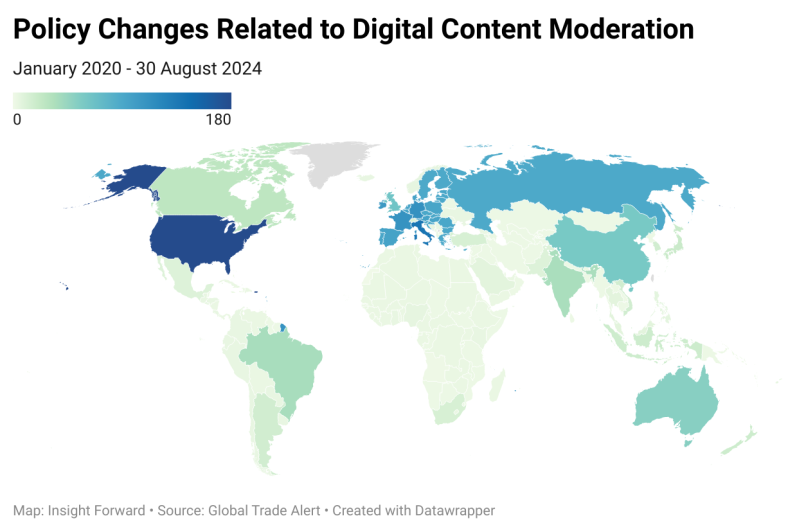
In response, Spanish Prime Minister Pedro Sánchez visited several West African countries to address the factors driving migration and to counter Russia's growing influence in the region. The spike in arrivals is attributed to several factors, including a severe economic downturn across West Africa, escalating Islamist violence, and political instability.
Spain has seen a rise in hate crimes and attacks against migrants, fueled in part by growing anti-immigrant sentiment and far-right activism. Far-right groups and political parties, like Vox, have staged protests against immigration, framing it as a threat to national security and social stability. These protests have sometimes escalated into violent incidents, with migrants and their shelters becoming targets of attacks, vandalism, and harassment. This trend reflects broader patterns of anti-immigrant sentiment across Europe, where far-right movements are gaining traction by exploiting fears around migration and economic insecurity.
Tech Companies Face Rising Regulatory Risks
Elon Musk's ventures, including X (formerly Twitter) and Starlink, are facing escalating regulatory challenges across multiple regions, reflecting global tensions over content moderation, free speech, and disinformation. In Brazil, X is ceasing some operations following a conflict with Supreme Court Justice Alexandre de Moraes over allegations of obstruction of justice and the dissemination of fake news. The dispute arose after the court ordered X to block accounts linked to former President Jair Bolsonaro, which Musk criticized as "censorship." The situation escalated further when the Brazilian Supreme Court froze the bank accounts of Starlink, citing a lack of legal representation and unpaid fines. Musk has responded by providing Starlink services for free in Brazil while continuing to criticize the court.
In Europe, Musk's AI company, xAI, has launched a text-to-image generator that is under scrutiny from European regulators for its potential to spread disinformation. The European Commission is closely monitoring this development under new regulations aimed at limiting harmful online content. At the same time, X is under investigation by the EU for its content moderation policies, which have been criticized as inadequate in tackling misinformation. Musk has publicly clashed with the EU's Internal Market Commissioner over compliance with these rules.

Iran's increased uranium enrichment complicates efforts to revive the 2015 Joint Comprehensive Plan of Action (JCPOA), from which the U.S. withdrew in 2018, as Tehran seeks to use its nuclear advancements to gain concessions like lifting economic sanctions. However, this strategy risks backfiring by prompting the U.S. and Europe to impose stricter sanctions or other punitive measures. The growing stockpile also brings Iran closer to a nuclear breakout capability, raising the likelihood of military confrontation, including pre-emptive strikes by Israel or U.S. action.
Irregular Immigration to Spain
Spain has experienced a significant surge in irregular migration this year, as highlighted by a report from the Spanish Interior Ministry comparing data from January 1 to August 15, 2024, with the same period in 2023. The total number of immigrants arriving by both sea and land routes rose to 31,155 in 2024, a 66.2% increase from the 18,745 recorded in 2023.
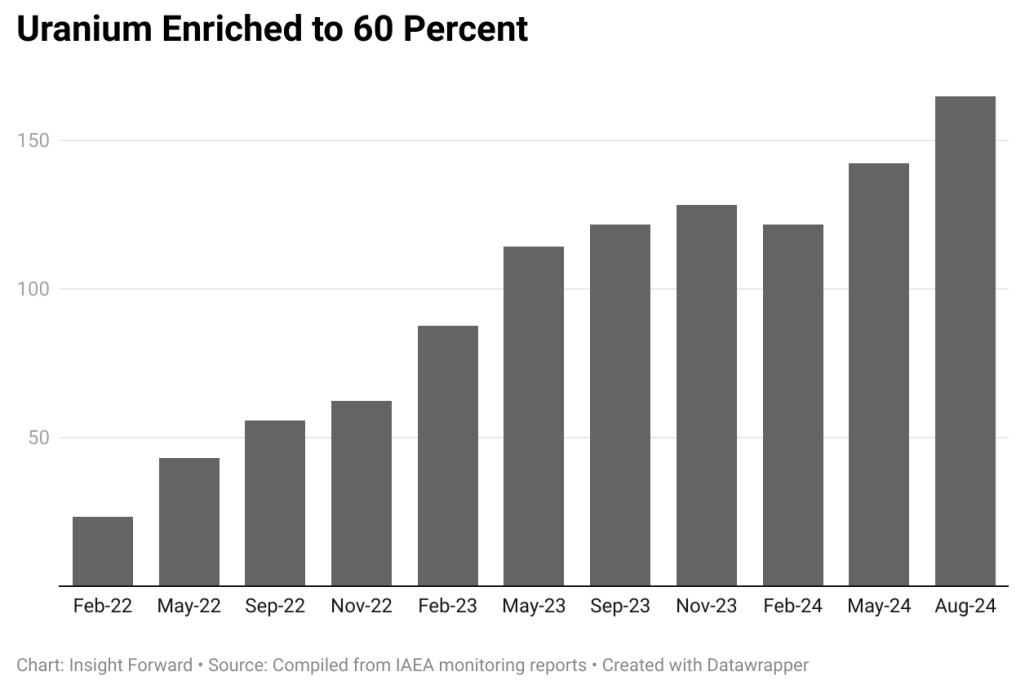
Friday Blend: 30 August 2024
Iranian Uranium
Iran has recently increased its stockpile of uranium that is enriched to levels close to weapons-grade. As of August 2024, Iran possesses 164.7 kilograms of uranium enriched up to 60% purity, an increase of 22.6 kilograms since May 2024. This enrichment level is only a short technical step away from the 90% needed for weapons-grade material. According to the IAEA, if further enriched, Iran's current stockpile is nearly sufficient to produce four nuclear bombs.
When youth unemployment rates are high, young people are more likely to become frustrated, marginalized, and politically active, leading to an increased likelihood of protests and social unrest. Looking ahead to 2024-2025, the global youth unemployment rate is projected to decrease slightly to 12.8%, but regional disparities and economic risks could hinder progress. Youth in high-income regions may benefit from tighter labour markets due to demographic changes, while regions like sub-Saharan Africa face immense pressure from a rapidly growing youth population. The uneven recovery in youth employment is deepening disparities, particularly in developing regions, where unequal access to opportunities exacerbates existing inequalities. Persistently high NEET (Not in Employment, Education, or Training) rates, especially among women, highlight significant labour market exclusion and lost chances for skill development. Additionally, global economic uncertainties such as inflation, conflicts, and shifting conditions pose ongoing risks to youth employment, with fragile and conflict-affected regions being particularly vulnerable.
China's Youth Unemployment
China’s youth unemployment rate surged to 17.1% in July 2024, signalling deepening economic challenges. The rise highlights issues such as intense job competition among graduates and a sluggish property sector. Although the rate dropped from its peak of 21.3% in 2023, the underlying problems remain, with a gap between the increasing number of college graduates and limited growth in service jobs. This mismatch leaves many young people overqualified for available positions, forcing them into low-paying gig work and fuelling widespread disillusionment among the youth struggling to find stable, meaningful careers.

Youth Unemployment
The International Labour Organization recently released its Global Employment Trends for Youth 2024 report. Globally, youth unemployment rates have improved, reaching a 15-year low of 13% in 2023 as labour markets rebounded post-COVID-19. However, recovery has been uneven, with regions like the Arab States, East Asia, and South-East Asia still facing higher unemployment than pre-pandemic levels. Gender disparities remain significant, with young women experiencing slower recovery than men. The global NEET (Not in Employment, Education, or Training) rate remains concerning at 20.4%, with two-thirds of NEET youth being women. While regions like North America and Europe show promising recovery, many low- and middle-income regions continue to struggle with high unemployment and insecure, informal employment.
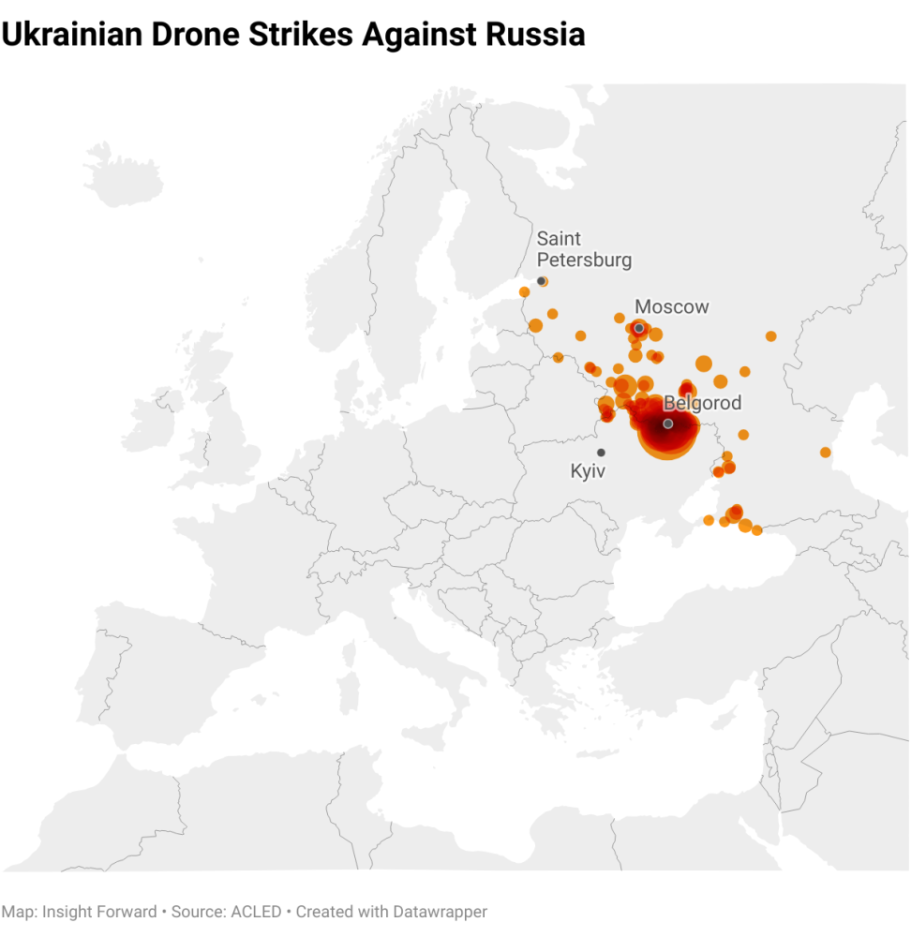
Ukraine's attacks have targeted key infrastructure to disrupt logistics, disrupt Russia's economy, and expose security gaps, forcing Russia to redeploy troops and undermining President Putin's image as a guarantor of Russian security. It is likely that Ukraine will try to sustain its attacks in the coming months.
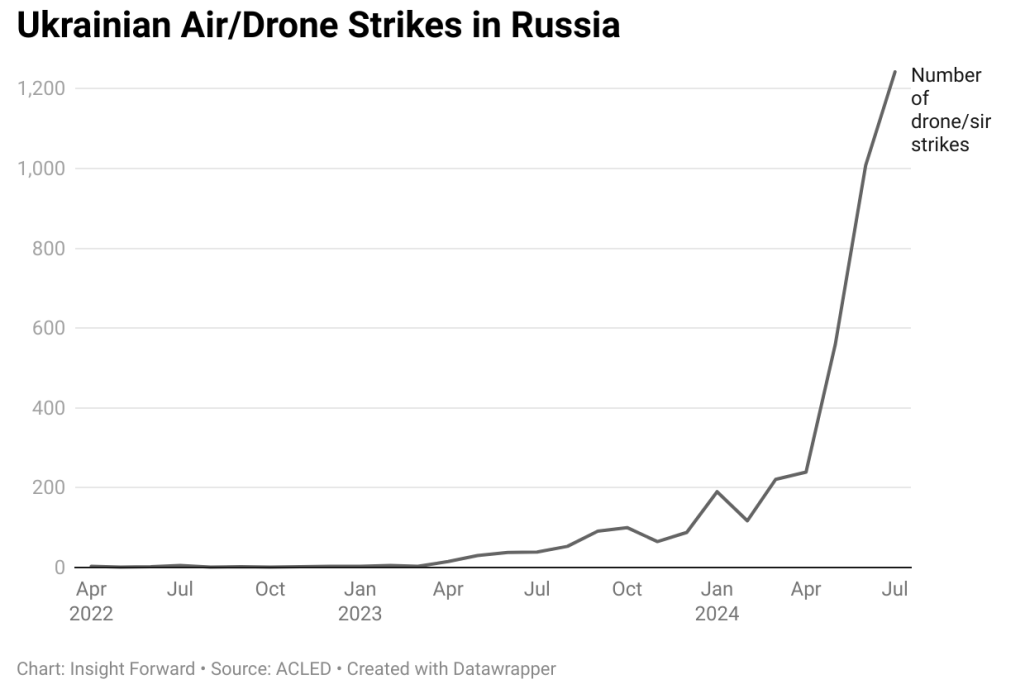
Friday Blend: 23 August 2024
Ukraine Intensifies Drone Attacks in Russia
Ukraine carried out one of its largest drone attacks on Moscow since the war began. Russia said it shot down 45 drones overnight on 21 August with 11 of those targeting Moscow. Ukraine has increased drone attacks against Russia in recent months, also coinciding with its offensive in Russia's Kursk region.
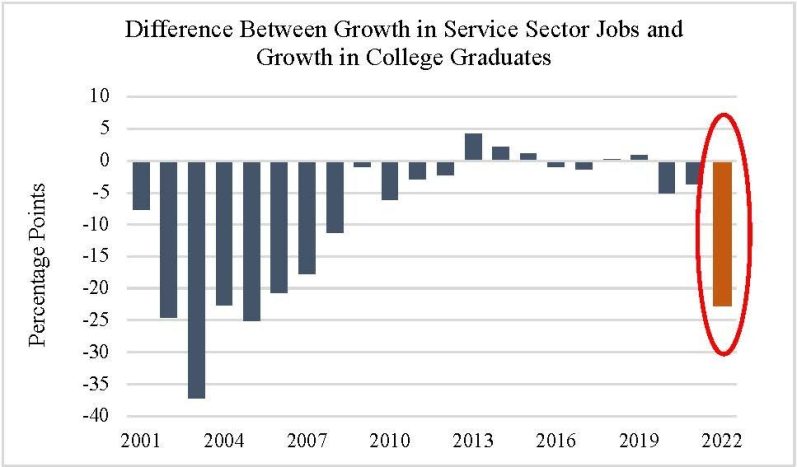
The decline in FDI is coupled with economic challenges, as foreign firms increasingly “de-risk” by shifting supply chains elsewhere. Key drivers of this capital flight include Beijing’s intensified national security stance, exemplified by strict espionage laws that have complicated the business environment. Despite efforts by the Chinese government to attract foreign investment, many multinationals now prioritise diversification due to geopolitical instability and the Chinese Communist Party’s preference for state-backed enterprises. These developments may pose long-term structural challenges for China as businesses hedge against both economic and political uncertainties.

Climate change and related geopolitical developments present considerable challenges for corporations across various sectors. Operational and supply chain disruptions due to extreme weather and resource scarcity are increasingly common. As governments intensify responses to climate challenges, businesses can anticipate tighter regulations and more stringent environmental standards. Consumer preferences and market trends are also shifting, with a growing demand for sustainable products and services. Legal risks and lawsuits related to a company’s environmental impact or inadequate management of climate risks are on the rise, alongside potential reputational damage that could erode consumer loyalty and investor confidence. Moreover, climate-related activism is expected to increase, with more elaborate and disruptive actions targeting companies and their leadership. While most activism remains non-violent, unfulfilled climate pledges and rising global temperatures could lead to the emergence of more radical environmentalist groups, heightening risks for corporations and executives alike.
Negative FDI in China
China experienced a record outflow of $15 billion in foreign investment during the second quarter of 2024, signalling deepening concerns over its slowing economy and rising geopolitical tensions. This trend began with China’s first quarterly deficit in foreign direct investment (FDI) for 25 years in Q3 2023, largely driven by Western corporations reducing exposure amidst worsening relations and increasing risks. If this trend persists, 2024 could mark the first annual net capital outflow since at least 1990.

Sweden has confirmed the first case of the clade 1b strain outside of Africa. The person was infected while travelling in a part of Africa where there was a large outbreak of the disease. Further cases are likely to be identified in countries outside of Africa in the coming weeks. China announced that it would begin screening people and goods entering the country for mpox over the next six months. Other countries are likely to introduce similar measures.
More than 47,000 people died in Europe last year due to heat
In 2023, heatwaves were responsible for over 47,000 deaths across Europe, according to a study by ISGlobal. The report highlights that women and elderly people were particularly vulnerable, with mortality rates 55% higher in women and 768% higher in those over 80 years old compared to younger groups. Adjusting the data for population, Greece, Bulgaria, Italy, and Spain were the countries with the highest mortality rates related to heat. According to the UN's latest State of the Climate report, 2023 was the warmest year on record. The global average near-surface temperature was 1.45 °Celsius above the pre-industrial baseline. It was also the warmest ten-year period on record.

Friday Blend: 16 August 2024
MPox Declared Global Emergency
The World Health Organization (WHO) has declared the ongoing mpox outbreak a Public Health Emergency of International Concern (PHEIC) due to its rapid spread across Africa, particularly in the Democratic Republic of the Congo (DRC) and neighboring countries. The declaration was prompted by the emergence of a new strain, clade 1b, primarily spreading through sexual transmission and impacting previously unaffected regions, including Burundi, Kenya, Rwanda, and Uganda. The number of reported cases has sharply increased, with over 15,600 cases and 537 deaths in 2024 so far, surpassing last year's figures.
Friday Blend: 09 August 2024
Ukrainian Offensive in Russia
On August 6, Ukrainian forces launched a well-coordinated attack into Russia's Kursk Oblast, utilizing a combination of infantry, mechanized units, and artillery support. The operation targeted multiple locations, including border villages and key infrastructure.
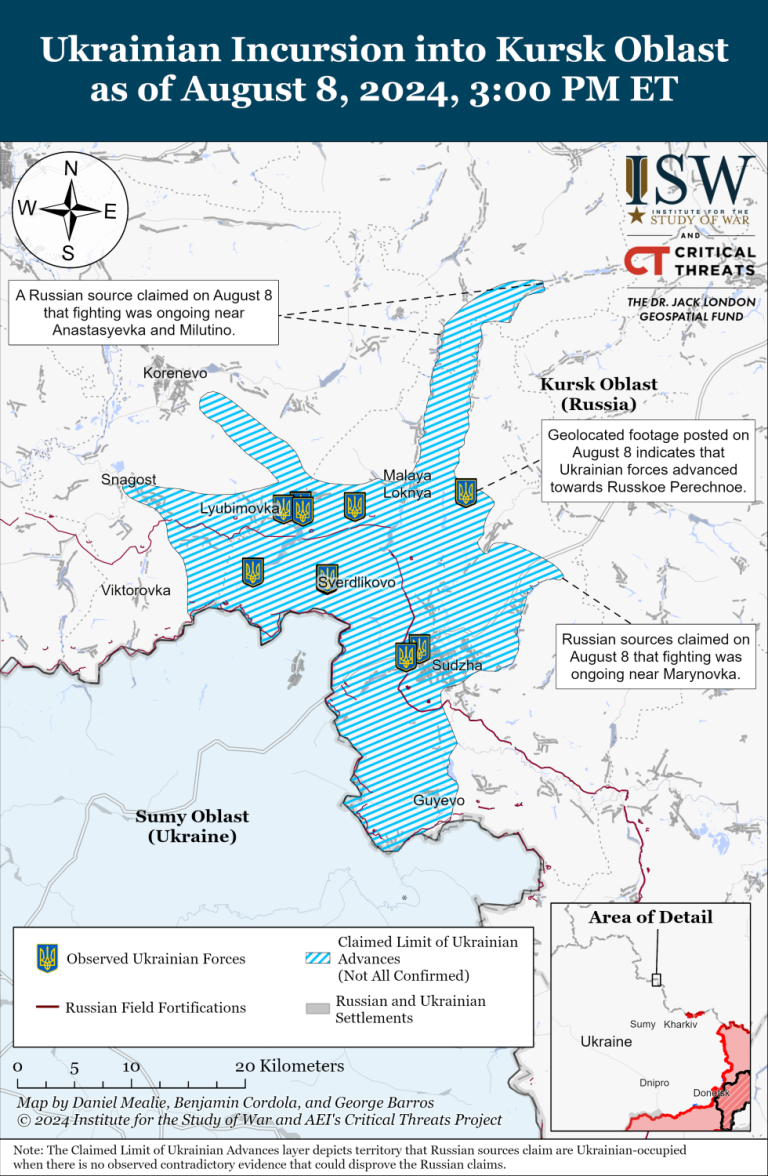
According to the Institute for the Study of War (ISW), Ukrainian forces achieved initial successes, managing to penetrate Russian defenses and establish control over several areas. Reports suggest that Ukrainian troops are operating more than 10km inside Russian territory - the deepest cross-border advance by Kyiv since Moscow launched its full-scale invasion in February 2022. Russia has declared a state of emergency in the region. This attack appears to be part of a broader strategy by Ukraine to exert pressure on Russian forces along the border, compelling them to divert resources from other critical fronts within Ukraine. Most Ukrainian attacks on Russia have involved cross-border artillery shelling and drone strikes that primarily target Russia's oil infrastructure.
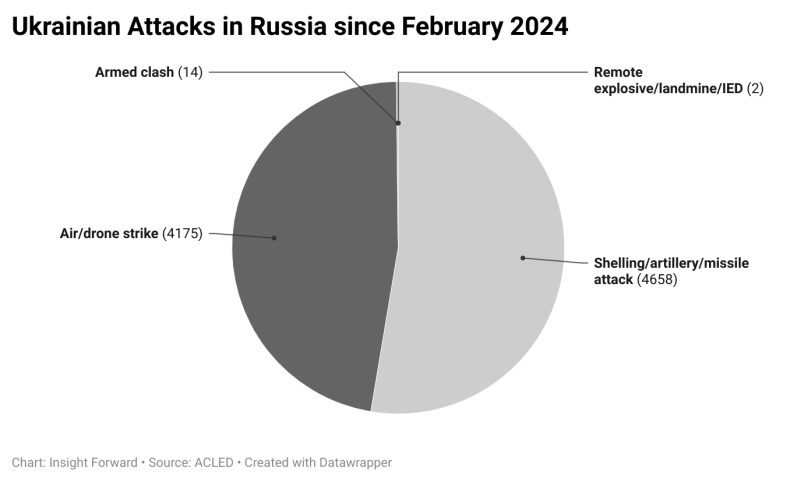
Armed raids have been more limited and have previously involved mainly volunteer battalions. This marks the first time in the conflict that Ukrainian forces have successfully carried out a major offensive on Russian soil, challenging the perception of Russian territorial security. Although Ukraine has not officially claimed responsibility for the attack, it suggests a possible shift in strategy, indicating a willingness to conduct more cross-border operations to pressure Russia both militarily and politically. Ukraine's cross-border attacks aim to demonstrate the potential costs of the war to Russia. This could lead to further escalation, with the potential for more intense and widespread fighting in the coming weeks. protests in other countries.
Planned Attack Against Taylor Swift Concert in Austria Disrupted
A 19-year-old Austrian of North Macedonian descent was arrested after Austrian authorities uncovered an alleged plot to attack Taylor Swift's concerts in Vienna. The suspect, who had pledged allegiance to the Islamic State (IS), was reportedly planning a suicide attack intended to cause mass casualties during the concerts. He had stockpiled chemicals, explosives, and weapons, including machetes, at his residence in preparation for the attack. The plot was thwarted thanks to intelligence received from foreign partners, leading to the cancellation of the concerts as a safety precaution.
In connection with the plot, authorities also arrested two other young men, aged 17 and 15. The 17-year-old suspect was employed at a facility management company scheduled to provide services at the concert venue, indicating a deeper level of involvement in the planning. One of the suspects had allegedly pledged allegiance to ISIL-K, considered one of the most significant external terrorist threats to Europe.
Numerous operations against ISIL-K in countries including Belgium, France, Germany, and others, combined with the detection of planned attacks in Austria and elsewhere, demonstrate the group's renewed efforts and potential to carry out large-scale attacks on European soil.
Global Network
European investigations reveal the global and interconnected nature of ISIL facilitation. For example, in March, two Afghan individuals were arrested in Germany, accused of planning a firearms attack on the Swedish Parliament. That same month, the Spanish Civil Guard arrested an individual in Barcelona who had trained four members of an ISIL-K cell that was dismantled in Sweden. This network had ties to another individual detained in Canada in December 2023 for planning an attack. In June, a multinational operation led by the Spanish Civil Guard resulted in the arrest of nine individuals and the dismantling of one of the largest ISIL media networks in Europe. This network operated servers in multiple countries, including Iceland, Germany, and the United States, and supported outlets disseminating propaganda in over 30 languages.
Outlook
The risk of attacks remains elevated, especially in light of the ongoing Israel-Hamas conflict in Gaza and events like far-right protests in the UK, some of which have targeted mosques. These situations are likely to be exploited to incite further attacks. The recent attack in Moscow and other disrupted plots highlight the continued intent to carry out coordinated mass-casualty attacks, although the primary risk remains from unsophisticated attacks by individuals or groups inspired by ISIL rather than those directly connected to the group.
FAO World Price Index
According to the latest update, the FAO Food Price Index shows a decline in global food prices, driven primarily by decreases in the prices of cereals, dairy, and vegetable oils. The Cereal Price Index dropped due to improved crop conditions in major producing regions and a strong global supply outlook. Meanwhile, dairy prices have decreased as export availabilities improved, particularly in the European Union. The Vegetable Oil Price Index also fell, influenced by abundant supplies and lower biofuel demand. However, the Meat Price Index remained relatively stable, while the Sugar Price Index saw a slight increase due to concerns over production in key regions like Brazil and India.
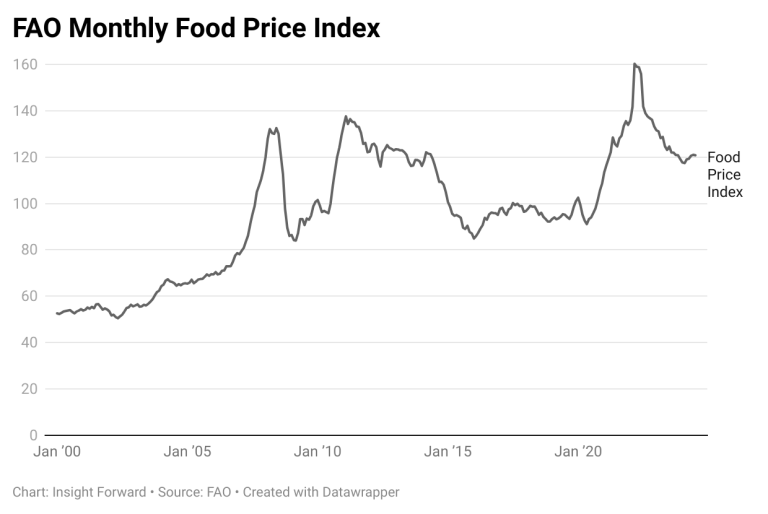
Although prices remain below their 2022 peaks, they are historically high. Risk factors include ongoing geopolitical tensions, particularly in the Black Sea region, which could disrupt supply chains, and weather-related uncertainties that might impact future harvests and contribute to price volatility.
Friday Blend: 02 August 2024
Irregular Migration in Europe
Frontex, the European Border and Coast Guard Agency, released their annual risk analysis in July. According to the report, the scenarios that could cause mass migratory events include, developments in the war in Ukraine, conflict in the middle east, and terrorism and political instability in the Sahel.

The report highlights multiple risks to the EU's borders.
The Eastern borders of the EU face significant risks primarily driven by geopolitical instability and hybrid threats. The ongoing war in Ukraine remains a central issue, with potential for the conflict to expand regionally or involve CBRN (Chemical, Biological, Radiological, and Nuclear) weapons, posing substantial risks. Any shifts in the frontline or changes in political stability in Russia and Belarus could trigger new refugee flows. Moreover, instrumentalized migration from Russia and Belarus, using irregular migrants as a geopolitical tool, continues to be a threat. This includes potential provocations and damage to border infrastructure. Additionally, the cooperation between Russian authorities and organized criminal groups facilitates migration and other criminal activities, further complicating border management.
At the South-Eastern borders, key risks are associated with ongoing conflicts and economic downturns in regions like Afghanistan, Syria, Pakistan, Iran, and Lebanon. Increased migration flows offer opportunities for individuals linked to terrorism to infiltrate Europe, strengthening criminal and terrorist networks.
The Southern borders face risks from large-scale displacements in the Sahel due to terrorism, economic instability, and political unrest. The resurgence of traditional migratory routes through Niger adds to this pressure. The presence and spread of terrorist groups in the Sahel, with their potential to exploit migration routes to infiltrate Europe, are growing concerns. Regional instability, driven by political turbulence, economic hardship, and the civil war in Sudan, significantly drives migration northwards towards Europe. Well-established smuggling networks in Niger and other transit countries facilitate the movement of migrants towards the Central Mediterranean route, exacerbating the migratory pressure.
For the South-Western borders, the key risks stem from political instability, violence, terrorism, and environmental changes in the Sahel, leading to increased migratory pressure on the Western African route. Cross-border crime, particularly drug smuggling, also remains a significant threat.
This year, irregular migration likely to peak August-September as in previous years because the weather in the Mediterranean Sea and other migration routes is generally more favourable in these months. Human smuggling networks, often time their activities based on these seasonal conditions, knowing that autumn presents a strategic window before winter weather makes travel more dangerous.
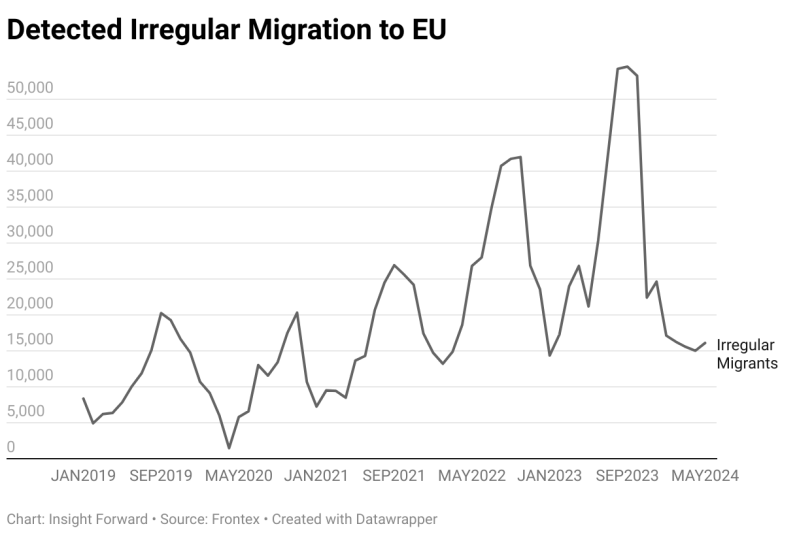
Youth Protests in Africa
Kenya has experienced several weeks of protests and unrest due to opposition to a proposed 2024 finance bill, which was made public on June 18, 2024. Unlike previous protest movements in Kenya, which were often led by opposition leaders and divided along tribal lines, the current protests are leaderless and decentralized. These protests are predominantly driven by Generation Z—those born between the late 1990s and early 2010s. The protesters are mainly young, urban-based, and multi-ethnic individuals who are articulate, educated, and free from political or tribal allegiances. They are using social media to mobilize and coordinate their efforts rapidly. New technologies, such as Artificial Intelligence (AI), have been employed to create images, songs, and videos that amplify the movement’s messages. Additionally, tactics such as hacking government websites and leaking personal information of political leaders to spam them with messages have been used to draw attention to their cause.
The decentralized nature of the protests and their use of social media make them similar to the Occupy Wall Street movement in the U.S. after the 2008 financial crisis or the Arab Spring in the Middle East and North Africa. They also follow a pattern of youth-led movements in Africa, such as those in Ghana, Senegal, and Mozambique in 2023. More recently, in August 2024, tens of thousands participated in demonstrations in Nigeria inspired by the protests in Kenya. Anti-corruption protests in Uganda on July 23 were also influenced by the demonstrations in Kenya. Similar protests in Ghana were banned from taking place. We are currently unlikely to see a similar impact from the protests as we saw from the Arab Spring; however, protesters in Kenya are calling for President Ruto to resign. If he does, it will likely give momentum to protests in other countries.
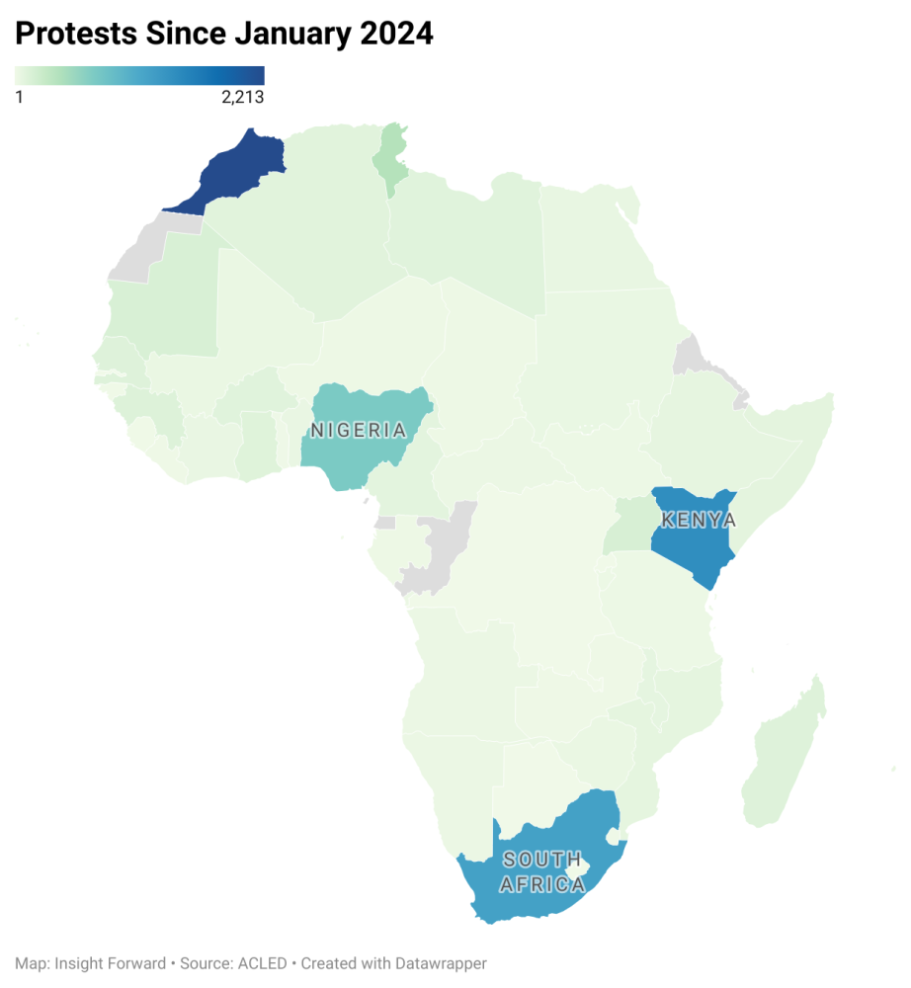
Israel Neutralizes Hamas and Hezbollah Leaders
On July 30, Israel neutralized Hamas leader, Ismail Haniyeh in Iran. Appointed as Hamas' top leader in 2017, Haniyeh operated from Turkey and Qatar, engaging in ceasefire negotiations with Israel and maintaining relations with Iran. Despite his strong rhetoric, many diplomats viewed him as a moderate compared to more hardline members of Hamas. He was vocal against normalization agreements between Arab states and Israel, especially following the October 7 attack by Hamas. His leadership included building ties with Iran and supporting military capabilities while navigating complex regional diplomacy.
A day earlier, Israel conducted an air strike on a southern suburb of Beirut, targeting and reportedly killing Fuad Shukr, a high-ranking Hezbollah commander. This strike was in response to a rocket attack on the Israeli-occupied Golan Heights that killed 12 people, mostly children. Hezbollah denies involvement in the Golan Heights attack and has not confirmed Shukr's death but acknowledges the building he was in was hit. Lebanon's Prime Minister Najib Mikati condemned the strike as "blatant Israeli aggression" and a violation of international law.
Israel has used targeted killings frequently since the beginning of the war. The Israeli Defense Forces have indicated that they do not anticipate an immediate significant response from Hezbollah and are cautious about escalating the conflict. Neither of these targeted killings are likely to expand the conflict in Gaza as Iran sees a wider regional war as harmful to the regime. However, they are highly likely to help Hezbollah engage in retaliatory action, but that will also likely fall short of a full-scale war. Hezbollah does not want the IDF to fully enter Lebanon, and they will only seek a broader war if they believe their existence is at stake.
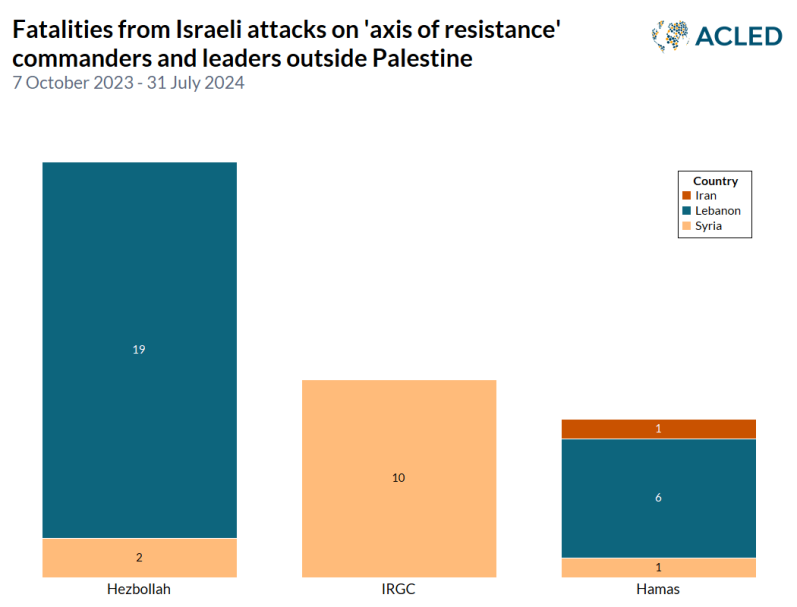
Friday Blend: 19 July 2024
Increasing likelihood that Biden will Drop out of Presidential Race
Polymarket, a prediction market, now gives an 84 percent chance of Joe Biden dropping out of the presidential race. This is a significant increase from the 45 percent chance shortly after Biden's poor performance in the debate with Donald Trump, which initially sparked calls for Biden to step aside. Since then, pressure on Biden has steadily grown, with several prominent Democrats publicly urging him to withdraw. Additionally, Barack Obama and Nancy Pelosi have reportedly expressed private concerns about Biden's ability to defeat Trump in the election.

Bangladesh Shutsdown ICT Networks because of Protests
In Bangladesh, students and opposition party members are protesting against the government’s quota system in government jobs, arguing it undermines merit-based recruitment. Demonstrations have involved significant disruption, such as blocking major highways like Dhaka-Chattogram and Dhaka-Rajshahi. The government has responded forcefully with police using tear gas, rubber bullets, and batons. Additionally, the government has shutdown ICT services during the protests. The Bangladesh Telecommunication Regulatory Commission has been directing telecom operators to shut down 3G and 4G services during rallies, significantly disrupting communication and media coverage.
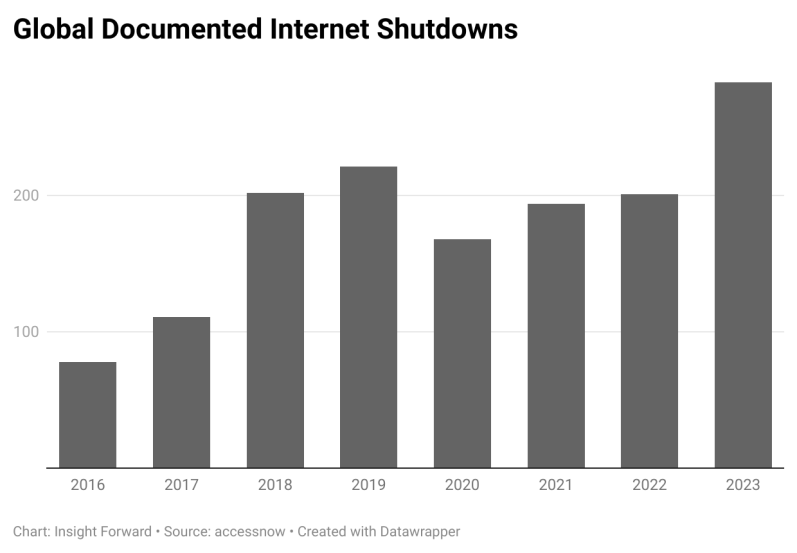
ICT shutdowns are increasingly being used by governments to supress protests and dissent. According to a report by Access Now, 2023 had the highest number of internet shutdowns on record.

Governments are increasingly blocking digital platforms as a means of compelling them to comply with internet regulations. The balkanization of technology is becoming more of a reality, and it is credible that certain companies will withold products from countries that overly regulate economies and impose values that companies oppose. This separation between cultures will have negative impacts as it will likely harm trade and economic integration over the long term, both between regions and even within countries.
IMF World Economic Outlook Update
The July 2024 World Economic Outlook Update by the International Monetary Fund (IMF) projects global economic growth at 3.2% in 2024 and 3.3% in 2025, with a recovery in world trade growth expected to align with global GDP growth. Advanced economies show mixed prospects, with the US growth forecast revised down to 2.6% in 2024 due to slowing consumption, while the Euro Area is set for modest improvement driven by stronger services and exports. Emerging markets, particularly China and India, are expected to see robust growth, though Latin America faces short-term challenges.
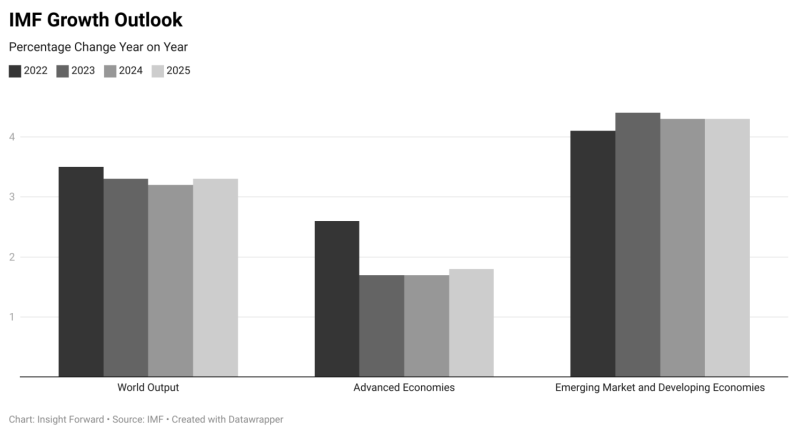
Inflation remains a significant risk, particularly in the services sector, driven by persistent high prices and robust wage growth. Monetary policy easing is expected to be cautious, with higher-for-longer interest rates. However, economic policy uncertainty is heightened by the number of elections in 2024 with ongoing risks of trade tariffs.
Friday Blend: 12 July 2024
Plot to Assassinate CEO of German Arms Manufacturer
The United States and Germany recently thwarted a Russian assassination plot targeting the CEO of a German arms manufacturer, Rheinmetall. The plot was reportedly aimed at disrupting Rheinmetall’s efforts to supply arms to Ukraine. Rheinmetall has been a significant supplier of military equipment, including plans to build a tank factory in Ukraine. This attempted assassination is part of a broader pattern of Russian covert operations aimed at destabilizing European support for Ukraine and disrupting military supplies essential for Ukraine’s defense against the Russian invasion.
Assassinations
The frequency of politically motivated assassinations is on the rise, with incidents linked to grievances against specific political parties or individuals, as well as state-sponsored actions. Countries such as Russia, Iran, and India have been implicated in targeted attacks against dissidents, and opposition figures, and in acts of retaliation.
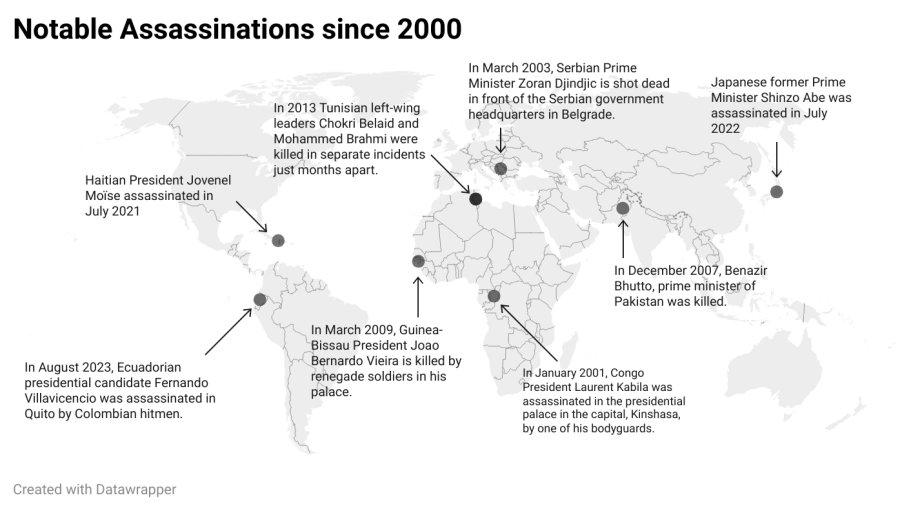
Attacks have occurred in multiple regions. On January 2, 2024, Lee Jae-myung, the leader of the Democratic Party of Korea, was stabbed by an individual reportedly motivated by a corruption scandal involving Lee. In Argentina, there was an assassination attempt against Vice President Cristina Fernández de Kirchner in September 2023. Moreover, the recent assassination in Spain of a Russian pilot who defected because of the war in Ukraine underscores the persistent risks associated with geopolitical conflicts and the willingness of states to engage in extrajudicial killings.
Implications
The rise in politically motivated assassinations presents a significant challenge to global security and corporate risk management. As geopolitics evolve - particularly in the context of upcoming elections, great power competition, and ongoing international conflicts – corporations with exposure or operations in regions with heightened political tensions, must assess potential threats. The highest risk is to executives and other personnel involved in politics or who are outspoken about political and social issues, or corporations that are intricately linked to geopolitically significant sectors.
For more information related to assassinations see our intelligence requirements and reading list.
New Lithium Projects in Argentina and Chile
Chile is planning to launch three or four new lithium projects by 2026 as part of its National Strategy for Lithium. The new projects will involve public-private partnerships, with the state retaining a majority stake in strategic projects. However, political and policy instability might affect the pace and success of these initiatives. Argentina is also rapidly expanding its lithium production and is expected to become one of the top three global lithium producers by 2027. Australia is currently the largest Lithium producer accounting for nearly half of global production. These developments highlight the growing importance of Chile and Argentina in the global lithium market, driven by increasing demand for lithium in battery production and electric vehicles.
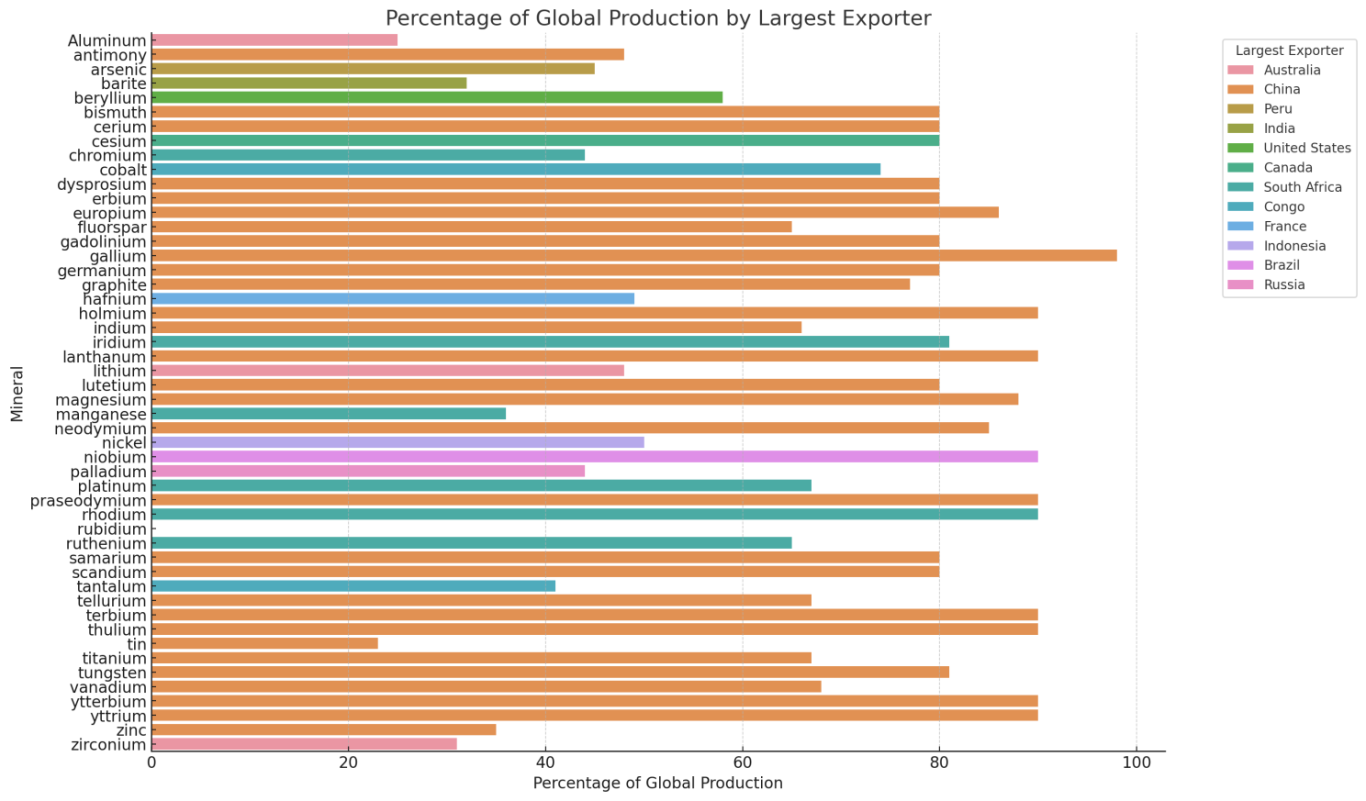
The production of critical minerals is heavily dominated by a few key countries, which hold substantial control over global supply chains. China is a leading player, especially in rare earth elements such as dysprosium, neodymium, and terbium, accounting for over 80% of their global production. This dominance extends to other minerals like graphite, gallium, and germanium. South Africa is another significant contributor, particularly in the production of platinum group metals (PGMs) including platinum, palladium, and rhodium, which are essential for catalytic converters and various industrial applications. Additionally, Australia plays a crucial role in the production of lithium and zirconium, vital for batteries and ceramics respectively. The concentration of supplies underscores the strategic importance and geopolitical implications of critical minerals.
International Day on Combating Sand and Dust Storms
Today, 12 July, is International Day on Combating Sand and Dust Storms (SDS). SDS are meteorological events that involve strong winds lifting large quantities of sand and dust from bare, dry soils into the atmosphere. These storms can travel thousands of kilometers, affecting air quality, visibility, and health in regions far from their origin. The frequency and intensity of SDS are increasing due to climate change, land degradation, and unsustainable land management practices.
Major Sand and Dust Storms in 2023
East Asia: From March to May 2023, East Asia experienced 13 intense storms. A major storm from March 19-24, driven by a cyclone and cold winds, affected Mongolia, China, Korea, and Japan. Air quality and visibility were severely impacted.
Sahel and Gulf of Guinea: Persistent dust outbreaks from Harmattan winds began in autumn 2023, peaking in December, affecting the Maghreb, Sahel, and Gulf of Guinea, and extending over the Atlantic.
Eastern Caribbean and Northern South America: From December 2023 to April 2024, multiple Saharan dust intrusions impacted the region.
Implications
The World Meteorological Organization notes that SDS, are a significant health risk, especially to the young and elderly, and can cause skin and eye irritation, as well as respiratory disorders such as asthma, tracheitis, and pneumonia. In May 2023, seven people were killed and more than 30 injured in a 72-car pile-up in Illinois, US that was caused by poor visibility from a sand storm.
SDS, contribute to the degradation of arable land, exacerbating food and water scarcity. They also have significant economic and geopolitical implications. They cost the oil sector in Kuwait an estimated USD$190 million annually, and a single event in 2009 resulted in damage estimated at USD$229-243 million in Australia. In Iran, officials have frequently blamed other countries for dust storms. For example, in 2017, Iran blamed a storm in Khuzestan that disrupted oil production, on poor land and water management in Iraq, and in 2022, they blamed Saudi Arabia and Türkiye for fuelling storms.
Friday Blend: 05 July 2024
FAO June Food Price Index
In June 2024, the FAO Food Price Index (FFPI) held steady at 120.6 points, with rises in vegetable oil, sugar, and dairy prices balancing out a decline in cereal prices. The index remains 2.1% lower than the previous year and 24.8% below its peak in March 2022. Key changes include a 3% drop in cereal prices, influenced by ongoing harvests and production improvements, while vegetable oil prices rose 3.1% due to increased demand and supply constraints. Dairy prices also saw a modest increase, driven by higher global demand and lower production.
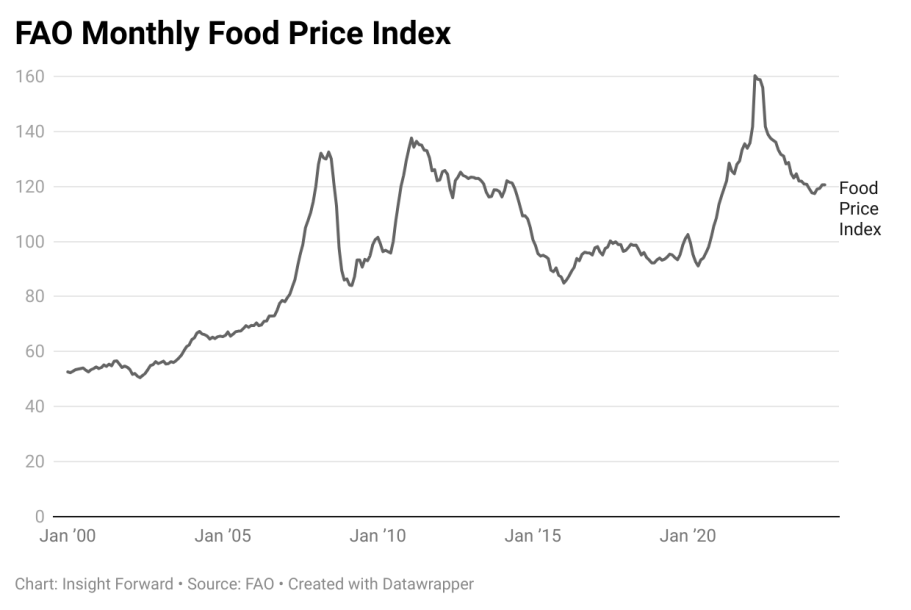
- Cereals: Prices are expected to stabilize due to ongoing harvests and improved production forecasts.
- Vegetable Oils: Prices may continue to rise slightly, driven by high demand and supply constraints.
- Dairy: The upward trend is likely to persist as global demand increases while production remains lower.
- Sugar: Price increases are anticipated due to reduced production in key regions.
- Meat: Prices remain stable with minor fluctuations expected depending on regional demand and supply conditions.
Food prices remain high by historical standards because of ongoing challenges such as climate change, geopolitical tensions, and economic instability. They remain a key indicator of instability and unrest.
What the World Worries About
The Ipsos "What Worries the World" survey for June 2024 shows that inflation remains the top global concern for the 27th consecutive month, affecting countries like Türkiye, Canada, and the US. Though worry over it has decreased slightly to 33%, its lowest level since April 2022. Crime and violence have moved to the second most pressing issue, particularly in Chile, Sweden, and Peru. Economic sentiment varies, with more pessimism in Peru, Japan, and South Korea, while countries like Malaysia and the Netherlands show improvement.
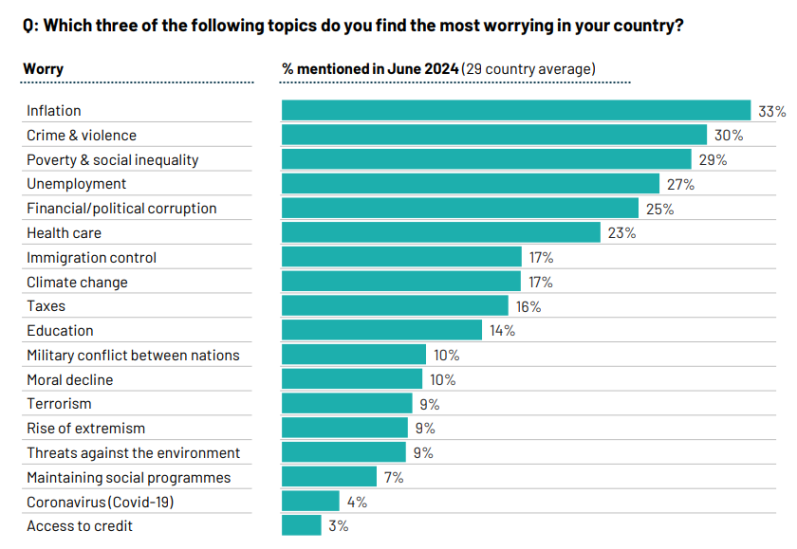
Interestingly, concern over military conflict has shifted, with Poland now being the most worried nation, moving above Israel, which previously held the top spot. Concerns over military conflict in Israel reached record levels last month but in June fell to its lowest level since the start of the current war with Hamas. Economic conditions are now a significant worry in Israel.

The persistent concern over inflation indicates ongoing economic uncertainty even as it falls in many economies. The worries about crime and violence suggest increasing internal security challenges that could impact political stability and public trust in government institutions if it becomes a persistent worry. Poland's heightened concern over military conflict reflects escalating tensions in Eastern Europe because of the war in Ukraine.
Hezbollah Claims to have Launched more than 200 Rockets into Israel
On July 4, 2024, Hezbollah said that it launched over 200 rockets into northern Israel following the killing of a senior commander by an Israeli airstrike in southern Lebanon. The barrage is one of the heaviest since the conflict between Israel and Hamas began in October, with rockets targeting military bases and arms factories.
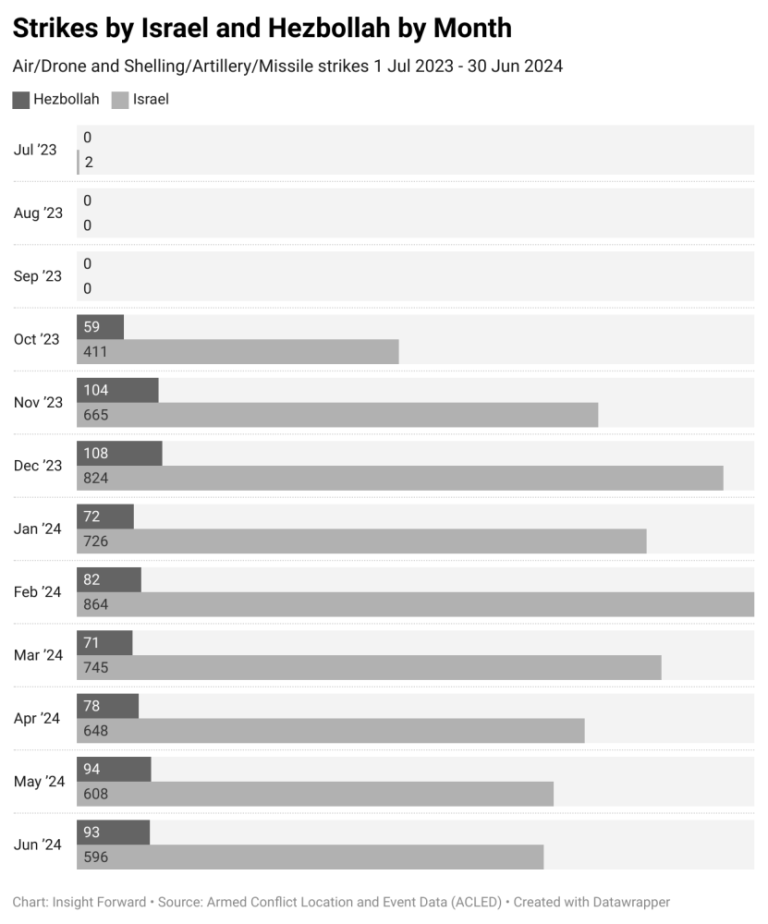
Meanwhile, Israel said it was sending a delegation to restart ceasefire talks after Hamas made revisions to the previous US proposal. If even a short-term deal can be reached, it would also reduce tensions with Hezbollah as there is significant concern that the increasing number of incidents between Israel and Hezbollah will trigger a full-scale war.
Friday Blend: 28 June 2024
Are Coups becoming more frequent?
The recently failed coup attempt in Bolivia marks the third such incident globally this year, following similar attempts in Burkina Faso in January and the Democratic Republic of Congo in May. Coups and forced leadership changes have seen a resurgence, particularly in Africa and Southeast Asia. Since 2020, there have been almost as many coup attempts as in the entire previous decade. However, the frequency of coups remains lower compared to the Cold War era, especially during the 1960s and 70s.
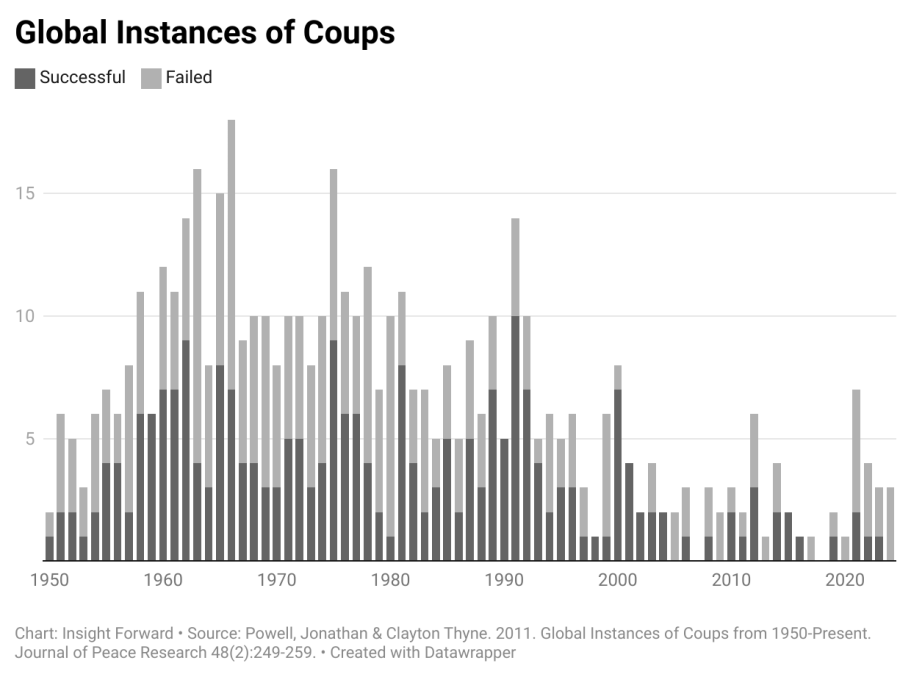
Recent coups have been driven by both internal power struggles and external influences, including anti-colonial sentiments and foreign actors like Russia supporting coup leaders. This trend complicates efforts by Western governments to maintain influence and increases operational disruptions for businesses.
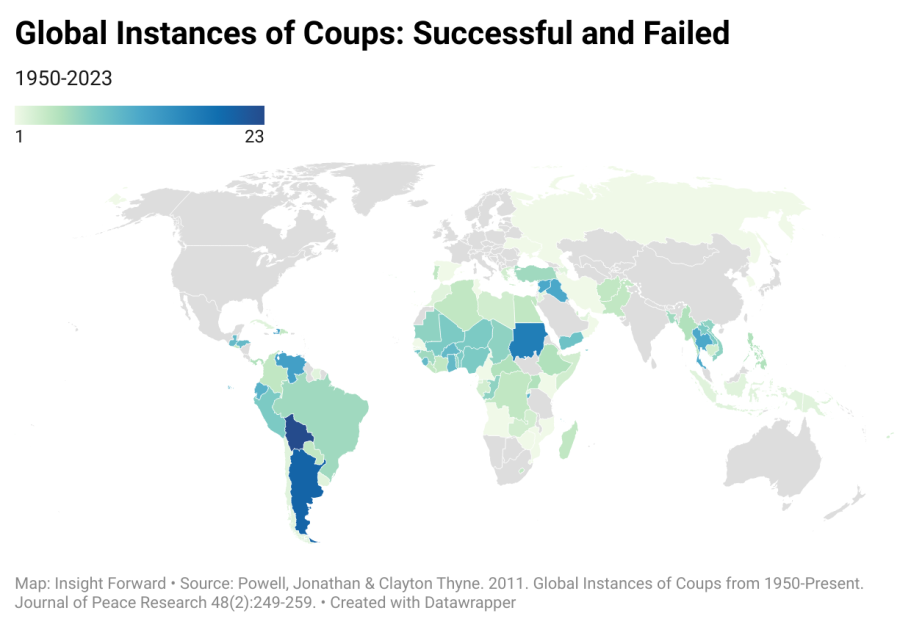
Extreme Weather Threat to Crops
Extreme weather is threatening global crop outputs. Dry conditions in Russia and Ukraine are expected to reduce yields of key crops like sunflower and corn. In the U.S., excessive rains and flooding in the Midwest are damaging corn and soybean crops. This is likely to tighten global supply and increase food prices, but better forecasts in China, India, Australia, Argentina, and Brazil may offset some of the risks.
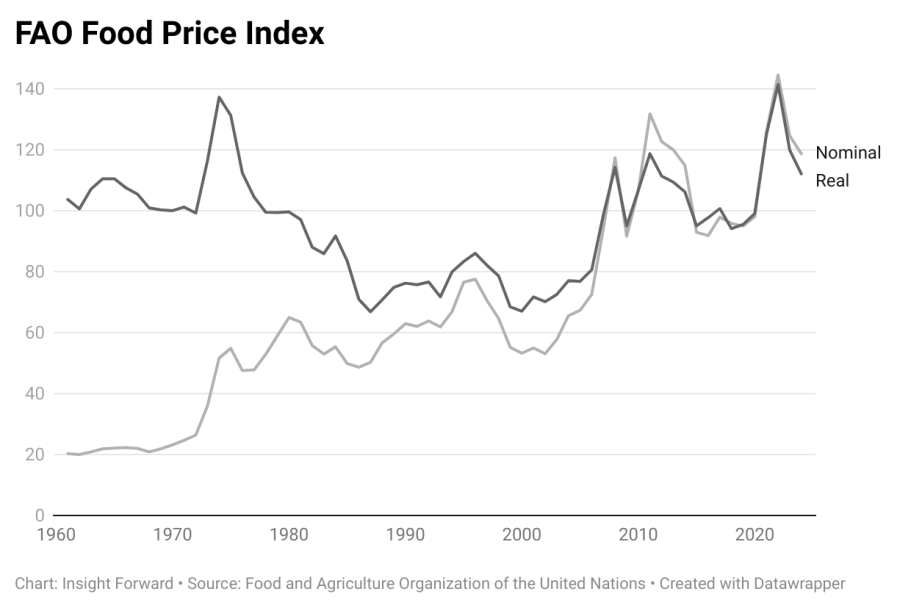
Extreme weather events that destroy crops such as floods, droughts, and large storms have become more common. In 2007-2008 food prices increased because of poor harvests, low stocks, and export restrictions. A period of relatively high price volatility followed, leading to protests and instability. High food prices were one of the factors leading to the Arab Spring. While the current food situation shares some similarities with the 2007-2008 crisis in terms of rising prices and supply concerns, the global food system is more resilient, with better production levels and higher stock reserves. However, ongoing challenges such as climate change, geopolitical tensions, and economic instability continue to pose risks to global food security.
US Considers Transferring Retired Patriot Systems from Israel to Bolster Ukraine's Air Defense
The United States is considering transferring up to eight Patriot air defense systems currently in Israel to Ukraine. This decision aligns with Ukraine's urgent need for enhanced air defense capabilities.
Israel recently decided to retire its Patriot air defense systems after over 30 years of service. The decision is part of a broader strategy to transition to indigenous defense systems like Iron Dome, David’s Sling, and Arrow, which are more suited to the threats to Israel. Although the Patriot systems were used during Iran's recent attack on Israel they have not otherwise played a significant role in the conflict with Hamas.
Although their transfer will not directly impact Israel's operational capacity, Israel has previously been careful about support for Ukraine because of its relationship with Russia and Russia's influence in Syria and growing relationship with Iran.
Meanwhile, the US is working with Israel to resolve a dispute about arms deliveries. Israel claims that they have slowed significantly since the war began.
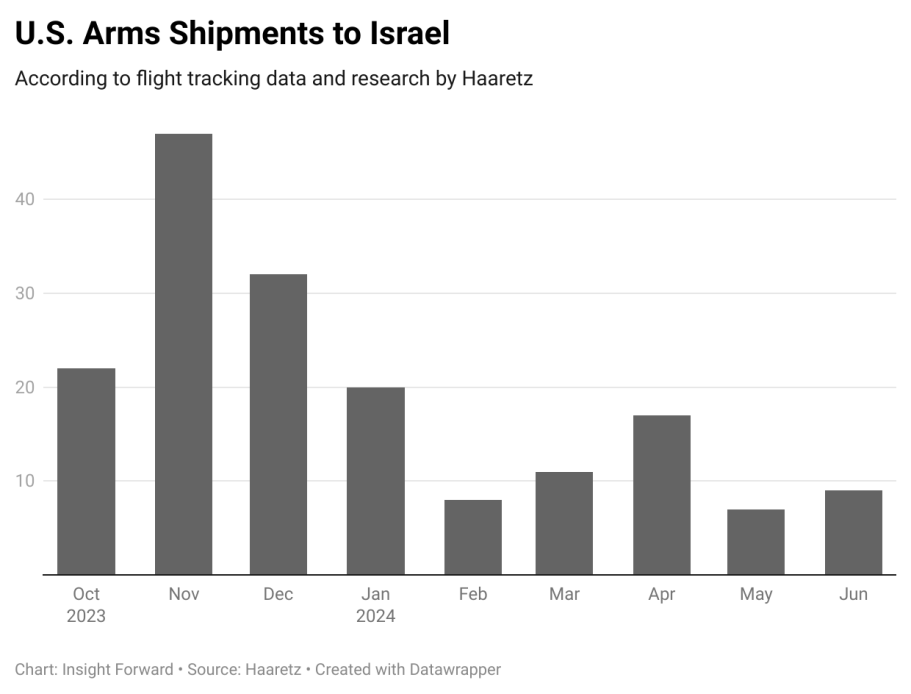
The slowdown is likely for a few reasons. First, when the war started the US was supplying Israel with off-the-shelf weapons, and the procurement process could go relatively quickly. Now, Israel is likely to have more specialized requests, and that takes longer as it is an interagency process. Second, there is likely to be a political element. Biden has been increasingly critical of Israel, halting the supply of some weapons, and this means the procurement process is receiving increased scrutiny. This also has to be placed in the context of Ukraine where the US also sent a lot of off-the-shelf arms. The slow-down is also likely an indicator of problems in the US defense industrial base being able to keep up with the demands of supplying weapons for both conflicts.
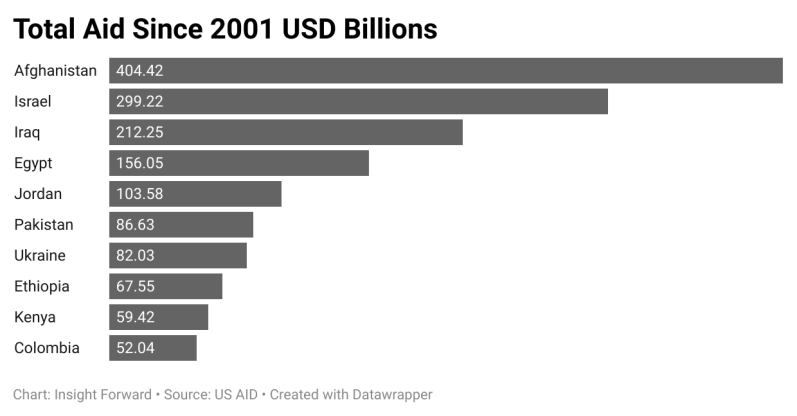
Although Biden has become increasingly frustrated with Israel and US arms supplies appear to have slowed it does not indicate reduced support overall. Israel has historically received significant levels of military aid from the US and this will continue.
Heatwaves are becoming more frequent and intense due to climate change and a recently published study mapping heat wave-related mortality from 1990 to 2019, found that more than 153,000 deaths per warm season were associated with heat waves, with nearly half of those deaths in Asia. Extreme heat is not only a health issue it also exacerbates labor productivity and economic losses and increases food insecurity.

In his visit to North Korea, Putin signed a defense pact and several economic agreements with North Korean leader Kim Jong Un. This pact pledges mutual aid in case of aggression and includes agreements on arms transfers and joint economic projects. Kim Jong Un expressed full and unconditional support for Russia’s war in Ukraine.
Following his visit to North Korea, Putin traveled to Vietnam, where he focused on enhancing bilateral relations through energy and defense agreements. Rosneft and PetroVietnam signed a deal for joint oil exploration in Vietnam's offshore blocks. Additionally, military ties were strengthened with discussions on expanding sales of Russian military equipment, including Kilo-class submarines and Sukhoi fighter jets.
Earlier, in May, Putin met with Chinese President Xi Jinping. They issued a joint statement emphasizing their commitment to a multipolar world and criticized the U.S. and NATO for their military presence in the Indo-Pacific region. Putin's visits highlight Russia's aims to reduce Western influence and enhance its geopolitical standing.
Global Heatwave
Numerous countries around the world are experiencing severe heatwaves, leading to significant health risks and disruptions.
India: India is facing one of its worst heatwaves, with temperatures nearing 50°C in some areas, particularly in the northwest regions including Rajasthan and the Delhi National Capital Region. This extreme heat has resulted in over 16,000 cases of heat stroke and at least 20 deaths.
Pakistan: Severe heatwaves are impacting large parts of Pakistan, exacerbating food insecurity for millions. Up to 26 districts are affected, with rising temperatures compounding the effects of previous droughts and floods
Saudi Arabia: Saudi Arabia is enduring extreme heat, particularly during the Hajj pilgrimage. Temperatures have reached up to 50°C, resulting in more than 1,000 heat-related deaths among pilgrims.
The United States and Southern Europe are also experiencing heatwaves, which are occurring against a backdrop of 12 consecutive months that have ranked as the warmest on record in year-on-year comparisons, according to the European Union's climate change monitoring service.
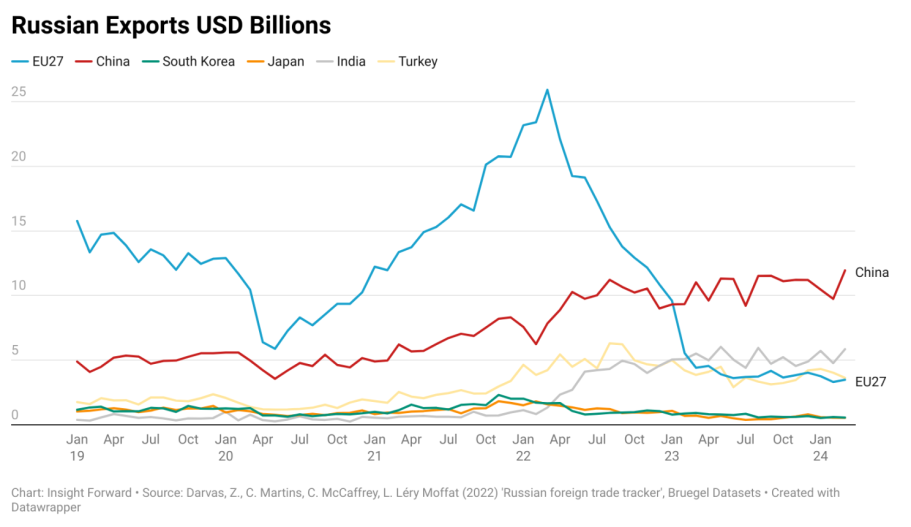
Sanctions imposed on Russia have significantly impacted its economy, leading to a substantial decline in GDP. By early 2023, Russia’s real GDP was estimated to be 7-10% lower than it would have been without the sanctions. This reduction is expected to continue as the country adapts to new trading patterns, primarily with Asian markets. The sanctions have disrupted traditional supply chains, increased production costs, and limited access to high-tech goods, causing a sharp decline in industrial and technological capabilities.
In response to these economic challenges, Russia has increasingly shifted towards a war economy. There has been a significant increase in state control over the economy, with substantial resources diverted towards military production and security-related expenditures. In 2023, Russia’s public budget saw a 50% increase in spending on security, including military activities, while spending on health, education, and infrastructure was reduced. The shift to a war economy obscures Russia's observed economic resilience and its spending is unsustainable over the long-term..
Putin Visits North Korea and Vietnam
Russian President Vladimir Putin's recent visits to North Korea, Vietnam, and China underscore a significant strategic shift towards strengthening alliances in Asia. These visits are part of Russia's broader effort to foster a multipolar world and reduce Western influence through defense and economic partnerships with key Asian nations.

Friday Blend: 21 June 2024
New EU Sanctions Target Russian Gas
The European Union has approved its 14th package of sanctions against Russia. It is expected to be formally adopted at the European Council meeting on June 27-28, 2024, and includes several key elements designed to limit Russia's revenue from energy exports and disrupt its logistics and technological capabilities in the LNG sector. The sanctions impose a ban on the use of EU infrastructure for the transshipment of Russian LNG to third countries.
The sanctions package also includes a ban on the import of helium from Russia. Although helium imports from Russia to the EU are minimal, this move is seen as a preemptive measure to prevent future dependency, as Russia aims to become a major helium supplier by 2025. Additionally, existing restrictions on the export of high-tech goods to Russia, including mining machinery and electronics, will be extended.
Average benchmark policy interest rates are projected to remain about double the 2000-19 average through 2026. Only a modest growth in global trade and investment is anticipated because of ongoing trade policy uncertainties and restrictive measures.
Risks
- Escalating geopolitical tensions could lead to volatile commodity prices and trade disruptions.
- Further trade fragmentation could disrupt trade networks and economic confidence.
- Persistent inflation may delay monetary easing, leading to prolonged high interest rates and lower global activity.
- Natural disasters related to climate change could cause significant economic losses and disrupt food security.
Opportunities
- Faster-than-expected global disinflation could lead to earlier monetary easing, boosting economic activity.
- Strengthening international cooperation and policy reforms can enhance resilience and sustainable growth.
- Investments in technology and innovation could drive productivity gains and economic recovery.
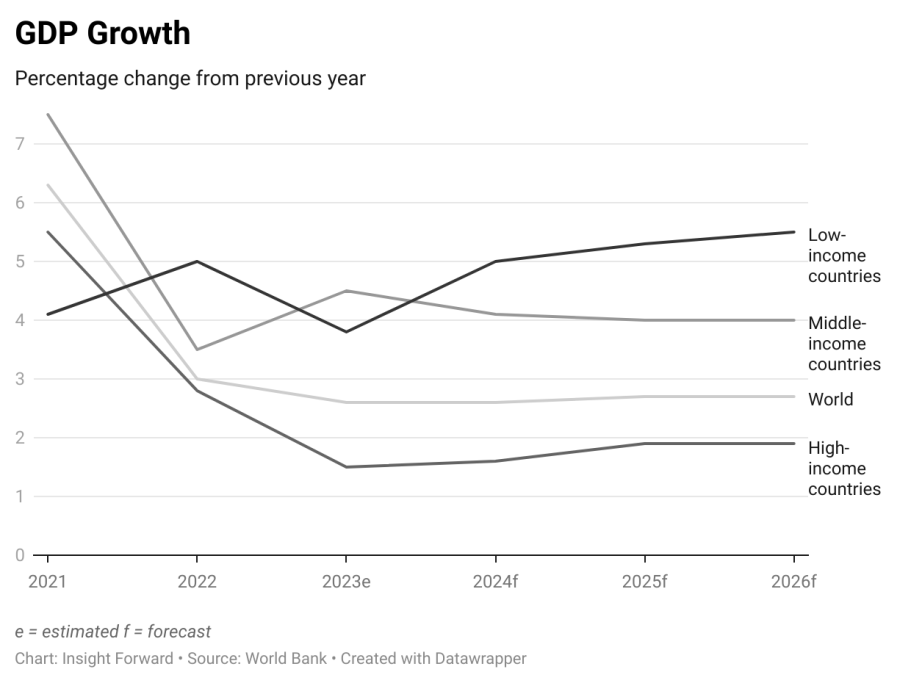
Despite the rise in conflicts, there has been a notable shift in military dynamics. Most countries have become less militarized, transitioning from large, infantry-based armed forces to more sophisticated weaponry. Between 2008 and 2024, 112 countries reduced their armed services personnel rates. However, military expenditure has increased, with 86 countries raising their relative military spending compared to just 50 where it decreased.
The global economic impact of violence reached $19.1 trillion in 2023, equivalent to 13.5% of global GDP. This represents an increase of $158 billion from the previous year, largely driven by a 20% increase in GDP losses from conflict. Military and internal security expenditure account for over 74% of this total economic impact. Exposure to conflict now poses a significant supply chain risk for governments and businesses worldwide.
World Bank Global Economic Outlook
In the World Bank's latest outlook, global growth is projected to stabilize at 2.6% in 2024, slightly increasing to 2.7% in 2025-26. Advanced economies and emerging market and developing economies (EMDEs) are expected to grow at slower rates compared to the pre-pandemic decade. Global inflation is expected to average 3.5% in 2024, with central banks likely maintaining cautious monetary policies due to persistent inflationary pressures.
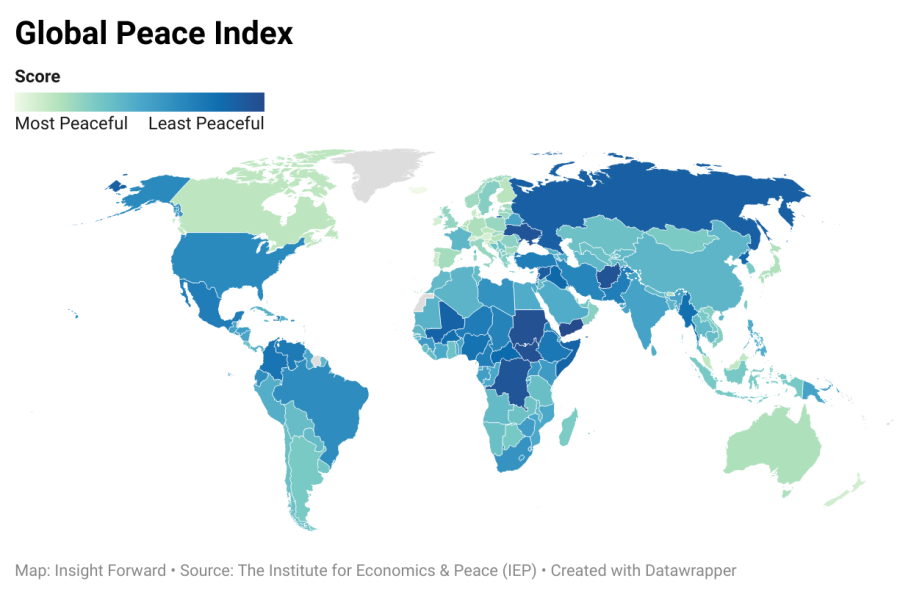
Concerns over Jihadist attacks have increased because of threats from Islamic State to target sporting events and the March attack in Moscow that was claimed by Islamic State-Khorasan Province (IS-K). In April, security was increased around football matches in France and Spain after IS reportedly urged followers to recreate the November 2015 attack on the Stade de France stadium or target events using drones.
The Moscow attack was carried out by Tajik citizens and there have been several arrests of central Asians in Germany linked to IS-K. In March, German law enforcement detained two suspects planning an attack on the Swedish parliament in Stockholm under IS-K's direction. Earlier, in December 2023, Tajik and Uzbek nationals linked to IS-K were arrested in Austria and Germany. They were planning attacks during Christmas or New Year’s Eve in Vienna and Cologne.
IS-K and other groups have the intent to carry out mass casualty attacks against crowded locations. While complex coordinated attacks cannot be ruled out, the primary risk is from self-radicalized individuals using firearms, IEDs, bladed weapons, vehicles, and potentially drones. IS-K is not the only threat. In December 2023, German authorities said they arrested four suspected Hamas members linked to an alleged plot to attack Jewish sites.
Germany has been successful at disrupting plots, but lone-wolf attacks are much harder to stop. On 31 May, anti-Islam activist Michael Stürzenberger was attacked during a demonstration in Mannheim. The assailant, before being shot by police, stabbed Stürzenberger and four other members of the group "Pax Europa" (BPE), seriously injuring them and killing a police officer who attempted to intervene.
Beyond terrorism, multiple European intelligence agencies have warned that Russia is planning sabotage attacks in Europe because of support for Ukraine. In Germany, two men were arrested for allegedly plotting to blow up a NATO site. In Paris, a Ukrainian man was seriously injured while constructing an IED in a hotel; he had fought for Russia in Ukraine. In other countries, public transport and commercial/industrial assets are also suspected of being targeted. There is a credible risk that Russia would seek to target Germany during the event to undermine public safety during the event and create a negative perception of Germany.
There is also concern over unauthorized access to stadiums. Activists protesting climate change and the war in Gaza have staged protests during football matches and targeted other high-profile sporting events. Recently, during the recent Champions League final in London, groups of fans tried to gain access to the stadium without tickets, and three individuals got onto the pitch after a controversial Russian social media influencer promised to pay them a significant sum of money.
Ongoing conflicts, such as the wars in Ukraine and Gaza, recent terrorist attacks, and activism, continue to pose security challenges to Europe.
2024 Global Peace Index
The 2024 Global Peace Index was published on 11 June. It reveals a continuing decline in global peacefulness, with the average level of country peacefulness deteriorating by 0.56%. This marks the fifth consecutive year of decline. The primary drivers of this deterioration were the conflict in Gaza and the ongoing war in Ukraine.
Over the past 17 years, the world has become increasingly unstable, with significant rises in political instability, the number of conflicts, conflict-related deaths, and violent demonstrations. Notably, 92 countries are currently engaged in conflicts beyond their borders, the highest number since the Global Peace Index was established.

Friday Blend: 14 June 2024
Security Threats at the European Football Championships
There is an interesting range of potential threats to the European Football (Soccer) Championship taking place in Germany from 14 June. Amidst the backdrop of the wars in Ukraine and Gaza, there is an elevated risk of terrorism, as well as disinformation and sabotage by Russia. Activists, hooliganism, and publicity stunts pose further disruptive threats.
Food prices remain high by historical standards, with inflation still being a concern in many economies. They are often linked to protests and unrest and the FAO Index is a useful tool for understanding global market trends and assessing potential impacts on food security and social unrest.

This 2024 event is expected to attract over 17,000 participants from 136 countries, which is very similar to last year's numbers. Most Western countries will be absent with Russia pivoting to the BRICS nations, Asia, Africa, and the Middle East. This shift is part of Russia's broader strategy to diversify its economic partnerships in response to geopolitical tensions and sanctions from Western countries. Attendees of the SPIEF include Zimbabwe’s president, Emmerson Mnangagwa, and his Bolivian counterpart, Luis Arce who signed an agreement allowing Russian firms to develop the country’s vast lithium reserves, a mineral essential for the green transition. Other foreign officials attending included the Saudi energy minister, Oman's minister of trade and commerce, and a delegation from the Taliban. Notably the exhibition has stands featuring the Donetsk and Luhansk People's Republic, territories annexed by Russia in the war with Ukraine. Indicating Russia's intent to economically develop these regions.
By strengthening ties with emerging markets and developing countries Russia is trying to alter global trade patterns, investment flows, and diplomatic relations.
Nuclear Weapons and Ukraine
Russian President Vladimir Putin and senior Russian officials have repeatedly threatened to use nuclear weapons in the war against Ukraine. While the likelihood of this remains very low, these threats aim to deter Western support for Ukraine and they increase when Russia faces battlefield setbacks.
Earlier this year, leaked Russian documents reportedly show Moscow planned for the use of tactical nuclear weapons in the initial stages of a conflict with a world power, which the Financial Times said indicated a threshold for their use “that is lower than Russia has ever publicly admitted.” The documents, dated between 2008 and 2014, outline specific conditions under which Russia might deploy nuclear weapons. These include the destruction of key military assets such as 20% of its strategic ballistic missile submarines, 30% of its nuclear-powered attack submarines, three airfields, or three or more cruisers, or to defend the nation’s sovereignty. This lower threshold highlights the strategic importance Russia places on its nuclear capabilities as a deterrent and a means of countering conventional military threats.
Last week, NATO members lifted restrictions on Ukraine using NATO-supplied weapons to target Russia directly. Previously, Putin had stated that using long-range missiles supplied by NATO to strike Russia could prompt a nuclear response and Russia is also threatening to supply long-range missiles to arm "enemies of the US". Ukraine is also regularly targeting Russian oil infrastructure with drone attacks. However, the damage caused so far is unlikely to prompt Russia to deploy nuclear weapons.
Potential triggers for nuclear weapon use in Ukraine include:
- Major damage or casualties within Russia from Ukraine's use of NATO-supplied weapons
- Russia fears an outright military defeat
- The conflict escalates into a broader Russia-NATO confrontation
- Putin's regime faces an existential threat of collapse
- Significant casualties or damage to civilian infrastructure from Ukrainian attacks on Russian infrastructure
The use of nuclear weapons in Ukraine is a very low-likelihood but high-impact scenario and its impacts should be assessed.
Food Prices Increase for Third Consecutive Month
The United Nations World Food Price Index (FFPI) rose for a third consecutive month in May, because of higher cereals and dairy product prices. The FAO warned that weather conditions in the Black Sea region will likely result in a downgrade in world wheat production, this will cause further price increases which are not yet reflected in the data. Although prices are increasing the FFPI remained down 3.4 percent from its corresponding value one year ago and 24.9 percent below the peak of 160.2 points reached in March 2022.

Friday Blend: 07 June 2024
St. Petersburg International Economic Forum
The 2024 St. Petersburg International Economic Forum (SPIEF) is currently taking place from June 5-8. The theme for this year's forum is "The Formation of New Areas of Growth as the Cornerstone of a Multipolar World," as is customary, President Vladimir Putin will deliver the keynote address. The theme sets out Russia's geopolitical goal of establishing new centres of influence and building a more diversified and resilient economic network that can compete with the US and EU.
Despite efforts by France and the UK to propose a resolution on Iran at the International Atomic Energy Agency, the US is reportedly blocking it. This development fuels political debates in the US, particularly regarding the administration's stance on Iran, amid ongoing tensions in the region. Additionally, there are speculations about potential shifts in Iran's leadership and its future relations with the West.
The Biden administration has taken a much softer approach on Iran, opposing the UK and France from censuring Iran over their nuclear advances after having release $10 billion in frozen funds. Iran being on the precipice of having nuclear weapons will destabilize the Middle East further. Academic research indicates that when competing powers both have nuclear weapons low-level conflict increases.
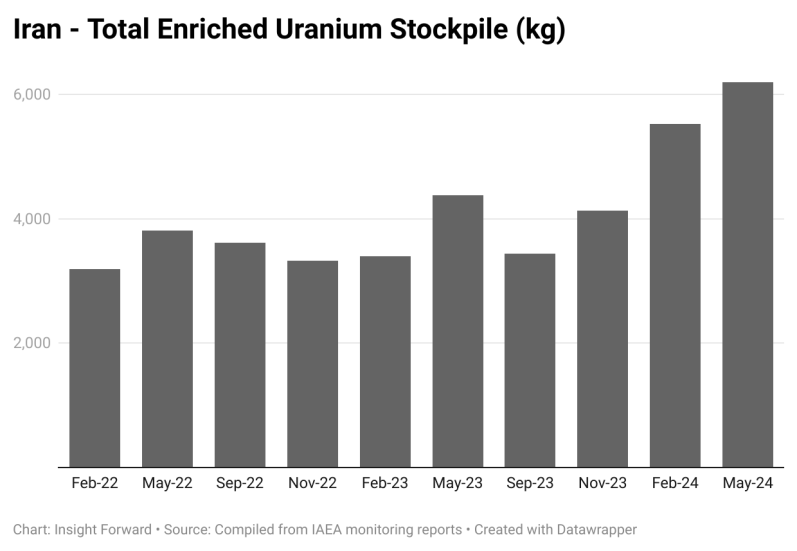
The restriction on using Western weapons has been a critical factor in Russia's recent offensive near Kharkiv. This limitation has enabled Russia to amass troops near the Ukrainian border with minimal risk of preemptive strikes by Ukraine.
Most countries still insist that Ukraine target only Russian military assets, or use them within the rules of international law, emphasizing a measured approach to prevent further escalation. Ukraine has intensified its attacks within Russia, particularly targeting oil and gas infrastructure. This strategy aims to disrupt Russia's economic and logistical capabilities but raises concerns about a broader conflict.
Russia will see the use of Western weapons against its territory as an escalation. In response to the latest U.S. aid package and potential Ukrainian escalations, Russia announced plans to intensify attacks on Western weapon storage sites within Ukraine. Additionally, Russia has commenced tactical nuclear drills near the Ukraine border, because of perceived threats from increased Western involvement in the war.
Russia has several options to retaliate.
- Attacks against Ukraine's civilian infrastructure
- Increased targeting of NATO weapons storage and logistics in Ukraine
- State-sponsored cyberattacks against US infrastructure and multinational companies. Particularly those in the defence or other sectors supporting Ukraine directly
- Sabotage operations in Europe targeting the defence industry or businesses linked to Ukraine
- Targeting US government, military, or commercial interests in Africa or the Middle East
Iranian Uranium
A confidential UN report indicates that Iran has accumulated enough weapons-grade uranium for three nuclear bombs. According to the report Iran’s stockpile of enriched uranium is more than 6,201.3 kilograms, a 675.8 kilogram increase since the International Atomic Energy Agency’s last report in February.
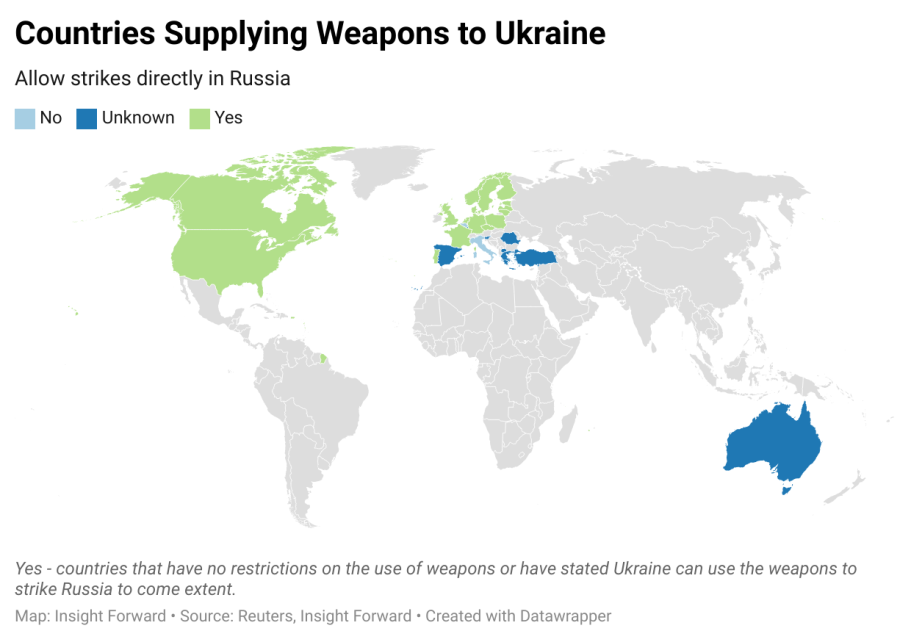
Many countries retain the death penalty for ordinary crimes and this is important for businesses because stakeholders increasingly expect companies to uphold human rights standards. There can be reputational concerns for operating in countries that use the death penalty for crimes that should not result in execution under international law.
- Tech Companies: Technology firms have faced backlash for supplying surveillance equipment to countries with poor human rights records, including those that use the death penalty.
- Fashion Brands: Fashion brands sourcing materials from countries with human rights abuses face boycotts and protests, impacting their brand image and sales.
- Financial Institutions: Banks and investment firms must consider human rights in their funding decisions, avoiding projects that might indirectly support the death penalty or other human rights violations.
Can Ukraine Use Western Weapons to Target Russia?
The United States will allow Ukraine to use American-supplied weapons to target Russian territory. Strikes will be limited to near the Kharkiv region to slow the Russian offensive there. At least 15 countries now either permit Ukraine to use their supplied weapons without conditions or specifically allow strikes within Russia. This shift reflects changes in policies from the war's inception when Ukraine was restricted to using NATO and other supplied weapons solely on Ukrainian territory, including Russian-occupied areas.
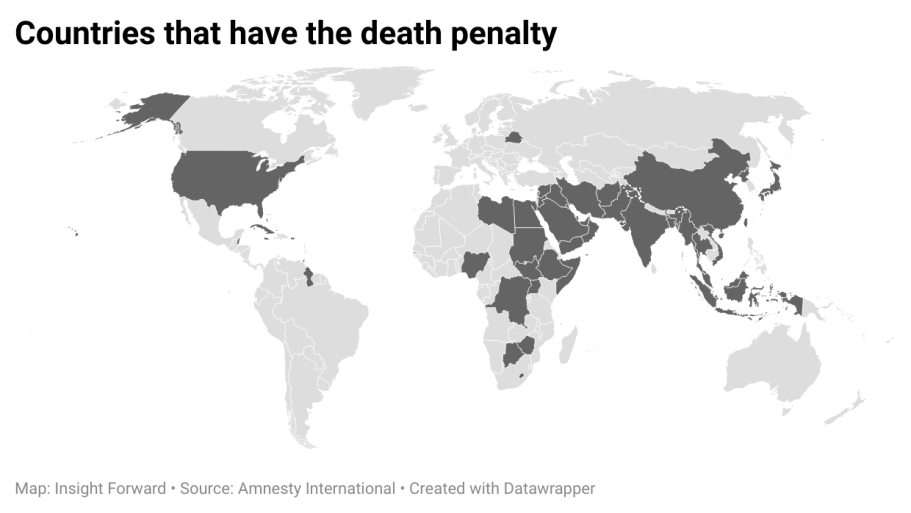
The five countries with the highest number of executions in 2023 were China, Iran, Saudi Arabia, Somalia, and the United States. China is believed to execute thousands annually, though exact figures are state secrets. Executions in Iran were largely responsible for the spike where at least 545 were unlawfully carried out for acts that should not result in the death penalty under international law, including drug-related crimes, robbery, and espionage.
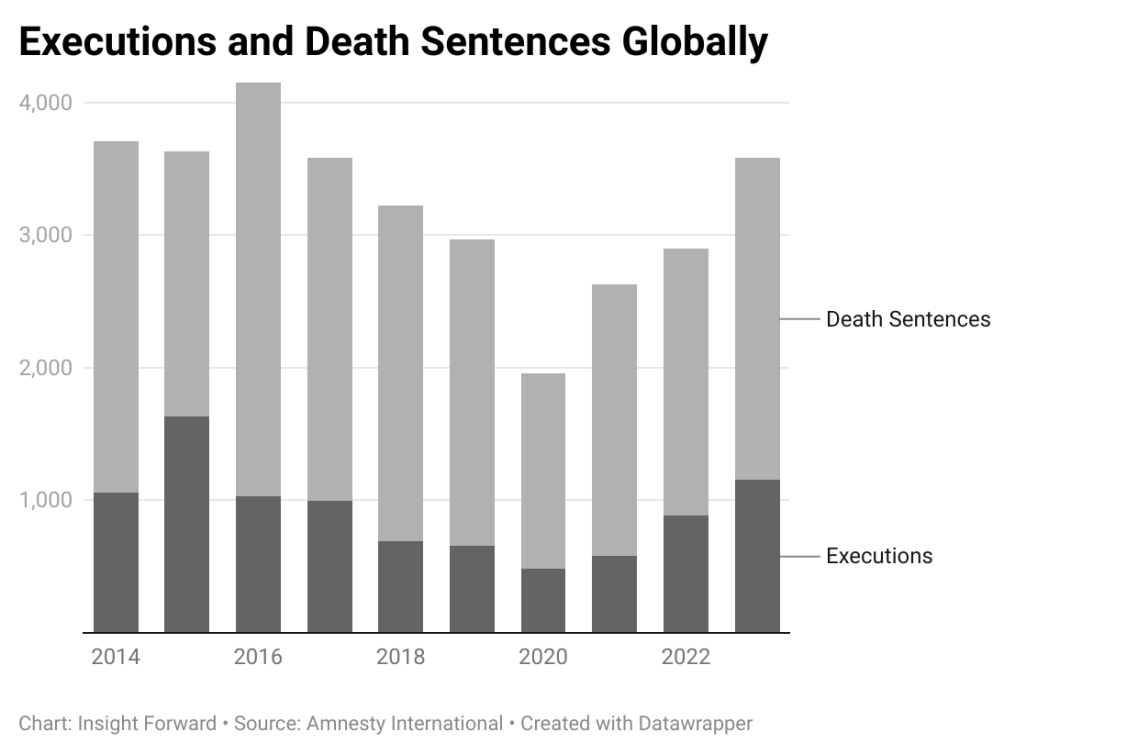
Friday Blend: 31 May 2024
Global Executions
According to Amnesty International's annual report on the global use of the death penalty, the number of executions increased significantly last year. In 2023, Amnesty International recorded 1,153 executions, a 31% increase from the 883 known executions in 2022. This is the highest figure since 2015 and the first time since 2016 that the known total exceeded 1,000.
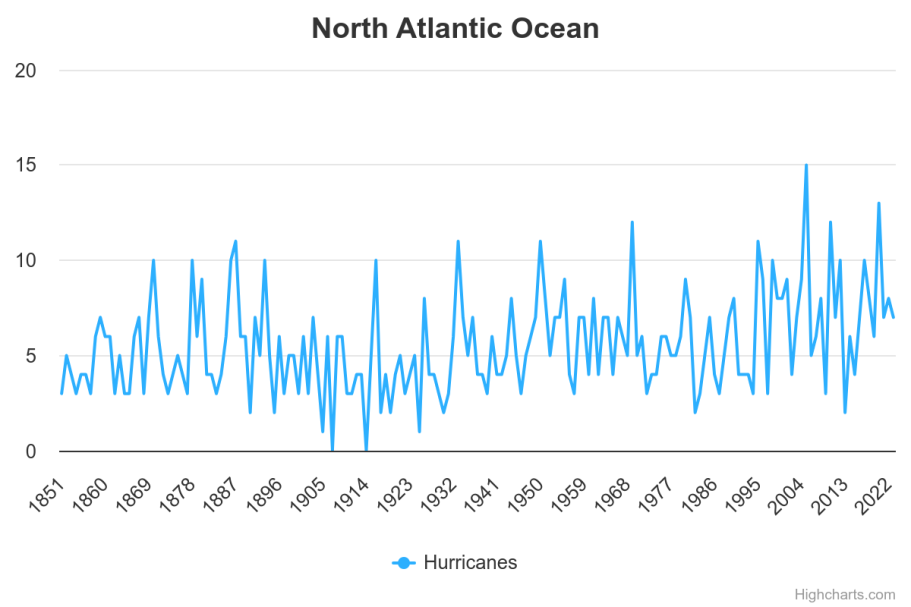
Hurricane season begins on 1 June and NOAA forecasts 17 to 25 named storms, 8 to 13 hurricanes, and 4 to 7 major hurricanes. Factors contributing to this outlook include near-record warm Atlantic ocean temperatures, La Niña conditions, reduced trade winds, and less wind shear.
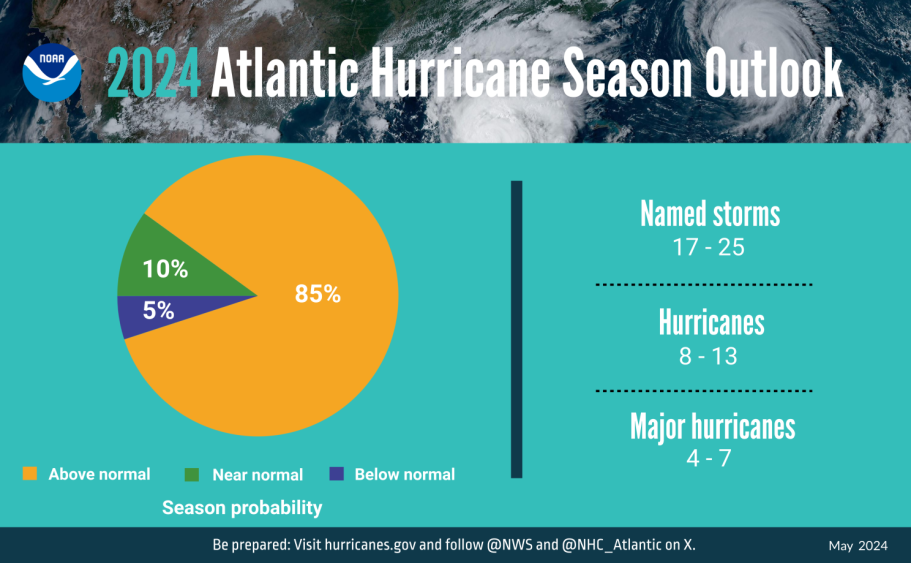
Nuclear Trafficking
Notable cases involving attempts to sell nuclear material include that of Japanese Yakuza boss, Takeshi Ebisawa, who was arrested in 2020 for attempting to sell uranium and weapons-grade plutonium to an undercover DEA agent, and Oleg Khinsagov, a Russian citizen, was arrested in Georgia in 2006 while attempting to sell 100 grams of highly enriched uranium (HEU).
Dirty Bombs
Terrorist groups including Al-Qaeda and Islamic State have reportedly attempted to acquire radioactive materials and far-right extremists have also tried to build dirty bombs. In 2008, James Cummings, a white supremacist, obtained four 1-gallon containers of a mix of depleted uranium and thorium-232. He planned to use these materials to assemble a dirty bomb.
Extremist groups will likely continue to aspire to building dirty bombs and evidence from incidents tracked by the IAEA demonstrates the ongoing challenges in securing radioactive materials and preventing their misuse.
Hurricane Season
The National Oceanic and Atmospheric Administration (NOAA) released its hurricane forecast on 23 May, saying there is an 85 percent chance of an above-normal 2024 Atlantic hurricane season.

Friday Blend: 24 May 2024
Corporate Reputation
The Axios Harris Corporate Reputation poll for 2024 was released this week. Nvidia scored the highest out of the 100 companies listed. The companies that have the best reputation (top 5):
- Nvidia
- 3M
- Fidelity Investments
- Sony
- Adidas
The companies that have the worst reputation are Spirit Airlines, X (Twitter), and The Trump Organization. Notably, the reputation of Anheuser-Busch dropped 23 places from last year. In 2023, the company faced a boycott of its Budweiser brand after it partnered with trans influencer Dylan Mulvaney for March Madness. As a result, from April-June 2023, Anheuser-Busch saw revenue drop 10.5% in the United States.
Corporate Reputation Warfare
Companies are increasingly impacted by reputational issues and must contend with dis- and misinformation about their business or executives or the fallout of taking or perceiving to take political stances on controversial or sensitive issues.
- The same kinds of information operations used in domestic politics, foreign policy, and geopolitics are now being used to directly target corporations.
- They are carried out by nation-states, competitors, and malicious ideologically opposed groups and individuals.
- Advances in technology are making it easier and cheaper to create highly realistic and effective mis- and disinformation campaigns.
- Corporations are vulnerable because of stakeholder expectations of corporate action on ESG issues, political polarization, and increased scrutiny of corporate and executive behavior.
- Disinformation campaigns can directly damage a corporation’s reputation, which has negative impacts on market share, stock price, and the ability to attract and retain employees.
- Corporate reputation warfare will be an important risk over the long term.
Reputation and Violence
Conspiracies and political issues for corporations can also lead to violence or the threat of violence. In 2021, the FBI apprehended would-be terrorist Seth Aaron Pendley when he attempted to buy explosives. Pendley wanted to bomb an Amazon data center in the hopes of disrupting the internet and bringing down the “the oligarchy.” His motivations were rooted in perceptions of the technology company’s influence on socio-political issues.
Threats of violence can also come from a corporation’s public political stances (or perceptions about their political stances). Following the controversy Anheuser-Busch had with trans influencer Mulvaney, the company received threats that forced them to close some facilities for the safety of workers. One facility in Los Angeles even received a bomb threat.
Implications
The risks are highest for businesses that take very public stances on political or social issues or that have outspoken executives. However, other businesses should be aware of the increased scrutiny of corporate behavior in general. As companies adopt more policies related to ESG issues, they face closer examination of their conduct and malicious actors are increasingly likely to exploit company policies against them.
IAEA Report on Trafficking of Nuclear and Other Radioactive Material
On 20 May, the International Atomic Energy Agency (IAEA) released its latest report on illegal or unauthorized activities involving nuclear and other radioactive material. A total of 4243 incidents have been reported since 1993. In 2023, there were 168 incidents reported by 31 countries, in line with historical averages. Most incidents are related to loss and theft, but six were reported to likely be related to trafficking or malicious use.
Implications
Discrimination and insufficient legal protection not only endanger the security and safety of employees and business travelers but also pose significant reputational risks for companies operating in regions where discrimination is not adequately addressed.
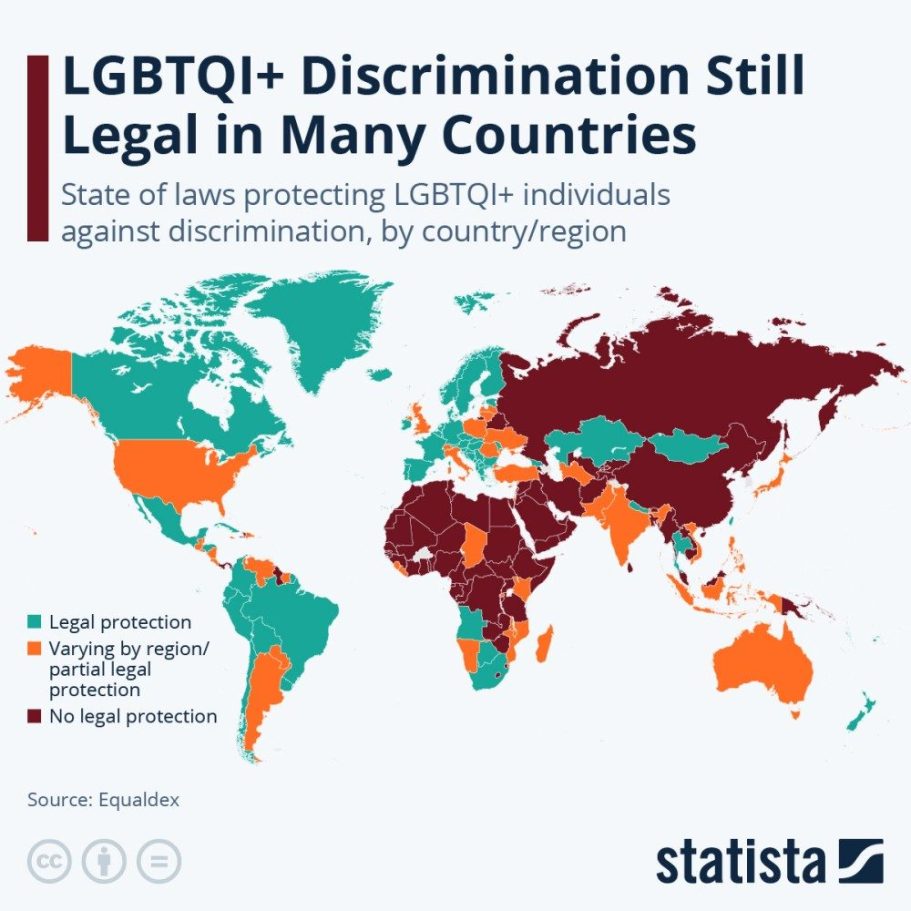
Energy Dependence
Moldova has diversified its gas supply away from Russia but heavily relies on Transnistria for its electricity supply. Russia's Gazprom supplies natural gas to a Russian-owned power plant in Transnistria. The electricity is then sold to Moldova, making up about 70 percent of its supply. Russia could potentially interfere with this electricity supply, causing an energy crisis in Moldova.
Internal Political Instability
Russia has been supporting pro-Russian political parties and movements within Moldova. Increased backing for these groups could lead to protests and efforts to derail the referendum process. The autonomous region of Gagauzia, which opposes EU integration and favors closer ties with Russia, could become a significant concern, with potential moves towards secession if Moldova votes to join the EU.
Implications
The recent intelligence warnings about Russian sabotage activity in Europe indicate that activity will increase in Moldova ahead of the referendum. Increased political polarization, potential social unrest, and cyber activity could disrupt business operations. Additionally, Moldova's heavy reliance on energy supplies from Transnistria and Russia presents a risk to energy security.
International Day Against Homophobia, Biphobia and Transphobia
The 17th of May is International Day Against Homophobia, Biphobia and Transphobia, coinciding with the date in 1990 when the World Health Organization stopped classifying homosexuality as a disease.
Many countries still have no legal protection against discrimination because of the victim's sexual orientation or gender identity. In some of these countries, such as Saudi Arabia, Iran, and Uganda, engaging in homosexual activities can result in the death penalty.
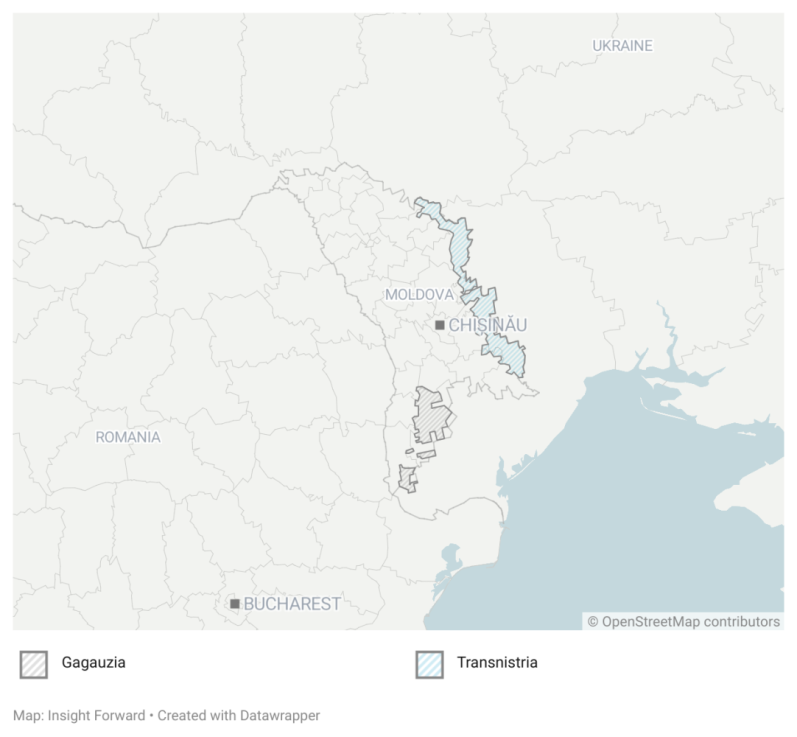
Friday Blend: 17 May 2024
Russian Disruption in Europe
"We are increasingly concerned about growing links between the Russian intelligence services and proxy groups to conduct cyber-attacks – as well as suspected physical surveillance and sabotage operations."
- Director GCHQ's keynote speech at CYBERUK 2024
Recent intelligence reports reveal an uptick in Russian sabotage operations across Europe. These activities aim to destabilize and disrupt European nations, particularly those supporting Ukraine. European intelligence agencies have identified a range of tactics, including physical sabotage, cyber attacks, and the recruitment of local agents, to undermine European security and infrastructure.
Critical Infrastructure
There have been multiple incidents involving tampering with undersea data cables, vital for communications and internet services. Swedish security police are also investigating possible sabotage behind repeated railway derailments in the far north of the country.
Infrastructure and Logistics Linked to Ukraine
Key logistics hubs and businesses supporting Ukraine have been targeted. In Poland, sabotage attempts have disrupted railway networks and airports crucial for transporting military aid to Ukraine.
Jamming Communications and Navigation Systems
Jamming communication and navigation systems has become a common tactic. This has disrupted flights over the Baltic and Black Seas causing flight cancellations and rerouting.
Cyber
Russia is also continuing its campaign of cyber attacks against European institutions and infrastructure as well as information operations that have focused on spreading disinformation about the Ukraine conflict.
Most concerningly this article from Chatham House points to Russia's tactics being the same as they would use in the build-up to a war with NATO.
Implications
Corporations face heightened risks from cyberattacks targeting their data, operations, and infrastructure. These attacks can lead to financial losses, operational disruptions, and reputational damage. The greatest risk is to companies in the defense and technology sectors that are supporting Ukraine. Multinational corporations might need to collaborate with governments and international bodies to address these threats effectively and share intelligence on emerging risks. Attacks on critical infrastructure, logistics, and supply chains can also disrupt business operations.
Moldova to Hold EU Referendum on 20 October
Moldova will hold a referendum on 20 October 2024, to decide on its future with the European Union. This referendum will coincide with the presidential elections. President Maia Sandu, an advocate of EU integration, is leading the campaign for the referendum. However, pro-Russian factions, including the autonomous region of Gagauzia and several pro-Russian political parties, oppose the referendum.
Political and Social Risks
Moldova’s Intelligence and Security Services (SIS) have reported on Russia’s plans to destabilize the country through hybrid attacks, which are expected to increase ahead of the vote. These attacks include cyber-attacks, disinformation campaigns, and orchestrating social unrest via political proxies.
Military and Security Threats
Another significant concern is the breakaway region of Transnistria, which hosts a substantial Russian military presence. Any move towards EU integration might prompt Russia to increase its military support to Transnistrian separatists, escalating tensions or even leading to conflict. There have been incidents of military provocations, including missiles crossing Moldovan airspace, which could escalate into a security crisis that Russia might use as a pretext for further intervention.
The role of record heat in 2023 is exacerbating natural disasters, including floods, wildfires, and droughts. The increased global temperatures have led to more evaporative conditions, resulting in greater atmospheric moisture which, when released, results in more intense and frequent precipitation events. This has contributed to the severity of the floods.
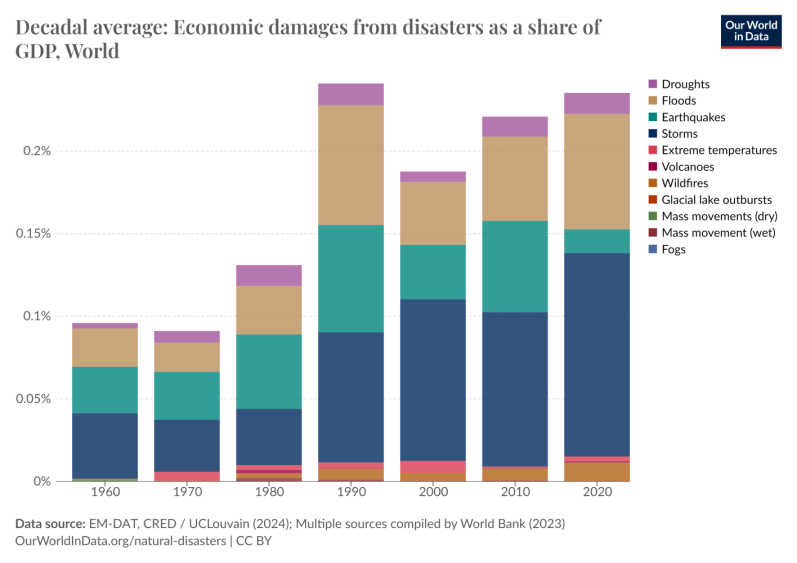
Many of the protests are calling for universities to divest from Israel leading to several universities in the United States and elsewhere actively engaging in discussions about divestment or greater transparency in their investments. The University of Barcelona and Trinity College Dublin recently announced they will divest from Israel.
In addition to the student protests, thousands of people participated in a protest in Malmo, Sweden on 9 May over Israel's participation in the European Song Contest. Several contestants have called for a ceasefire in Gaza, while organizers rebuked a contestant of Palestinian descent for performing while wearing a keffiyeh. There is heightened security for the event which takes place this weekend.
Organizations should anticipate increased scrutiny of their operations, investments, and policies related to Israel. As with all polarizing issues, this increased scrutiny also increases security risks with several high-profile individuals receiving threats of violence because of public statements about the Israel-Palestine issue.
Global Flooding Events
In 2024, several regions around the world have experienced severe floods, exacerbated by climate change and unusual weather patterns. Kenya, Brazil, Tanzania, and Indonesia were among the hardest hit.
Kenya faced catastrophic floods with over 228 fatalities and 131,450 displacements due to rivers overflowing. The government declared a national emergency and mobilized resources to aid the affected.
Brazil saw its southern regions, including Rio de Janeiro and Espirito Santo, ravaged by floods and landslides, killing at least 36 and displacing thousands. The storms were intensified by a preceding heatwave.
Tanzania reported 155 deaths from floods and landslides, with significant damage to infrastructure. The floods affected over 200,000 people, illustrating a severe humanitarian crisis in the region.
Indonesia’s West Sumatra recorded deadly floods and landslides following 300mm of rain in six hours, resulting in at least 26 deaths and significant evacuations affecting tens of thousands.

Meanwhile talks over a ceasefire ended without a deal. Hamas had reportedly agreed to a ceasefire in exchange for the release of Israeli hostages and Palestinian prisoners. However, earlier this week Israel declared the three-phase truce proposal approved by Hamas unacceptable, saying terms had been watered down.
Additionally, the leader of Yemen's Houthis has threatened to target ships of any company related to supplying or transporting goods to Israel regardless of their origin. The Houthi attacks have caused significant disruption to shipping.
For corporations, the conflict continues to pose significant risks to supply chains and brand and reputation.
Student Protests Increase Brand and Reputational Risks
Recent student protests against Israel underscore the reputational risks faced by organizations engaging in political issues. Andrew Dudum, CEO of Hims & Hers, initially made a public offer to hire students expelled for participating in the protests, emphasizing moral courage over a college degree. However, this stance led to a backlash, causing the company's stock to slide by 8%, highlighting the potential direct impact of such statements.

Friday Blend: 10 May 2024
U.S. Considers Stopping Some Military Aid to Israel
President Joe Biden has said that the United States will stop some military aid to Israel if it goes ahead with its planned offensive on Rafah. U.S. officials said a shipment of 1,800 2,000-pound bombs and 1,700 500-pound bombs to Israel has already been paused because of the risk to civilians in Gaza.
Israel's United Nations ambassador Gilad Erdan said the decision to pause some weapons deliveries "would significantly impair the country's ability to neutralize Hamas' power." The U.S. is by far the biggest donor to Israel and withdrawing offensive weapons would be a significant move, but Israeli Prime Minister Netanyahu said Israel would continue with the operation.
Although food prices have decreased, they remain high by historical standards, with inflation still being a concern in many economies. Food prices are often linked to protests and unrest. The FAO is a useful tool for understanding global market trends and assessing potential impacts on food security.

The Israeli economy contracted by 21% in the fourth quarter of 2023 because of the conflict with Hamas, which resulted in the mobilization of reservists, restrictions on Palestinian worker entry, population displacement, and a collapse in tourism. It is the most significant contraction since Q2 2020. Key indicators such as private consumption and investment also experienced steep declines, while government spending increased due to war-related expenses and compensation for affected businesses and households. In 2023 the economy did grow by 2%, but this was below the estimated 3.5% that had been estimated before the 7 October Hamas attack.
Implications
The suspension of trade between Türkiye and Israel will cause short-term economic disruptions for both countries. The most immediate impact will be on supply chains and the associated costs of delays and replacement goods and services.
Russia Accused of Using Chemical Weapons in Ukraine
The U.S. Department of State has announced a significant expansion of sanctions against Russia, in response to its full-scale war against Ukraine and internal repressive actions, including Russia's use of the chemical weapon chloropicrin (a choking agent) against Ukrainian forces, the alleged poisoning of the opposition politician Aleksey Navalny, and other human rights abuses and aggressive actions. The new sanctions target over 500 individuals and entities, including those involved in evading previous sanctions and Russia's energy, metals, and mining sectors.
Russia's Use of Chemical Weapons
As well as on the battlefield in Ukraine, Russia has used chemical weapons in at least two separate assassination attempts. These include the use of Novichok nerve agents in the United Kingdom against Sergei Skripal and his daughter Yulia, as well as the separate attempt against Aleksey Navalny in Russia. The U.S. also believes Russia assisted Syria in its use of chlorine as a chemical weapon in Douma in April 2018. According to a recent U.S. report Russia retains an undeclared chemical weapons program and its scientific institutes have researched and developed chemical weapons capabilities, including technologies to deliver agents.
Implications
The U.S. response to Russia's use of chemical weapons is unlikely to extend beyond sanctions. The sanctions are part of a broader strategy to reduce Russia's revenue streams and technological acquisitions that support its military activities and future energy production capabilities.
FAO Food Price Index Shows Small Rise in April
As of April 2024, the FFPI stood at 119.1 points, a slight increase from March due to modest rises in the indices for meat, vegetable oils, and cereals. This rise occurred despite a decline in sugar and dairy prices. Over the year, however, the index showed a decrease of 7.4 percent compared to its value a year earlier.
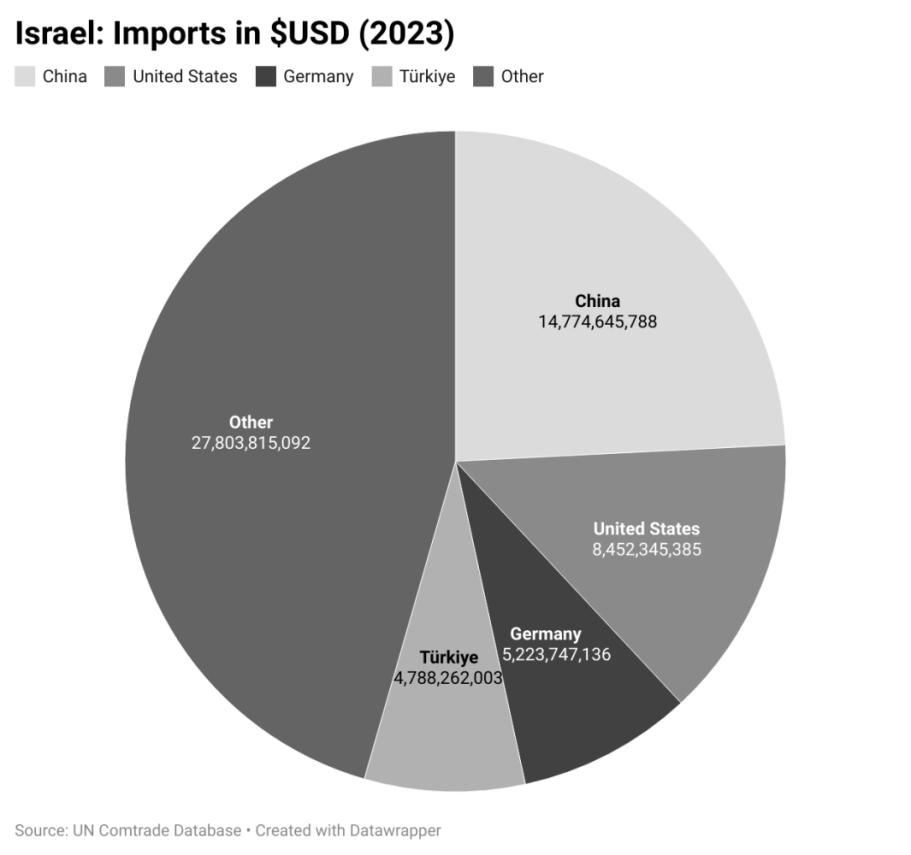
Friday Blend: 03 May 2024
Economic Costs of Israel's War Against Hamas
Türkiye has stopped all trade with Israel because of the humanitarian crisis in Gaza. The Turkish trade ministry said the ban would be lifted if Israel allowed “uninterrupted and sufficient flow” of aid into the territory. Trade between the two countries was worth $6.8bn in 2023. Israel's imports from Türkiye include manufactured items like textiles, clothing, machinery, and electronics; agricultural products such as fruits, vegetables, and grains; and raw materials like metals, plastics, and chemicals.
Penalties for non-compliance will include “naming and shaming” and fines of up to 5% of global revenue. Companies will also be liable for damages caused by breaching the rules.
Implications
The new rules will increase compliance costs for companies operating in the EU as they may need to adjust operations, which could include changing suppliers, altering production methods, and adopting new technologies.
Additionally, companies will be under greater scrutiny from stakeholders, including consumers, investors, and non-governmental organizations (NGOs). Failing to meet the new standards could lead to reputational damage and increase the risks of litigation and activism.
On the positive side, aligning with the regulations can offer long-term benefits such as enhanced brand loyalty, better investor relations, and improved market positioning.
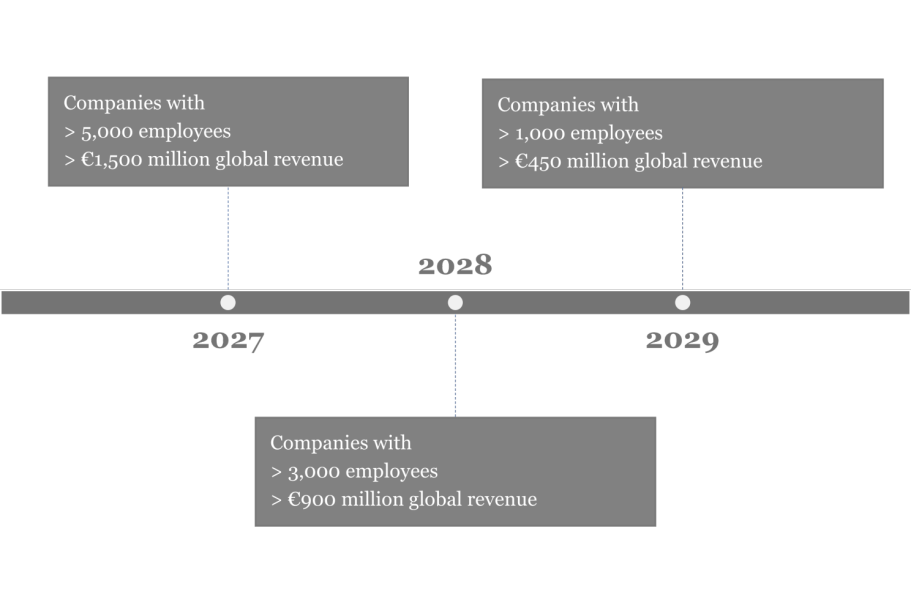
A further five countries host U.S. nuclear warheads that are under U.S. control.
- Turkey
- Italy
- Belgium
- Germany
- Netherlands
Poland is also discussing hosting U.S. nuclear weapons because of the threat from Russia, which deployed the nuclear weapons to Belarus, using the U.S./NATO "host" model as justification.
Nuclear Weapons and Ukraine
Russian President Vladimir Putin and other senior Russian officials have repeatedly made threats about the use of nuclear weapons in the war with Ukraine. The threats are most likely meant to deter Western support for Ukraine and they increase when Russia faces setbacks in the war. The likelihood of them being used is currently very low. However, Putin has suggested that they could be used if Ukraine used long-range missiles - like those provided in the latest round of military aid - to target Russia (this might extened to Russian held territory in Ukraine), or if Ukraine carried out sustained attacks against Russian infrastructure as with the Ukrainian drone strikes. Altough, the damage caused by Ukraine would probably need to be more severe than currently seen. The main triggers are most likely to be Russia fearing it will lose the war, a broader conflict with NATO, or if Putin's regime is at risk of collapse.
Implications
A scenario in which Russia uses a nuclear weapon is low likelihood but high impact. Even the use of a lower yield tactical nuclear warhead would have far reaching ramifications. Russia would be further isolated and more sanctions on Russian oil and gas would be highly likely. There would be significant pressure for any international businesses that are operating in Russia to withdraw or divest as well as shocks to financial markets. There would also be an increased risk of a wider conflict with NATO.
New EU Rules for Companies on Human Rights and Environment
The European Parliament approved a new directive requiring companies and their "upstream and downstream partners, including supply, production and distribution to prevent, end or mitigate their adverse impact on human rights and the environment. Such impact will include slavery, child labour, labour exploitation, biodiversity loss, pollution or destruction of natural heritage." Companies will also have to align with the Paris Agreement on climate change. The new rules will be introduced gradually.
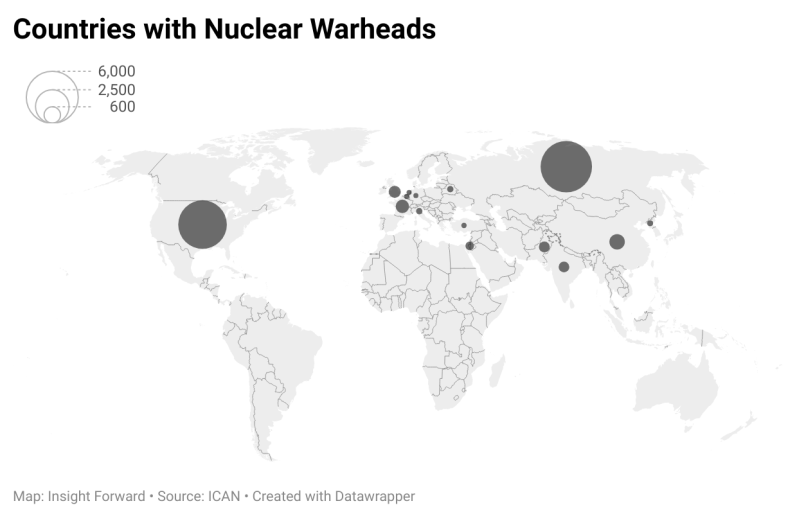
Before the aid package was agreed, Ukraine warned that Russia is preparing a new offensive in May. The military aid will assist Ukraine in preventing Russia from achieving any substantial battlefield gains, but is also unlikely to allow Ukraine to make any significant progress in the war.
In response to the U.S. aid, Russia said it would increase its targeting of facilities storing Western weapons and is likely to intensify air, missile, and drone strikes against Ukrainian infrastructure.
In a related development, Belarus President Alexander Lukashenko said Russia has deployed “several dozen” nuclear warheads in the country. Lukashenko claimed Belarus was facing security threats from NATO and because of the war in Ukraine. Ivan Tertel, head of Belarus's KGB, also said a drone attack launched from NATO-member Lithuania had been prevented. Lithuania denied the allegations and Lukashenko and Tertel's comments are likely meant to justify Russia's deployment of nuclear weapons.
Which Countries Have or Host Nuclear Weapons
Russia's placement of nuclear warheads in Belarus increases the number of countries that have or host them to 15.
Nine countries possess nuclear weapons.
- Russia
- United States
- China
- France
- United Kingdom
- Pakistan
- India
- Israel
- North Korea
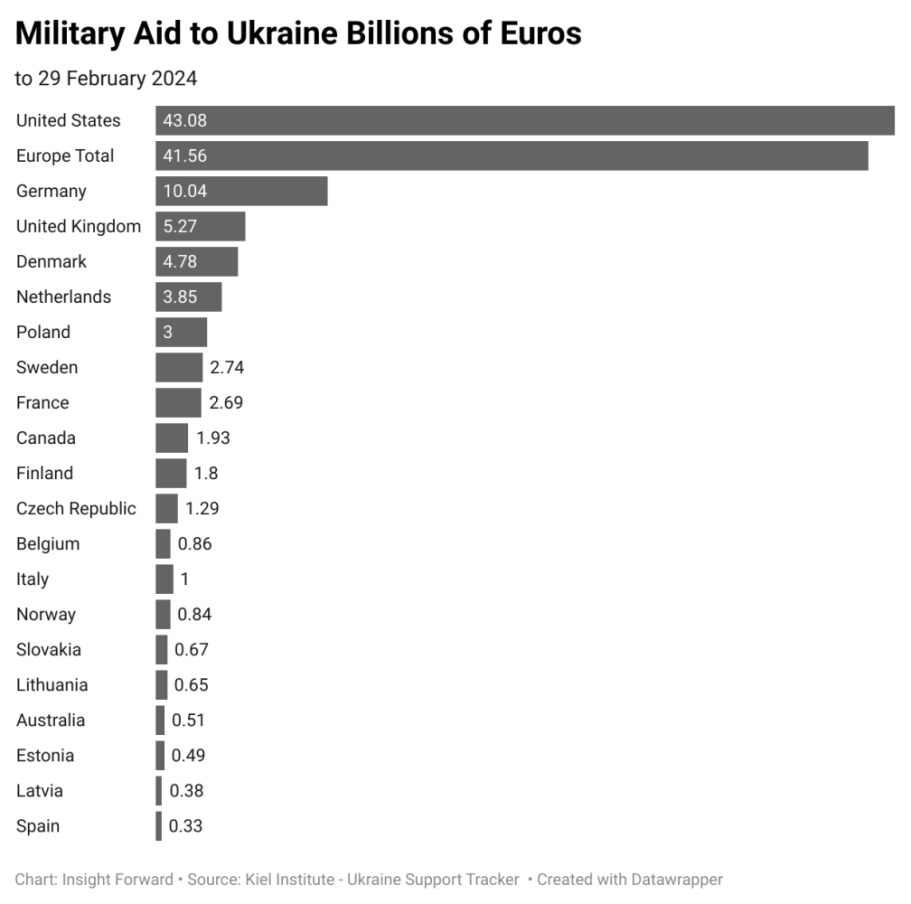
Ukraine's war effort has also been boosted by the new $61 billion U.S. aid package, which includes air defenses, artillery rounds, armored vehicles, and anti-tank weapons.
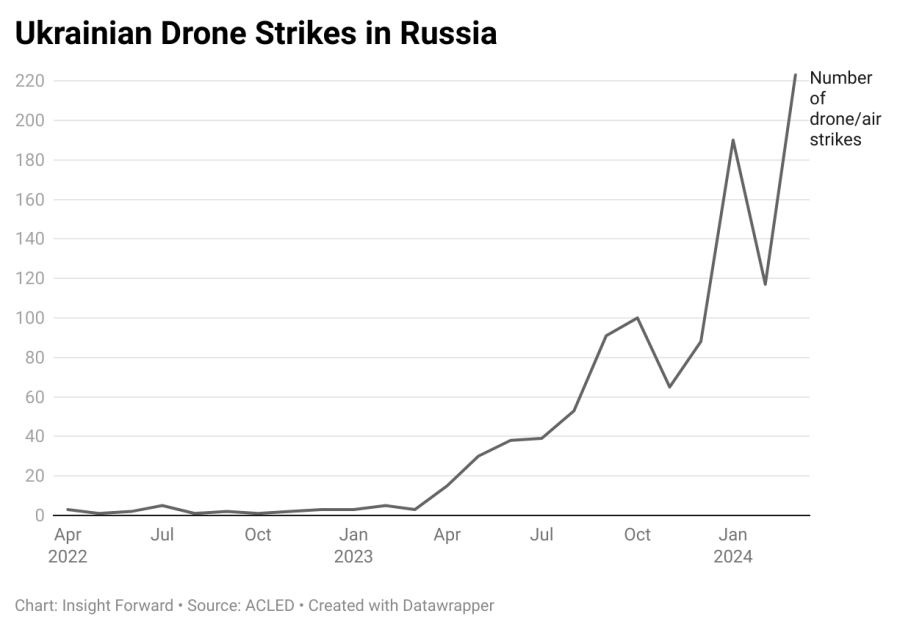
Friday Blend: 26 April 2024
Droning on
By the end of March, Ukrainian drone strikes had damaged around 14% of Russia's primary oil refining capacity, according to Reuters. This strategic targeting of Russia's economic assets is part of Ukraine's efforts to disrupt the financing of the war. Additionally, by striking deep inside Russia, Ukraine aims to demonstrate the consequences of the conflict to the Russian population.

There is an increased risk of domestic extremism around this year's presidential election in the U.S. The primary risk is from lone actors or small groups carrying out attacks using firearms and IEDs. Priority targets are government and law enforcement personnel and property as well as targets based on religion and race.
IMF World Economic Outlook
In its latest report, the IMF forecasts steady global growth at 3.2 percent for 2024. The global economy has shown resilience to several factors including high inflation, conflict, and recovery from the COVID-19 pandemic. The US economy is performing particularly strongly, which is helping to mitigate some of the economic problems in China. However, the persistence of high inflation and geopolitical instability through trade tensions and conflicts continue to pose significant risks to the global economy in the coming year. Additionally, many governments have high debt levels that could result in tax increases that impact economic growth.
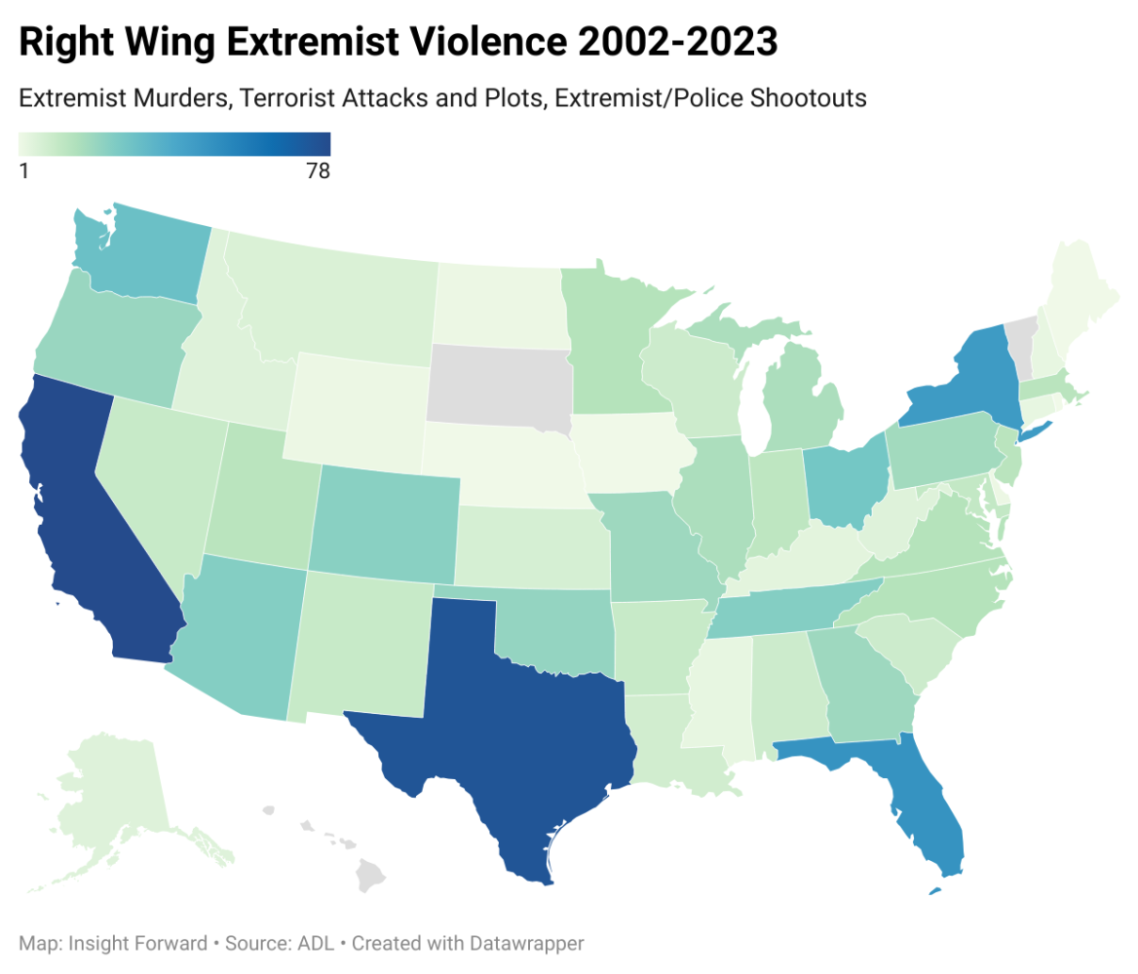
Friday Blend: 19 April 2024
Israel Retaliates Against Iran
Israel has reportedly targeted the Iranian city of Isfahan with a missile and drone strike. Full details are unclear but U.S. sources said that a missile had hit an area near the city and Iranian state media said three drones had been shot down. No damage or casualties were reported. Israel has not claimed responsibility or commented on the incident, but had warned the U.S. the strike was going to take place. Officials in Iran have played down the incident, stating they do not plan to retaliate. This indicates that they are trying to draw a line under the exchange.
The targeting of Isfahan was significant because it hosts a large airbase, a major missile production complex, and several nuclear facilities. If Israel attacks Iran again it will most likely target sites associated with its nuclear programme. Earlier, Iranian officials said that they would reconsider their nuclear doctrine if Israel threatened its nuclear facilities.
While neither side appears to want a broader conflict they have now directly attacked each other's territory, which is an important change from the "shadow war" they have been engaged in for several years. This increases the likelihood of further direct strikes. Triggers include Israeli strikes that kill Iranian military personnel in Syria, Iraq, or Lebanon. Attacks on Israeli diplomatic missions that are linked to Iran, further Israeli strikes on Iranian territory, and developments in Iran's nuclear programme that indicate they are close to building a nuclear weapon.
Anniversary of Oklahoma City Bombing
On April 19, 1995, 168 people were killed and more than 500 others in a bombing of the Alfred P. Murrah Federal Building in Oklahoma City. Timothy McVeigh carried out the attack and in a letter said it was against a government he thought was becoming increasingly hostile towards its citizens.
"I chose to bomb a federal building because such an action served more purposes than other options. Foremost the bombing was a retaliatory strike; a counter attack for the cumulative raids (and subsequent violence and damage) that federal agents had participated in over the preceding years (including, but not limited to, Waco)." - Timothy McVeigh
McVeigh continues to inspire far-right extremists and alongside Anders Breivik and Brenton Tarrant is revered as part of the "Saints Culture" of extremists who aspire and encourage others to carry out similar attacks. In August 2017, Jerry Drake Varnell was arrested in Oklahoma City when he attempted to detonate what he believed to be a bomb outside a local bank. The explosives were, however, fake, provided by the FBI during an undercover operation targeting Varnell, who reportedly admired McVeigh and intended to mimic his actions.
McVeigh (and Breivik) were inspired by the novel The Turner Diaries written and published by the white supremacist William Luther Pierce in 1978. The book is particularly influential amongst "accelerationists" who believe the collapse of modern society can be accelerated by terrorist actions conducted by lone actors or small groups.
Objects in orbit - NASA
- 36500 space debris objects greater than 10 cm
- 1000000 space debris objects from greater than 1 cm to 10 cm
- 130 million space debris objects from greater than 1 mm to 1 cm

NASA Satellite in Near-miss
In February this year, a defunct Russian satellite in low Earth orbit came within ten metres of an active NASA satellite. If the two objects - neither of which were manoeuvrable - had collided it could have potentially started a catastrophic collision cascade with other objects in orbit.
There are currently more than 10,000 satellites in orbit and debris is an increasing risk. There have been more than 640 break-ups, explosions, collisions, or anomalous events resulting in debris and about 35150 objects are regularly tracked by space surveillance networks.

Oil prices have also risen by more than ten percent this year, currently trading above $90 per barrel, which increases inflationary pressure by affecting manufacturing, logistics, and production costs across multiple sectors.
Weather has also impacted the price of other commodities such as cocoa and coffee, which can also affect inflation. Droughts in West Africa have impacted cocoa supply, which is trading at historic highs of more than $10,000 per metric ton (over 250 percent increase in the last year).

Iran could also carry out a significant cyber attack against Israel to cause damage to infrastructure and steal or leak information. Using proxies or cyber-attacks would allow Iran to avoid claiming responsibility for the attacks, lowering the risk of a broader escalation.
Geopolitical Tensions Commodity Prices and Inflation
Gold prices reached an all-time high on April 12, as the threat of broader conflict in the Middle East has led to increased prices of some commodities. Gold is also seen as a hedge against inflation, so rising gold prices also signal concerns about inflationary pressures in the global economy (U.S. inflation recently stopped falling).
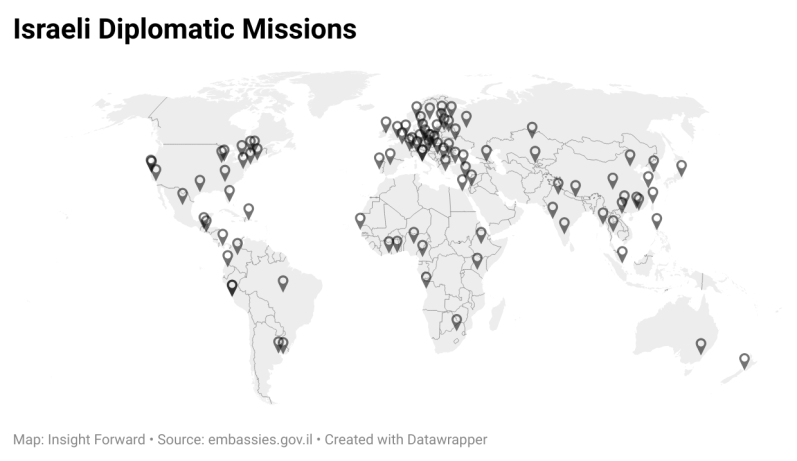
Friday Blend: 12 April 2024
Iranian Response to Israeli attack
There is increased concern that Iran is preparing to attack Israel in retaliation for Israel’s strike on the Iranian consulate in Damascus, Syria. The timing of any Iranian response is unclear, media reports quoting sources from U.S. intelligence and Israeli Defence Forces claim the attack may come within the next 48 hours. However, other reports quoting Iranian officials state that the planned response and timing are yet to be decided. Iran is likely exploiting this uncertainty to run misinformation campaigns which are a useful psychological tool to distract Israel from the war in Gaza, disrupt day-to-day life in Israel, and stoke fear in the Israeli public.
How will Iran respond? If Iran does attack Israel, it has several options.
A direct attack on Israel using missiles or drones. This would likely be intended to target military or intelligence facilities to minimize the risk of civilian casualties. This would increase the risk of a direct Israeli attack or perhaps even U.S. strikes on Iran.
A proxy attack against Israel using missiles or drones. Iran’s proxies in Lebanon, Syria, Iraq, and Yemen are all capable of striking Israel. One or all of these groups could target Israel in response. Hezbollah in Lebanon is the most capable group. However, a significant attack would risk Israel going to war with Hezbollah in Lebanon. Iran likely wants to keep Hezbollah as a deterrent against the threat of direct Israeli attacks on Iran.
It is also still likely that Iran wants to avoid being directly involved in a regional war, but not responding to the Israel attack would make it appear weak and indicate to Israel that it can continue with further similar attacks without a response.
Other options
Iran could target an Israeli diplomatic or Jewish facility in a third country using missiles or drones launched from Iran. This would damage Iran’s relations with the host nation involved, but Tehran may be willing to accept that risk. The alternative is a proxy or state-sponsored terrorist-style attack against similar targets. Iran and its proxies have previously targeted Israeli diplomatic missions and Jewish cultural assets in countries such as Argentina, India, and Bulgaria. As a precautionary measure, Israel has reportedly closed 28 embassies worldwide.
The humanitarian crisis in Gaza will likely have broader political implications because it will likely be used by the US, UK, and other governments to reduce their support for Israel.
A Hamas official said on April 4, that there has been no progress in Gaza ceasefire talks. CIA director William Burns is expected to travel to Cairo this weekend to meet with his Egyptian and Israeli counterparts and the Qatari prime minister to try to reach a breakthrough. The US had already allowed a ceasefire vote at the UNSC and the killing of humanitarian workers will increase the likelihood of a ceasefire by the summer.
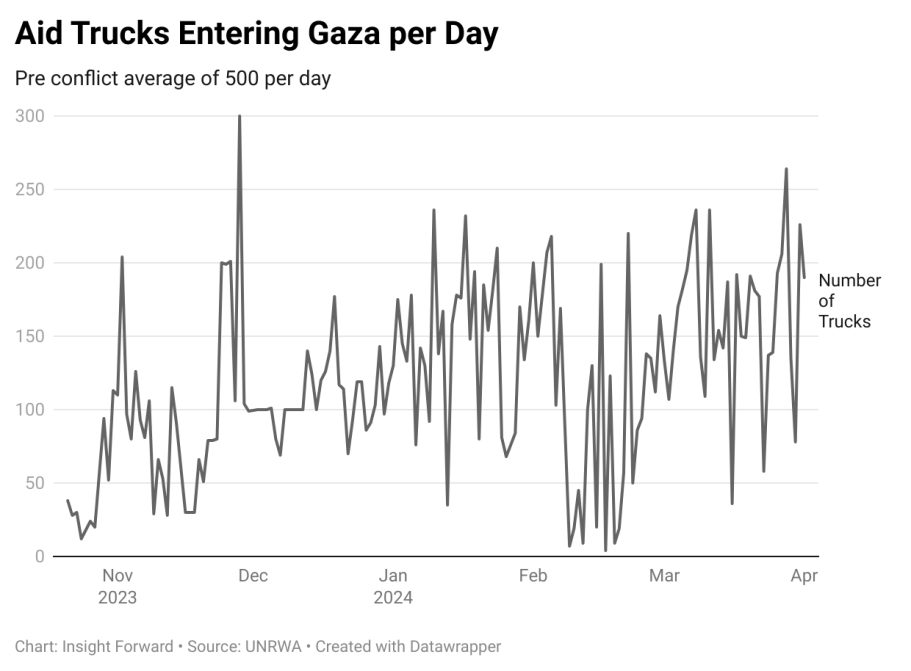
Few NATO countries have mandatory military service, but Russia's invasion of Ukraine is increasing concerns about readiness for a potential future conflict.
Aid to Gaza
Israel agreed to a temporary increase in aid to Gaza after President Biden threatened to change US policy unless it took "immediate action" to protect aid workers and civilians. An Israeli strike on April 1, killed seven volunteers with the World Central Kitchen (WCK), an aid organization founded by celebrity chef José Andrés.
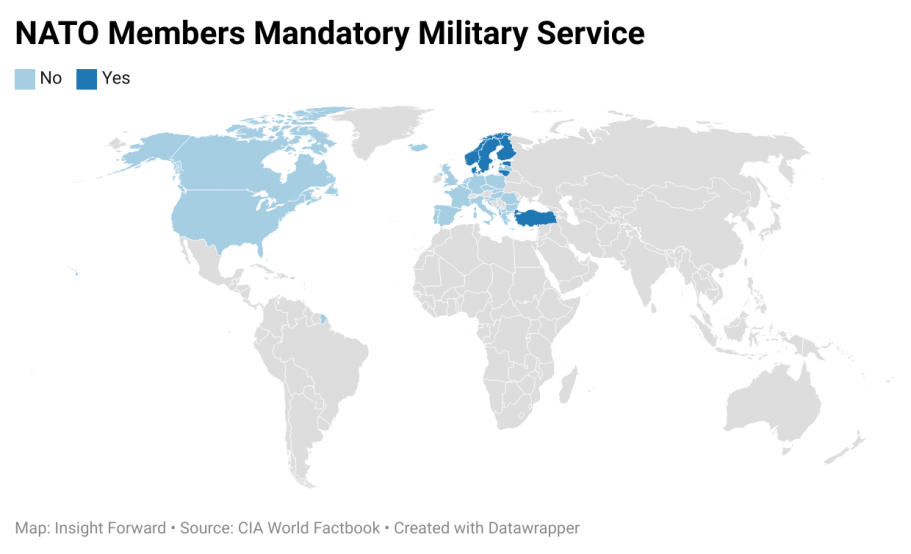
Space is becoming increasingly important geopolitically as nations recognize its strategic and economic value. The ability to operate and navigate space impacts national security, communication, and technology. Moreover, space exploration holds the potential for valuable resource extraction and scientific advancement.
Germany considers bringing back compulsory military service
Germany is contemplating reintroducing compulsory military service as part of significant reforms to enhance its armed forces. This reflects a broader European trend where countries like Norway, Denmark, Latvia, and Sweden are adjusting, or have adjusted, their military conscription policies in response to regional security challenges. Germany is also introducing other military reforms such as establishing a unified command structure and a new cyber warfare unit.
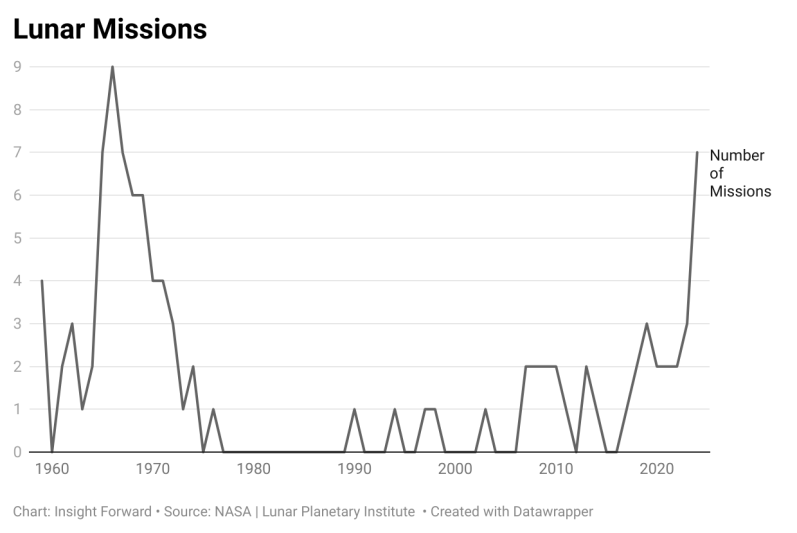
Friday Blend: 5 April 2024
What time is it on the Moon?
NASA is set to establish a unique time zone for the moon by 2026 to support future astronaut missions and facilitate lunar operations. This initiative addresses the technical challenges posed by the moon's different gravitational forces, which affect time measurement. Concurrently, Russia and China are advancing their lunar ambitions with plans to deploy a nuclear power plant on the moon between 2033 and 2035. This collaboration aims to provide the necessary energy for potential lunar settlements, highlighting the growing international interest in lunar exploration and settlement.
The use of drones in the war in Ukraine is also important. Corporations need to understand how drones and drone swarms are utilized as they are highly likely to be used in future attacks.
ISIS-K Attack in Moscow
On March 22, terrorists associated with ISIS-K attacked Crocus City Hall in Moscow, killing 139 people. Four suspects, from Tajikistan, have been arrested, they were in Russia on temporary or expired visas. A significant portion of ISIS-K’s members are of Central Asian origin, particularly Tajiks, and there is a large contingent of Central Asians living and working in Russia. Some of these individuals may have become radicalized and been in a position to serve in a logistical capacity to support attacks.
ISIS-K has carried out several significant attacks in and outside of Afghanistan
- Aug 2021: attack at the Kabul airport in Afghanistan that killed more than 150 Afghan civilians and more than a dozen U.S. service members.
- Jan 2024: twin bombings in Iran that killed scores and wounded hundreds of others at a memorial service for Iran’s former top general, Qassim Suleimani, who was targeted in a U.S. drone strike four years earlier.
- Jan 2024: believed responsible for an attack on a Roman Catholic church in Istanbul, killing one person.
Other plots in Turkey, which also serves as an operational hub for the group, and Germany have been disrupted. In July 2023, seven Tajik, Turkmen, and Kyrgyz individuals linked to ISIS-K were arrested in North Rhine-Westphalia, Germany. They were reportedly planning to attack the Cologne Cathedral on New Year’s Eve 2023.
According to a UN terrorism monitoring report, ISIS-K poses the greatest terrorism threat in Afghanistan, but also has the capability to "project into the region and beyond". In Afghanistan, their primary targets are Shia, the Taliban, and civilians. However, the group clearly has the intent to carry out mass casualty attacks against Western assets and in Europe. This increases security concerns ahead of major events such as the European Football (soccer) Championship in Germany, and the Paris Olympic and Para Olympic games.
World Happiness Report 2024
Gallup recently released the 2024 World Happiness Report.
Ten key findings:
- Global Happiness Trends: The report highlights changing happiness levels across different age groups worldwide. Notably, happiness among the young has fallen significantly in North America.
- Regional Variations: In Central and Eastern Europe, happiness levels have risen sharply across all age groups, contrasting with declines in South Asia, the Middle East, and North Africa.
- Generational Differences: The report uncovers generational shifts in happiness, identifying lower happiness levels among people born since 1980 compared to older generations.
- Happiness Inequality: Since 2006-10, happiness inequality has increased in every region except Europe.
- Social Support and Loneliness: Across global regions, feelings of social support are more prevalent than loneliness, both of which significantly impact happiness levels.
- Youth Well-being: For young people aged 15-24, global life satisfaction trends have shown a decline in Western Europe and North America, while improving in other regions.
- Child and Adolescent Well-Being: The report highlights the decline in life satisfaction among young girls in high-income countries.
- Aging and Well-being: The report discusses the associations between well-being and dementia, suggesting that higher well-being can be a protective factor against future dementia.
- Life Satisfaction in India: Among older adults in India, life satisfaction tends to increase with age, with notable differences between genders and social groups.
- Country Rankings: Finland remains the happiest country, with Nordic countries dominating the top rankings. The report also notes shifts in rankings for countries like the United States and Germany, which have dropped out of the top 20, reflecting broader changes in global happiness dynamics.
Geopolitical Implications
Domestically, high levels of inequality in happiness can lead to social unrest, and political instability, and drive migration, as people seek better living conditions and opportunities abroad. Migration is a significant concern in many countries. It can impact the relationship between countries and regions, cause political instability, influence policy changes, and increase the popularity of political parties with strong anti-immigration policies.
Implications for Corporations
Levels of happiness can influence consumer behavior. Companies operating in regions with significant happiness inequality may experience unpredictable consumer preferences and behaviors, as economic disparities can lead to varied consumption patterns and demands.
Employee well-being is also important. Countries with high happiness inequality might encounter challenges in workforce satisfaction and productivity as well as talent acquisition and retention.
Lastly, Stakeholders, including consumers, investors, and the broader public, are increasingly holding companies accountable for their impact on societal well-being. Therefore, how corporate social responsibility (CSR) initiatives are perceived in countries with low levels of happiness or high levels of happiness inequality can enhance or damage the reputation and brand value of the companies involved.
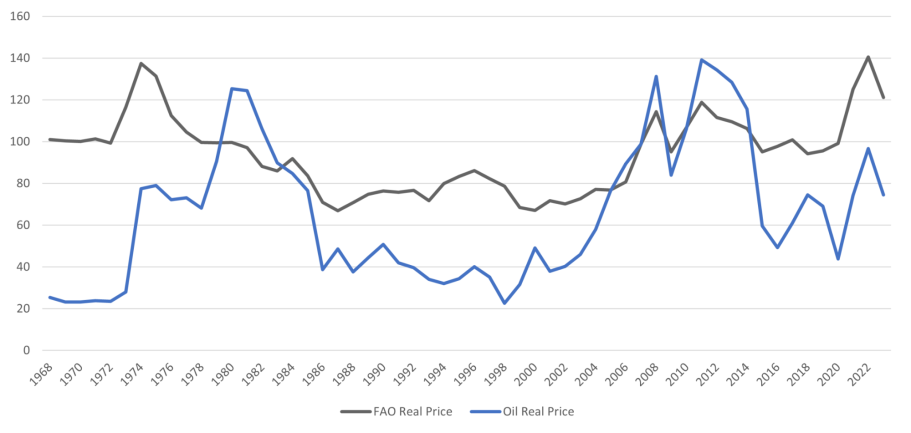
The attacks are keeping oil prices above $80 per barrel and the U.S. has asked Ukraine to stop the attacks because of concerns over further price increases and Russian escalation.
Implications
High oil prices are negative for economic growth and increase inflationary pressures and operational costs for businesses. There is a strong link between increased oil prices and increased food prices. Prolonged periods of high prices increase the risk of social unrest.
Oil Price Vs Food Price
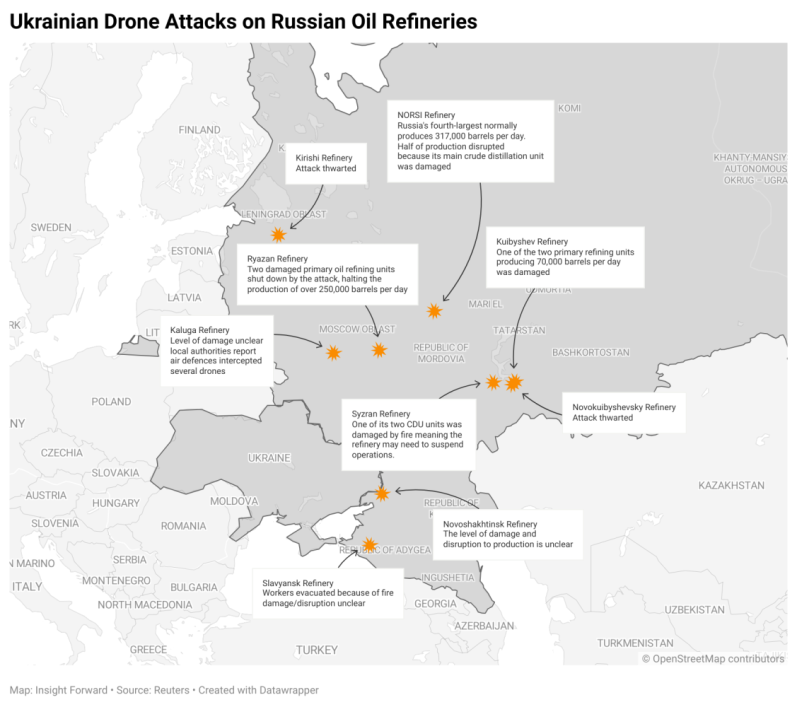
Friday Blend: 29 March 2024
Ukraine Targets Russian Oil Refineries
Ukraine has carried out a series of drone attacks against Russian oil refineries reportedly disrupting the production of between 400,000 and 900,000 barrels a day out of a capacity of 6 million barrels per day.
Implications
Air pollution can lead to health-related productivity losses, operational disruption, increased compliance costs, and potential reputational damage. These can all have financial implications for corporations.
Putin "Wins" Russian Presidential Election
Vladimir Putin secured another 6-year term as Russian president, winning just 87 percent of the vote from about a 74 percent turnout nationally. The election was unsurprisingly criticized as being neither free nor fair. In some areas such as Belgogrod, Putin won 100 percent of the vote from a 100 percent turnout. At polling stations where independent advisors had managed to register, Putin received about 60 percent of the vote. Despite the irregularities, he remains popular.
Vladimir Putin is now Russia’s longest-serving leader since Josef Stalin. He has promoted a historical view of Russian identity that informs his understanding of their national interest. Western governments and companies need to consider the long-term implications of Putin remaining in power as he will continue to dominate Russian politics and policy.
These are some of the key questions we will be asking.
Domestic Politics
- Why do so many Russians support Putin, and what does this mean for forecasting Russian politics?
- Did Western sanctions help unify the elite and popular opinion of Putin, and if so, what does that mean for the impact of future Western actions?
- Does Navalny’s death impact the internal dynamics of Russian politics following this election, and is there a possibility of opposition to Putin?
Foreign Policy
- How will the Ukraine war unfold with Putin remaining in power considering he is dedicated to Russian “victory”?
- Will Putin winning the election encourage European governments to increase defense spending?
- How will Putin attempt to compete in the soft power competition between Russia and the West in places like Latin America and Africa?
Relationship with the West
- Based on Russia’s continued support for Putin, how will European (western and eastern) countries respond to his continued reign?
- What will the future relationship and influence look like between Putin and right-wing figures and parties in Western governments?
- Will Western governments reconsider sanctions because Putin will remain in power for the foreseeable future?
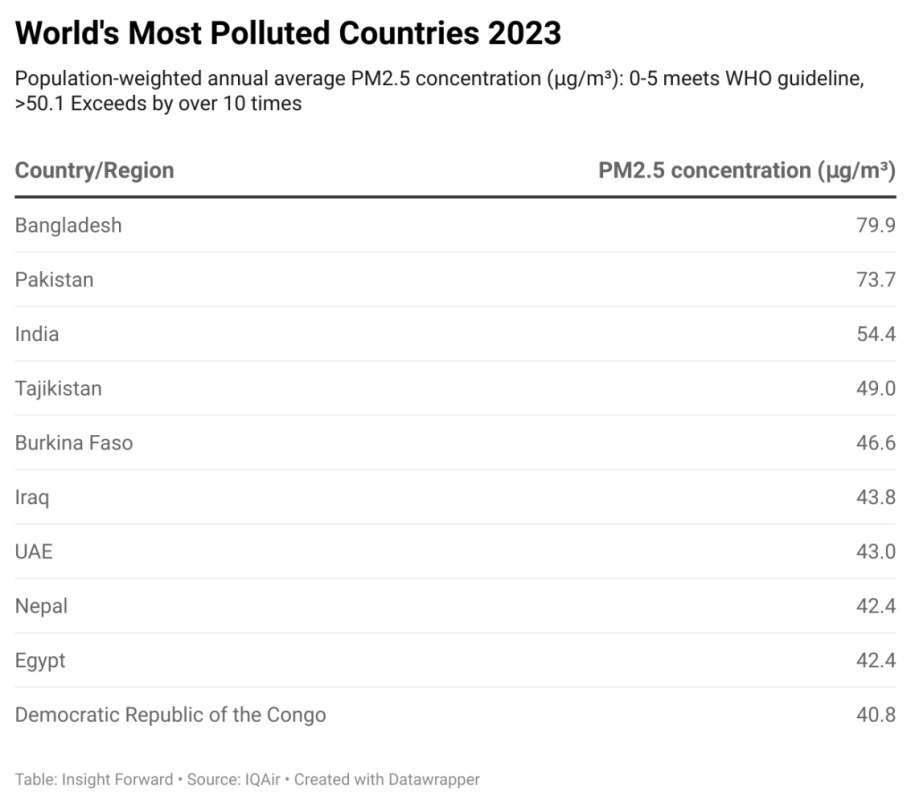
Geopolitical Implications
- Arctic territorial disputes: As Arctic sea ice melts, previously inaccessible areas in the Arctic region have become navigable and accessible for resource extraction. This has led to territorial disputes among nations with Arctic borders, such as Russia, Canada, Denmark (via Greenland), Norway, and the United States, as they vie for control over potential shipping routes and natural resources.
- Climate migration and refugee crises: Climate change-induced events have already displaced millions of people worldwide. This climate migration is expected to increase.
- Water scarcity and conflicts: Climate change is exacerbating water scarcity in many regions, particularly in areas already facing water stress. This can potentially lead to conflicts between countries or communities that share water resources, such as the tensions between Egypt, Sudan, and Ethiopia over the Nile River and the Grand Ethiopian Renaissance Dam.
- Food insecurity and social unrest: Climate change is projected to have negative impacts on agricultural productivity in many regions, leading to food insecurity and potential social unrest.
- Competition for resources and great power rivalries: As climate change affects resource availability and distribution, there is potential for increased competition and tensions among great powers vying for access to resources.
Implications for Corporations
Climate change and the related geopolitical developments have significant implications for corporations across various sectors.
- Operational and Supply chain disruptions because of extreme weather events and resource scarcity.
- As governments respond to climate change challenges, corporations can expect tighter regulations and stricter environmental standards.
- Climate change influences consumer preferences and market trends, with growing demand for sustainable products and services.
- Corporations may face legal risks and lawsuits related to their contribution to climate change or failure to adequately address climate-related risks. Negative public perception and reputational damage can also impact consumer loyalty, investor confidence, and stakeholder relationships.
Climate warnings will also drive an increase in activism, unrest, and other violence. As environmental activism increases in the coming years so will the direct risk to companies and their executives. While most activities will consist of non-violent protests and civil disobedience campaigns, climate-related activism is becoming more frequent, elaborate, and disruptive. If climate pledges are not fulfilled, and global temperatures continue to rise, there is an increased risk of more radical environmentalist groups and individuals emerging.
World's Most Polluted Countries
"Air pollution is the greatest environmental threat to public health globally and accounts for an estimated 7 million premature deaths every year. Air pollution and climate change are closely linked as all major pollutants have an impact on the climate and most share common sources with greenhouse gases." Pollution Action Note – Data you need to know
In its latest World Air Quality Report IQAir ranked Bangladesh, India, and Pakistan as the most polluted countries in 2023.
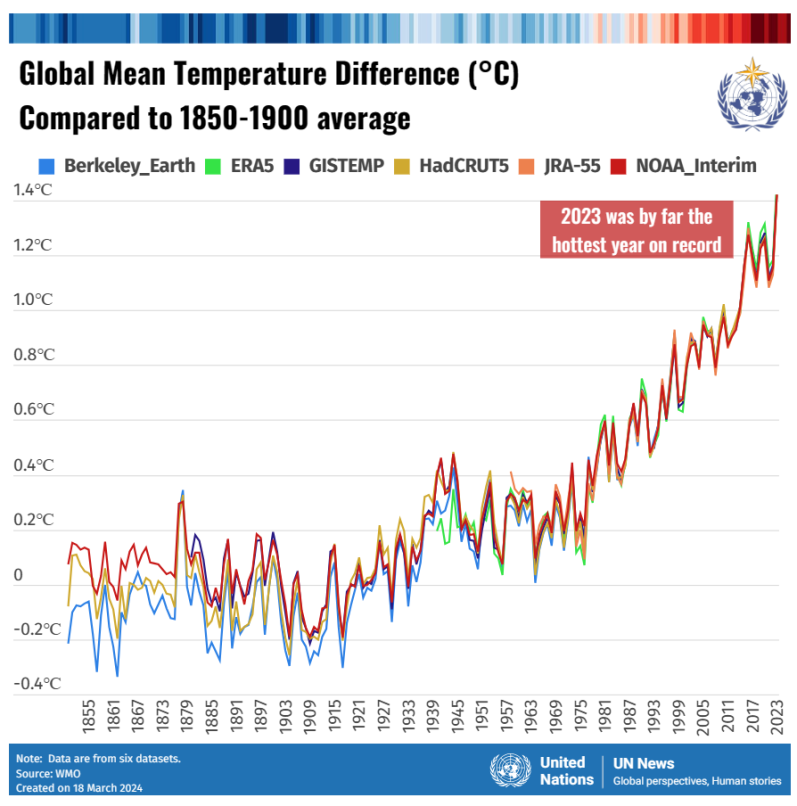
Friday Blend: 22 March 2024
Warmest Decade on Record
According to the UN's latest State of the Climate report, 2023 was the warmest year on record. The global average near-surface temperature was 1.45 °Celsius above the pre-industrial baseline. It was also the warmest ten-year period on record.
Friday Blend: 15 March 2024
Number of People Exposed to Conflict Increasing
According to ACLED's Conflict Exposure Calculator, the number of people living within 5km of violence is steadily increasing.
Space has become increasingly important geopolitically due to its significant impact on military strategy, economic interests, and technological advancements.
Implications
Space plays a crucial role across various sectors, with satellite technology being a cornerstone for enabling global communications, data transfer, and connectivity. These capabilities are essential for supporting international business operations, facilitating financial transactions, and ensuring connectivity in remote areas. Space is becoming increasingly contested and congested.
Spain Passes Amnesty for Catalan Separatists
On March 14, Spain's national parliament passed a law granting amnesty to numerous leaders and supporters involved in Catalonia's 2017 independence bid. The amnesty bill was approved with a close 178-172 vote in the 350-seat lower house of Parliament in Madrid. The law is controversial and has previously triggered widespread protests across Spain. Some protests attracted far-right activists and became violent.
The amnesty deal will potentially allow the return of Carles Puigdemont, the former Catalan leader who fled to Belgium to avoid prosecution after the 2017 secession bid. Puigdemont acts as the de facto leader of the pro-Catalan independence party Junts. Junts wants Puigdemont's return to Spain to give new impetus to the independence movement, which according to recent surveys has seen a decline in support.
The amnesty vote came a day after Catalan President Pere Aragones called a snap election after the regional government failed to get its budget proposal passed in the regional parliament. The upcoming election could significantly impact national politics, as the Socialist Prime Minister Pedro Sanchez's administration relies on support from Catalan separatist parties, including Junts, for legislative matters.
Implications
The political instability in Spain, particularly around issues like the Catalan independence movement, can impact investment decisions (more than 3000 companies moved their headquarters in Catalonia to other regions of Spain because of the 2017 referendum) and operational disruptions could occur if unrest or strikes take place.
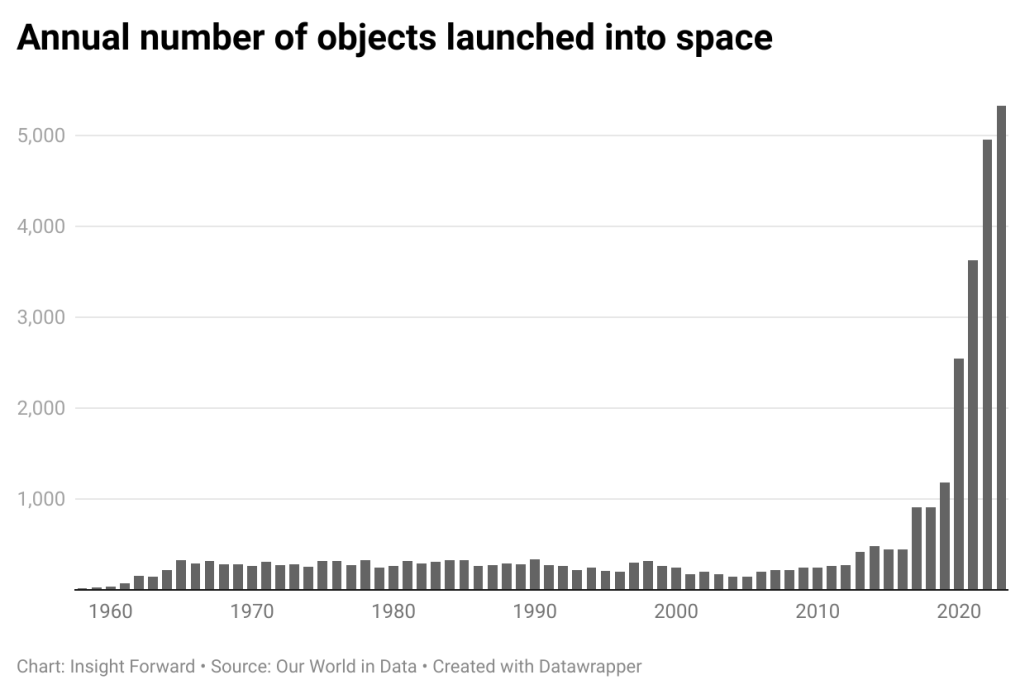
Implications
Increased exposure to conflict presents several risks to business including operational disruptions, such as damage to infrastructure and supply chain interruptions, and employee safety concerns, potentially necessitating additional security measures or staff support. Conflict can also impact investment strategies and influence market stability. Furthermore, companies are under increased scrutiny regarding their corporate social responsibility, especially in how they operate in areas affected by violence.
Number of Objects Launched into Space
Elon Musk's SpaceX recently achieved a significant milestone with the longest test flight of its Starship rocket, which, despite disintegrating upon re-entry, marked notable advancements in space transportation. The rocket is designed to eventually send astronauts to the moon and beyond.
The number of objects launched into orbit has increased significantly over the past few years. Advancements in space launch technologies, notably reusable rockets, and 3D printing, have significantly decreased the costs associated with space launches, contributing to an increase in launch activities. Reusable rockets, which allow the booster component to be recovered and reused, offer substantial cost savings as these boosters represent up to 75% of the rocket's total cost. Meanwhile, 3D printing technology streamlines the manufacturing process, reducing time, costs, and the number of parts required for rocket production.
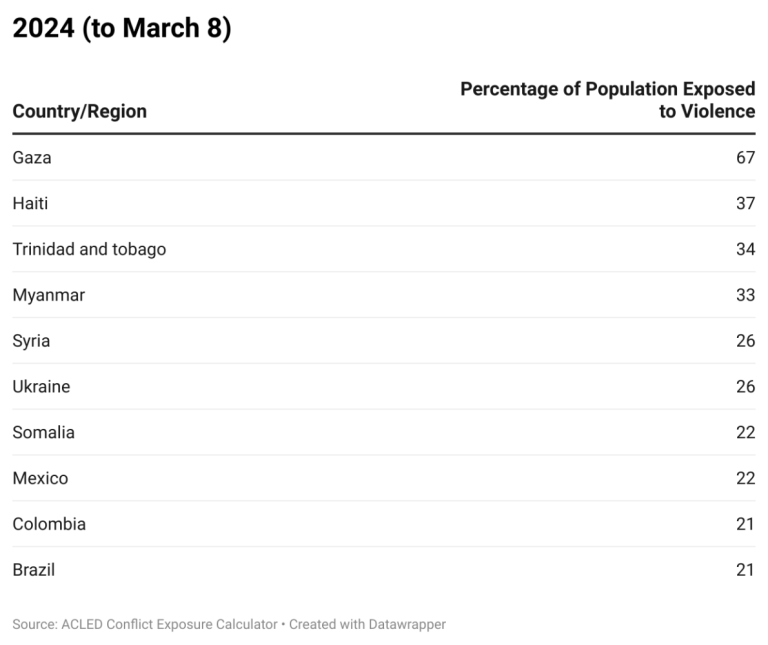
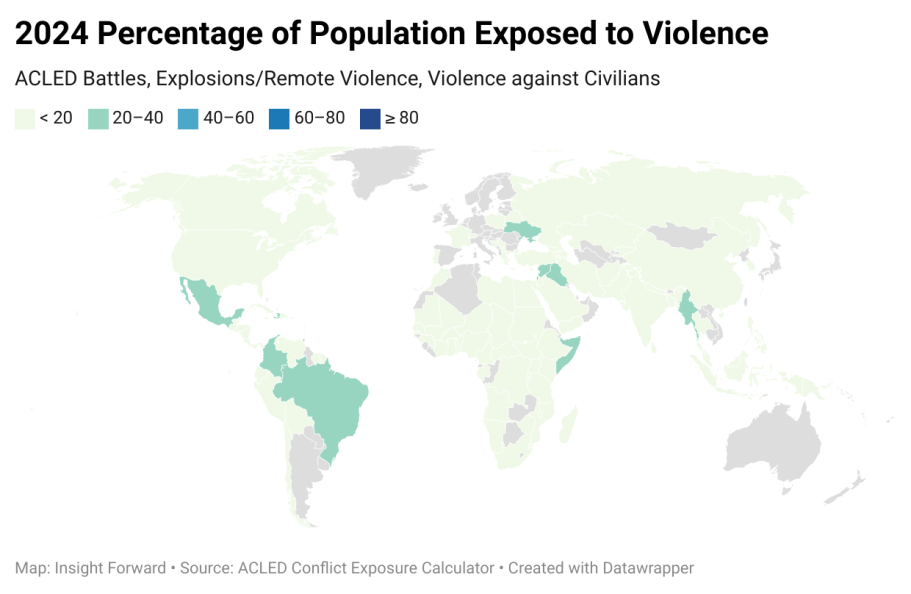
In the first couple of months of 2024 the locations worst affected include Gaza, Ukraine, Mexico, and Haiti,
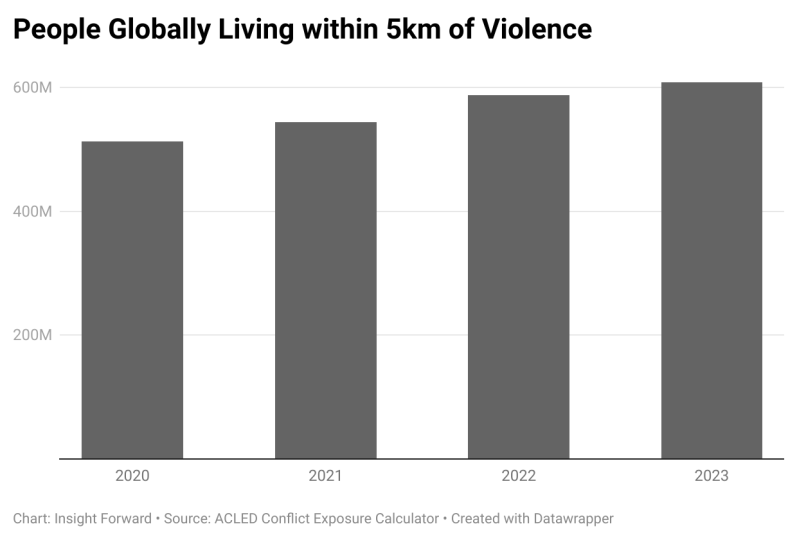
In Canada, there are serious allegations against the Indian government over the assassination of Hardeep Singh Nijjar, a Sikh separatist leader. The FBI reported that it had prevented a similar attack on a Sikh separatist within the United States, and the Department of Justice says that it has thwarted four state-sponsored assassination attempts on U.S. soil since 2022. On March 5, 2024, the FBI issued an alert about an Iranian national suspected of planning to assassinate U.S. officials, including former Secretary of State Mike Pompeo. These assassination plots are believed to be acts of revenge for the January 2020 killing of IRGC-QF Commander Qasem Soleimani. Further, similar plots and attacks are very likely as states and extremists continue to use targeted violence against dissidents and opponents.
Implications
The rise in politically motivated assassinations presents a significant challenge to global security and corporate risk management. As geopolitics evolve - particularly in the context of upcoming elections, great power competition, and ongoing international conflicts – corporations with exposure or operations in regions with heightened political tensions, must assess potential threats. The highest risk is to executives and other personnel involved in politics or who are outspoken about political and social issues, or corporations that are intricately linked to geopolitically significant sectors.
Russian missile landed hundreds of feet from Zelenskiy in Odesa
On March 5, a Russian missile strike in Odesa landed only 500 feet from Ukrainian President Volodymyr Zelenskiy’s motorcade. President Zelenskiy was in the city to hold a meeting with Greek Prime Minister Kyriakos Mitsotakis. There were no injuries to either the Ukrainian or Greek delegations. This is not the first time Russia has carried out strikes while officials from a NATO country have visited Ukraine.
Officials from NATO states visit Ukraine regularly and Russian missile attacks during a visit could plausibly kill a visiting official, even if they were not the intended target. The implications of such an incident are significant, as the NATO member state of the affected official would dictate the nature of the response. These could range from unilateral retaliatory actions to a collective NATO response against Russia. Alternatively, NATO could significantly increase military aid to Ukraine which would increase Ukraine’s chances of winning the conflict.
These responses could escalate tensions, potentially drawing NATO further into the war. Corporations must devise scenarios and monitor the indicators for escalation of the war in Ukraine that could lead to a wider conflict.
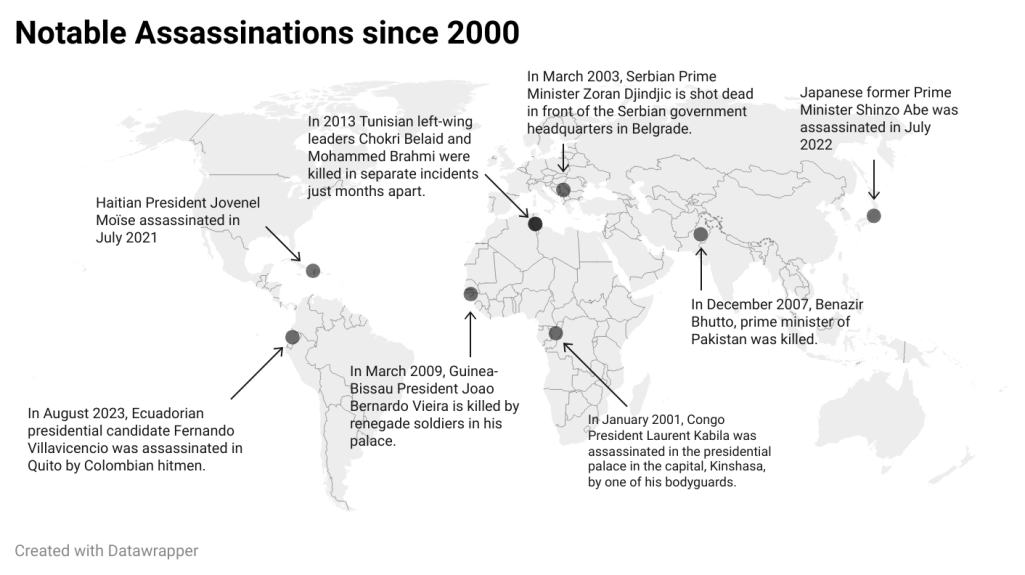
Implications
Elections and associated unrest are important for corporations as they directly impact the business environment and investment climate of a country. Political stability, or lack thereof, can influence market confidence, regulatory changes, and economic policies, all of which are crucial for corporate planning and strategy. Unrest or violence during elections can disrupt operations, and supply chains, and can jeopardize the safety of employees and assets. Therefore, understanding and preparing for the implications of elections and potential unrest is essential for corporations to mitigate risks, make informed decisions, and adapt to the changing political environments in which they operate.
Increase in Politically Motivated Assassinations
The frequency of politically motivated assassinations is on the rise, with incidents linked to grievances against specific political parties or individuals, as well as state-sponsored actions. Countries such as Russia, Iran, and India have been implicated in targeted attacks against dissidents, and opposition figures, and in acts of retaliation.
Attacks have occurred in multiple regions. On January 2, 2024, Lee Jae-myung, the leader of the Democratic Party of Korea, was stabbed by an individual reportedly motivated by a corruption scandal involving Lee. In Argentina, there was an assassination attempt against Vice President Cristina Fernández de Kirchner in September 2023. Moreover, the recent assassination in Spain of a Russian pilot who defected because of the war in Ukraine underscores the persistent risks associated with geopolitical conflicts and the willingness of states to engage in extrajudicial killings.
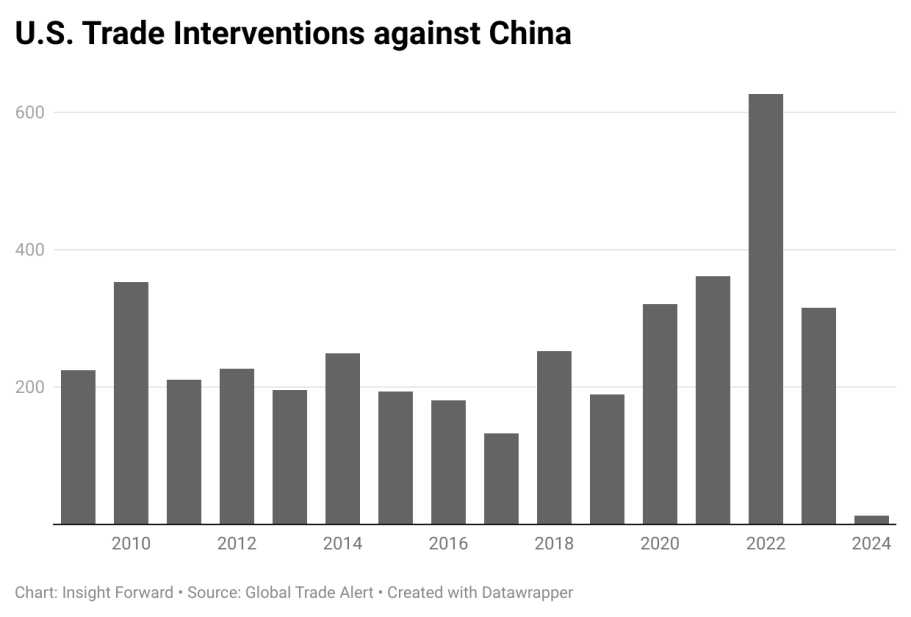
These trends highlight a growing global concern about increasing political violence. From 2010-2020, 38 percent of national elections experienced related violence, a significant rise from 24 percent in the preceding decade. This escalation not only undermines the core democratic value of peaceful transitions of power but also signals a troubling shift in how nations around the world are navigating their political processes.

Friday Blend: 8 March 2024
Elections in 2024
In 2024, nearly half the global population will have the opportunity to vote in national elections, marking a historical peak and a consequential moment for global politics in years to come. A total of 64 elections are scheduled in various countries and the European Union. So far, thirteen elections have been conducted this year, with notable violence in three countries - Bangladesh, Comoros, and Pakistan. Other countries, such as Belarus and Azerbaijan, have faced criticism for poor election practices, raising questions about the integrity and fairness of their electoral processes.
Electoral violence is likely to increase. Looking ahead, 22 of the countries set to hold elections later this year have a history of violence during their electoral cycle. This pattern is underscored by recent events in Mexico, where several electoral candidates have been killed, and in Senegal, where unrest emerged in response to postponed elections.

The investigation is part of a larger effort by the U.S. to protect its national security interests against the backdrop of increasing technological advancements and the global expansion of Chinese automotive manufacturers. With Chinese companies like BYD expanding their footprint in global markets and exploring manufacturing opportunities in Mexico, the U.S. is acting preemptively to address potential security risks before Chinese-made vehicles become widespread in the country. This initiative also aligns with previous actions taken by the U.S. with the Biden administration earlier issuing an executive order to stop data brokers from selling Americans’ data to China, Russia, and other “countries of concern.
This is also part of the trend in technology balkanization as data is critical to developing and applying new technologies, but it also shows the serious risks that personal data creates in geopolitical competition. It is now increasingly likely that data localization and stronger regulations will take place throughout the West.
The Securitization of Trade is Increasing
National security concerns are increasingly influencing not just the competition between the U.S. and China but also global trade dynamics more broadly. This trend is being intensified by significant geopolitical events. According to WTO trade monitoring data, the onset of the COVID-19 pandemic and the war in Ukraine led to a rise in export restrictions. Moreover, security issues are becoming a more frequent topic of discussion at WTO meetings. The growing trend of linking trade with security concerns adds to economic policy uncertainty and heightens the risk of conflicts.


The Ethiopia-Somaliland port deal threatens to undermine cooperation between Addis Ababa and Mogadishu, particularly in their joint counterterrorism efforts against al-Shabab. The militant group has seized the opportunity to intensify its recruitment, exploiting anti-Ethiopian sentiment and the disruption in military coordination between Ethiopia and Somalia. Meanwhile, Somalia's campaign to reclaim territories under al-Shabab's control has been hampered by political infighting, logistical challenges, and a lack of support from key clans.
US to probe if Chinese cars pose national data security risks
The Biden administration has launched an investigation into the national security risks posed by Chinese vehicle imports to the United States, particularly focusing on "connected" car technology. The U.S. Commerce Department will evaluate the potential threats these vehicles might pose through their ability to collect and transmit sensitive data on drivers, passengers, and U.S. infrastructure.
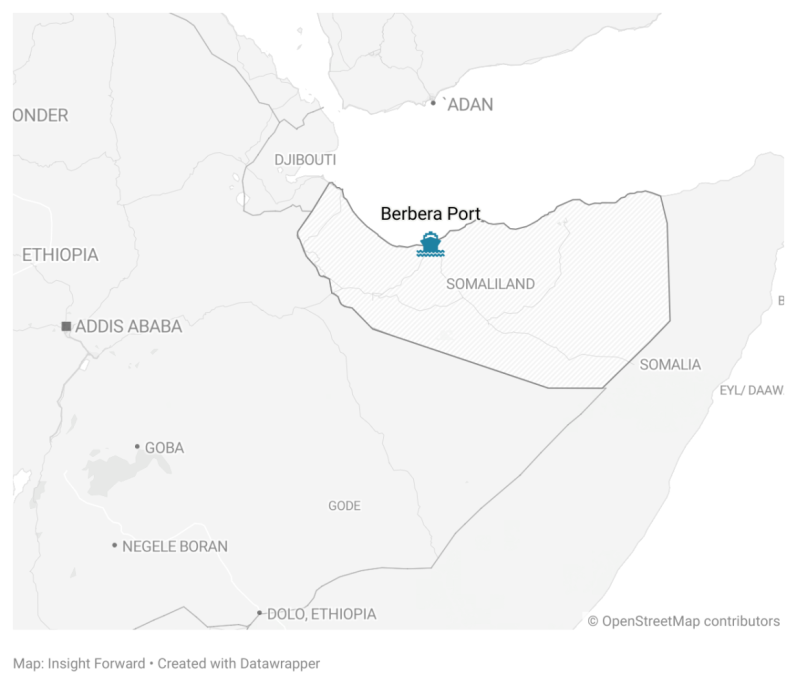
Friday Blend: 1 March 2024
Escalating Risk of Conflict in the Horn of Africa
There is an escalating risk of conflict in the Horn of Africa because of Somalia's new security agreements with the United States, Turkey, and Uganda, and the the contentious deal between Ethiopia and the breakaway region of Somaliland, which grants Ethiopia access to a key Red Sea port in exchange for recognizing Somaliland's sovereignty.
Somalia's agreements are part of its strategic efforts to bolster military capabilities amid ongoing threats from the extremist group al-Shabab and the anticipated withdrawal of African Union peacekeeping forces. The United States has committed to building five military bases, Turkey has agreed to strengthen Somalia's naval force, and Uganda has signed on to deepen military collaboration.
The agreement between Ethiopia and Somaliland has sparked fears of a potential conflict between Somalia and Ethiopia, as it challenges Somalia's territorial claims and incites strong opposition from Somali President Hassan Sheikh Mohamud. For Ethiopia, a landlocked country heavily reliant on Djibouti's ports for its imports and exports, securing access to the sea through the Somaliland port is seen as crucial for its economic survival, especially in light of its recent debt default and the substantial fees associated with using Djibouti's ports.
The U.S. is reportedly closely monitoring a military buildup between North and South Korea along their Yellow Sea maritime border. Specifically, North Korean leader Kim Jong-un has directed military readiness near the disputed Yellow Sea islands of Yeonpyeong and Baengnyeong, where a deadly artillery battle occurred in 2010.
Kim also declared at the Supreme People’s Assembly that North Korea is abandoning its long-standing goal of reconciliation with South Korea and ordered the rewriting of its constitution to declare that the South is its most hostile foreign adversary. On January 11, an article on 38 North states:
The situation on the Korean Peninsula is more dangerous than it has been at any time since early June 1950. That may sound overly dramatic, but we believe that, like his grandfather in 1950, Kim Jong Un has made a strategic decision to go to war. We do not know when or how Kim plans to pull the trigger, but the danger is already far beyond the routine warnings in Washington, Seoul and Tokyo about Pyongyang’s “provocations.”
This does not mean that war is imminent, but North Korean military activity is highly likely to increase in the lead-up to South Korean elections in April and through the U.S. presidential election cycle.
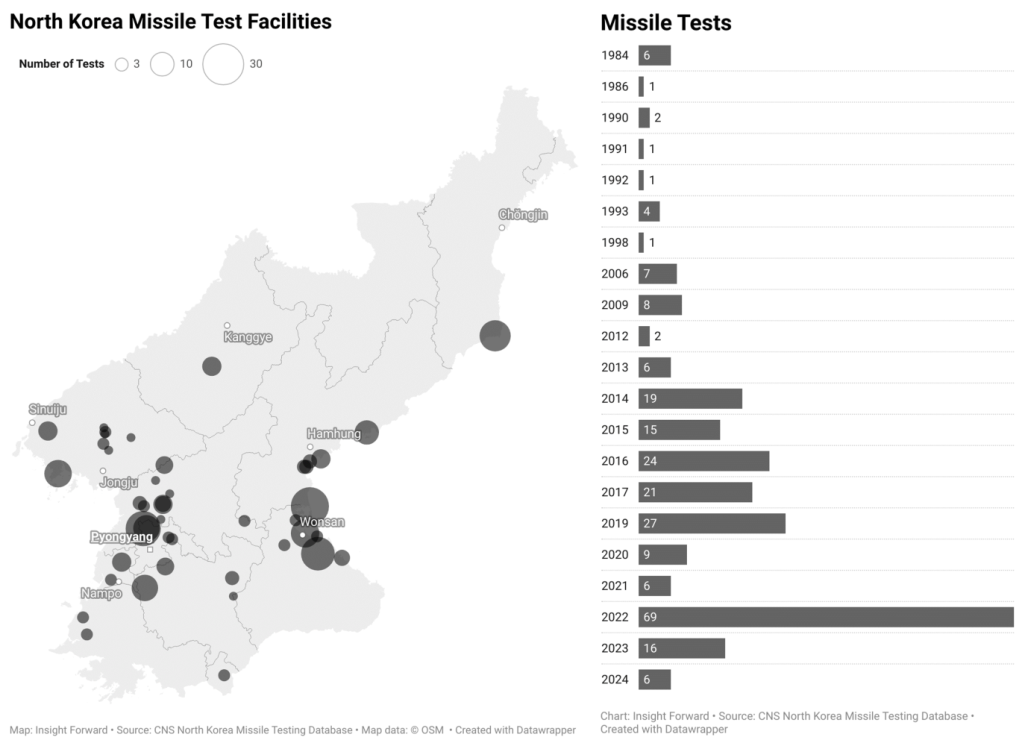
The UK Commission for Countering Terrorism recently released a study on members of the incel community providing new insight into their ideology, activity, and risk of violence.
Four of the Key Findings from the Report:
Demographics: Incels were typically in their mid-twenties, heterosexual and childless. Most of the exclusively US and UK sample were white, but 42% self-identied as a person of colour. Most considered themselves from a middle-class or lower-middle-class background, had some form of post-secondary school education, and were either living at home or renting.
Attitudes and beliefs: Participants perceived high levels of victimhood, anger and misogyny. They also acknowledged a shared worldview among incels which includes identifying feminists as a primary enemy.
Political beliefs: Many commentators have suggested a link between incels and the far right. However, using Pew Research’s “Ideological Consistency Scale”, this survey found that incels were slightly left of centre on average. The exception was those who agreed that violence against individuals that cause incels harm is often justified. These individuals were right-leaning, though not extremely.
Predicting justification of violence: Only 5% of incels felt that violence was “Often” justified against those who harm the incel community. These individuals are more likely to hold misogynistic views, feel discriminated against, have poorer mental health, and have a higher tendency to displace their aggression than other incels.
Corporations need to monitor the activities of emerging extremist groups like incels, radical environmentalists, and others, as they present potential risks.
Chinese Espionage Activity
Large data leaks and the discovery of secret police stations abroad, provide a detailed picture of China's extensive intelligence operations carried out by the Ministry of Public Security (MPS).
I-Soon Data Leak:
Targets: This leak exposed I-Soon's operations against over a dozen governments, including India, Thailand, Vietnam, South Korea, NATO members, democracy organizations in Hong Kong, universities, and individual social media accounts.
Techniques: The firm employed sophisticated hacking tools, such as custom Remote Access Trojans (RATs) for various operating systems, social media monitoring tools, smartphone infiltration capabilities, data extraction devices, and software for email access. These tools were used for real-time monitoring, data extraction, and control over targeted systems and accounts.
Chinese Hacking Documents Leak:
Targets: While less specific than the I-Soon leak, these documents indicated a broad range of surveillance operations, potentially targeting foreign governments, organizations, and individuals, along with domestic surveillance within China.
Techniques: The focus was on mass data harvesting, suggesting a less disruptive but more pervasive approach to intelligence gathering. The documents likely detailed the infrastructure and methodologies for large-scale data collection and monitoring, possibly laying the groundwork for future disruptive actions or human intelligence operations.
Secret Police Stations:
Operations: Over 100 covert overseas police stations, known as "overseas service stations" or "Overseas 110," established by China's Ministry of Public Security in various countries, have been implicated in extralegal activities. These stations are suspected of being involved in intelligence collection, monitoring expatriate activities, and suppressing dissent outside China's borders.
China's intelligence and surveillance strategy is both comprehensive and strategic, blending state-sponsored cyber activities with a physical presence in foreign territories. This approach is designed to achieve a range of political, security, and economic objectives.
The activities of China's intelligence and surveillance operations present multifaceted risks to corporations, affecting their cybersecurity, legal compliance, reputation, operations, and more. Corporations must assess these risks, especially those that operate in economic sectors that are strategically important to China or that have exposure to China or Chinese entities.
North Korean Missile Tests and Military Activity
North Korea's aggressive military maneuvers in January, marked by six missile tests, including the unveiling of its first solid-fuel intermediate-range missile, have triggered alarm. These actions coincide with heightened tensions in an election year for both the United States and South Korea.
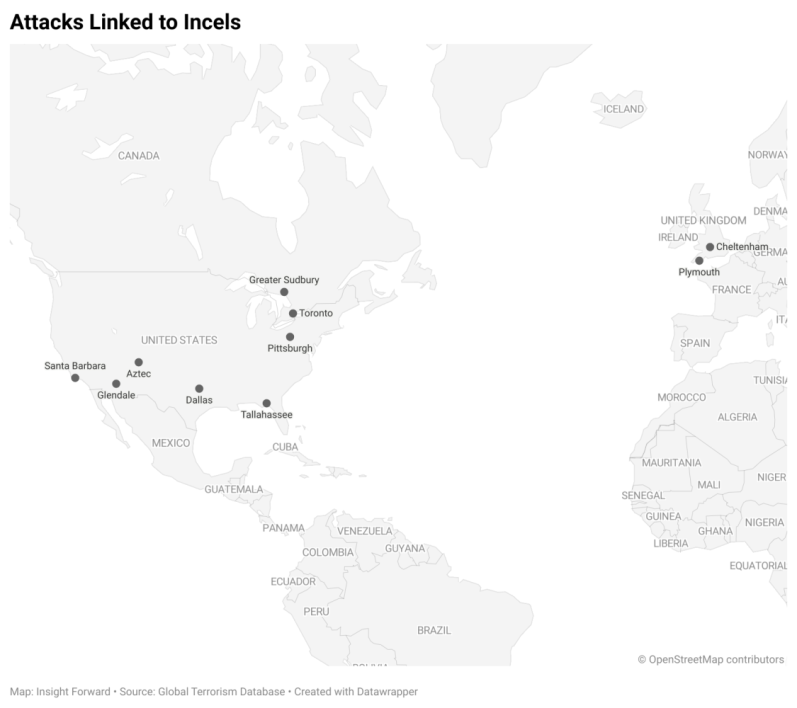
Friday Blend: 23 February 2024
New Study on Incels
Incels, short for "involuntary celibates," are a community primarily composed of men who struggle to establish romantic or sexual relationships. They operate almost entirely in online forums such as Reddit and other message boards. Central to the incel ideology is the belief that women hold significant power within contemporary Western society, a concept often referred to as taking the "red pill," a metaphor borrowed from the movie "The Matrix" (1999). This perspective suggests that men are disadvantaged by societal norms that favor women. Although there are overlaps between members of incel communities and extremist groups on the far right, they do not operate solely as part of the extreme right.
In February 2021, the director-general of the Australia Security Intelligence Organisation said:
"We are seeing a growing number of individuals and groups that don’t fit on the left–right spectrum at all; instead, they’re motivated by a fear of societal collapse or a specific social or economic grievance or conspiracy. For example, the violent misogynists who adhere to the involuntary celibate or ‘incel’ ideology fit into this category."
Incels have carried out attacks in Canada, the UK, and the US.
Trump's comments indicate that he will raise the issue of NATO defence spending and U.S. commitment to the organization if he wins a second term. Any perceived weakening of NATO would increase instability and encourage revisionist powers like Russia and China to take bolder actions.

U.S. Warns of New Russian Space Weapon
The U.S. government has issued warnings about a new Russian space weapon, which may possess nuclear capabilities. While it's unclear if the weapon is designed to carry nuclear missiles or bombs, such a deployment would contravene the Outer Space Treaty of 1967, banning nuclear weapons in space. Alternatively, the weapon is more likely to utilize nuclear power for onboard energy, a technique previously employed in space by both Russia and the U.S. The primary function of this weapon appears to be targeting satellites, which could lead to significant risks, including the creation of space debris that threatens other satellites and the International Space Station.
The satellite tracking website “Orbiting Now” lists 8,377 active satellites in orbit. Most are used for communication. The five most common are:
- Communications: 3135
- Earth Observation: 1052
- Technology Development: 383
- Navigation: 154
- Space Science: 108
Russia has dismissed the claims as fabrications, but the strategic importance of such a weapon is clear given the critical role of satellites in both military and civilian applications. The weapon might possess electronic warfare capabilities, aimed at disrupting the communications of satellites crucial for military and civilian purposes. This capability aligns with Russia's ongoing development of space-based electronic warfare systems. Russia is likely to be interested in disrupting satellite clusters such as SpaceX's Starlink system which is used extensively in Ukraine.
Trump Criticizes NATO
Former President Trump stated that he would encourage Russia to attack any NATO member that fails to meet its two percent defense spending commitments and that he would refuse to help defend any such country. According to NATO estimates from July 2023, multiple states were not meeting the commitment. NATO claims 18 members will meet the threshold this year.
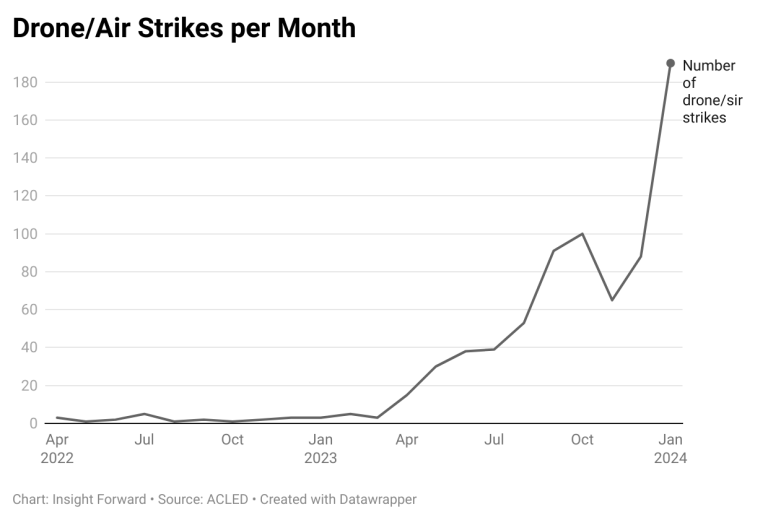
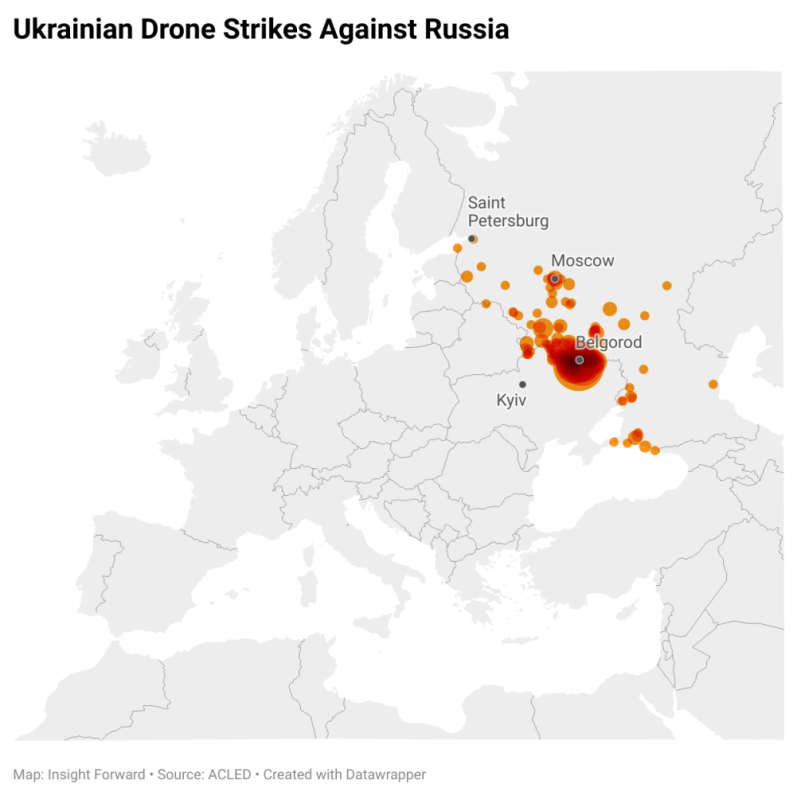
Friday Blend: 16 February 2024
Ukrainian Airstrikes on Russia
Six people were reportedly killed and at least 17 injured on 15 February in a Ukrainian missile strike on the city of Belgorod. A shopping mall, outdoor sports facility, and residential areas were hit. Ukraine has significantly increased the frequency of its drone and airstrikes on Russia likely intending to convey to the Russian populace the potential consequences of continued support for the conflict. Similar strikes are likely to be frequent ahead of Russia's elections in March.